#if you want to know my actual thoughts i’ve written at least two separate metas
Note
i cannot stop thinking about your conception of the thranto relationship in postmortem. how you portray them as obsessed with each other, completely enmeshed, fucking lost without each other and yet how they think they're doing the right thing by giving the relationship up. it's really giving me medieval chivalric romance vibes / gothic romance vibes....i would be so curious just to read your meta thoughts on the two of them and the relationship and the character work you're doing in the fic.
okay i have no idea why my brain decided that today was the day it felt capable of answering this but here we go – buckle up this is so much longer than i had planned, i am sorry :’)
first of i think saying i’ve done actual character work would be too high a praise, i mostly have a lot of notes of gibberish with too many exclamation marks haha
that being said i think the best way i can explain how i see them is by is putting them into context with the other ship i’ve written a lot of – dinluke. and bear with me here if that’s not your cup of tea but essentially what it boils down to for me is the fact that at the core of both of these ships is them being something akin to soulmates. it’s that “there is no one who could ever see me as completely as you do” feeling, just that the pace is exactly reversed.
for dinluke it’s an instant, nearly violent “oh it’s you”, an “oh there is someone i want more than this supposed destiny i should be giving my life for”. and then the struggle comes as a “i can not be with you because i have to be sth else” and “i am too damaged to hold you”. they might get together in a week, it might take them years, but it’s always clear, like even when they don’t know, it’s always clear. the forces that keep them apart are mostly external (e.g. their respective destinies and their real, not just perceived, duty to their people).
for thranto on the other hand it’s not instant, it’s a reluctant “guess it has to be you” and then it’s over a decade of gradual slow realizations, like eli going from worrying about thrawn getting them killed at the academy to smiling to himself whenever thrawn makes faro play riddle me with him.
they’re not falling in love, they're walking into love, slow and gradual, an endurance run until eventually they are so intertwined they end at “oh it’s always been you, it’s always going to be you”.
they are so comfortable with each other they don’t even realize that there is no one else that can match them like they match each other. and so their struggle only comes once they have to separate and realize that they neither know who they are without the other, nor what they actually mean to each other bc it was all always unspoken and open for interpretation. so while shit happens around them the forces that keep them apart are mostly internal (e.g. things unspoken, the way they see themselves and their purpose and their worth).
[i did ofc dig deeper into this, under the cut]
moreover, both din and luke are very clear on who they are as individuals, or at least who they think they are supposed to be – the last jedi and the rightful mand’alor. that’s the whole point, they are these larger than life characters who carry an immense burden on their shoulders they don’t know what to do with. they are both on very lone individual paths (even within the rebels or covert) and are both used to being alone and fending for themselves. their struggle is not only to accept the roles/legacy thrust upon them but also to learn that it all becomes much easier when you accept help, and that it’s okay to allow the comfort of companionship rather than to run from it in fear they could cause hurt because of who they are. they need each other to grow as individuals.
thrawn and eli are, again, that in reverse. they start out as a unit, from the second they meet they are dependent on each other, thrawn literally tells eli “you hold my words in your hands” and eli remarks multiple times how his career and life are tied to thrawn’s. they spend well over a decade together in the navy, a system well known for stomping the individuality out of you, so all their individuality comes from each other – their habits, their schedule, how they wear their uniforms, the missions they go on and the memories they share.
and it’s also interesting to note here how they have an obvious power imbalance when they meet – eli was a cadet back then, prob around eighteen or so, thrawn was at least a decade older and a fully fledged officer – but how at the same time they start out on even ground in a way thrawn didn’t with anyone, maybe not even thrass. bc even though thrawn has more experience he needs eli to navigate this new world for him, and even though eli does hold thrawn’s words in his hands he too seems to need him to thrive. they start out at the academy together and then subsequently work their way up the navy side by side.
eli essentially spends all of his adult life with thrawn, and in turn eli is the most stable relationship thrawn ever had in his life, bc yes, he had thrass and ar’alani and later samakro and thalias, but all of them were only ever at his side when time allowed, and with conditions, not 24/7 like eli is.
i think the way i put this in my notes for an unwritten part of postmortem pt3 illustrates all that well actually:
"The inhibitors, the way your bed is made, your schedule, you–" Thrawn hesitates. "You left space for me."
Eli looks away. "I wish I could say it was a conscious effort. But really it wasn't. It's just– It was fifteen years. That doesn't just go away. It's– all of these things, they're part of me." He looks up. "You're part of me."
and i’ve written a small thing for a twt prompt about thrawn having that exact realization when they’re older:
"You don't like tea."
Eli looks up and frowns, cup halfway to his lips. "I'm drinking tea right now, aren't I?"
Thrawn's eyes catch on the droplets of water sticking to Eli's skin, on his hair still damp from where he took a dip in the lake behind the ranch this morning.
"But you don't like it."
"No," Eli concedes. "But I like drinking it."
"Why?"
Eli shrugs. "Because."
"Because?"
He huffs out a small laugh. "Because it's been thirty years. I got used to it." He smirks. "You got used to the amount of pillows I sleep with, didn't you?"
"I did," Thrawn admits, begrudgingly.
"Prefere it even?"
Thrawn thinks about the way Eli looks on all those pillows in the morning, how his skin contrasts the sheets like strokes of paint. "I do."
"There you have it then," Eli smiles, looking back down at his questis.
"Does it ever bother you?" Thrawn asks when their cups are dry and Ool's midday sun starts creeping up on the ranch's patio.
"Hm?"
"That we're this intertwined."
Eli looks up. "That I couldn't go anywhere in the galaxy and not be aware of the way you've changed me?"
"Yes."
even if they wanted to go separate ways, they are irrevocably intertwined. when we finally get an outside pov of them in treason in form of ronan he describes them as “a circle of calm in the middle of the commotion” which i feel should tell you everything you need to know.
where dinluke fight against that instant feeling of being at ease with each other, thranto embrace it pretty quickly. like yeah, eli grumbles in the beginning and makes a big show of being angry that thrawn forced him to stay at his side, but eli is also a very unreliable narrator and all of that stands in juxtaposition to how fascinated he’s with thrawn from second one, and how he claims to want a simple life but is bored every second they’re not in immediate danger.
it’s a bit hard to see when you’re first reading the books bc of how much of and unreliable a narrator eli is, but once you’re done with the whole series it becomes pretty apparent how perfect they fit with each other from the get go – i have a million examples of this but some small ones would be faro pointing out how eli is the only one who actually understands thrawn’s schemes, and thrawn telling thrass years earlier about how frustrating it is that no one ever does.
like we meet eli as this entirely ordinary guy only to slowly realize oh wait he is a genius in his own right, and then get hit in the ascendancy books with how much of a missing piece he actually is for thrawn (the amount of annotations i have on those books that just say “eli would have known” or “eli would have done xyz”).
like there is a reason thrawn only ever compares eli to nightswan, someone he’s obsessed with, and that he absolutely loses his mind the second eli is gone in rebels. as i said – intertwined. dependent.
and they are not just missing pieces for each other, they are also eerily similar to each other, as we realize in the ascendancy books when we see young thrawn.
like one of my fav comparisons are these two scenes of them intimidating ppl without even raising their voices, like mind you both of them are pretty much the lowest ranking officers in these scenes, eli is an ensign reprimanding a captain:
thrawn ascendancy: chaos rising

thrawn (2017)

and i could make a whole different post for the “eli being an unreliable narrator” thing and how absolutely fascinating he is as a character, but i always keep coming back to wondering about what kind of gifted-kid bullshit happened to him as a kid, like i feel like he and thrawn dealt with a lot of the same issues of being “other” growing up but being unable to put a finger on it. i kinda explore that in postmortem, but it’s most clear in this scene from the borika interlude:
“I grew up near a lake just like this,” Eli says, his eyes fixed firmly on the stars. “I took Thrawn there, once. A long time ago. I spent so much time swimming in those waters growing up, but it never felt the same after that.” He closes his eyes, takes a deep breath that comes out remarkably steady. “I didn’t even know I never really belonged anywhere. Not until I met him.”
as i said, there is no one else who matches them like they match each other, no one else who’s been as much of a constant in their lives as each other.
which is why i think it’s so important that they do, eventually, go separate ways at the end of thrawn (2017) and learn who they are as individuals away from each other. where dinluke needs to allow themselves to be together to grow, thranto needs to allow themselves to be away from each other to do so.
especially bc for most of their time together in canon they are trapped by the fact that their roles and goals are very clear cut – commander and subordinate in service of the imperial navy – which makes it very hard for them to admit or even acknowledge their feelings for each other. like even if one of them would admit it to themselves their framework does not allow them to act upon it (which is why i think there are so many sex pollen fics around for them), so you get deep devotion with everything being left unsaid.
that’s where the chivalry aspect comes in i think – they show their love for each other through upholding their duty, that is the most overt form of affection they can show. which is also why “good day lieutenant vanto” hurts so much bc eli defecting is his ultimate show of affection, it’s his ultimate “i pledge to uphold my duty to you, not the empire”. it’s basically a declaration of love, and so ofc is thrawn sending him away to protect him. but still, unsaid, unsure. conflict.
[as a side note it’s also very interesting how din and luke both rebel against and have to come to accept their destiny and become comfortable with it, while thrawn and eli are both very comfortable with and set in their convictions, and have to be knocked down forcefully (purrgil, send to an alien military and into an impending civil war) to re-evaluate them.]
and ofc they find back to each other eventually, bc they are quite literally meant for each other, but it has to be bc they want to be at each other's side, not bc they are forced to or dependent on each other (especially bc thrawn did very much take eli’s choice away in the beginning, so it’s important that eli takes that step himself, love the way @amukmuk handles this for example, always with explicit consent and clear boundaries).
i am sure i’m forgetting crucial parts so if you want me to elaborate on anything lmk but yeah, those are my two cents i’d say, hope that answers that question?
#thranto#thranto meta#is that even a tag#sorry for rambling on this much that was uhhh#like a lot#and sorry for taking so long to answer i am terrible at this unfortunately#but this was a very fun exercise#also i hope this is what you were asking?#like 99% of how i write them is just vibes tbh#it's all about the longing#thrawn#eli vanto#soph answers asks
83 notes
·
View notes
Text
come be a season 12 truther with me; or what if dean and cas got together offscreen
Originally, I wrote this post to celebrate “Galaxy Brain” airing as Berens & Glynn gave us “The Future.” It’s been a while since that episode aired, and some things have changed about this meta. As such, there are multiple versions of this post floating around, so make sure to go back to the source for the most up to date version.
For all intents and purposes, this post functions as a meta manifesto not unlike shipping manifestos from days of LJ past. In keeping with that tradition, this post is a close reading of Dabb Era Destiel in which I argue that by using narrative gaps, queer coding, and romance tropes, Dean and Cas are shown to be in an established relationship. Although beyond the scope of this post, it’s worth pointing out that keeping Destiel mostly off screen was a way for the creatives to bypass network censorship while still remaining true to the characters.
This post is divided into three sections. Section I focuses on giving an overview of why earlier seasons of Supernatural aren’t as compelling as season 12 as a turning point for Dean and Cas’s relationship. That said, special consideration is given to 09.06 “Heaven Can’t Wait” as a potential rest stop in our journey due to it’s significantly placed narrative gap as well as themes in the episode. However, this post isn’t going to examine season 9 trutherism in depth, though it does coexist with and allow for it. Section II analyses season 12 and proposes a timeline and justification for the shifting Destiel dynamic. Finally, Section III will offer an analysis of how Dean and Cas’s relationship has changed dramatically from previous seasons in a way that is most like the shift from a “will they or won’t they” pairing to an established one.
Before I move to Section I, I’d like to note something this post takes for granted: Dean and Cas are the main romantic subplot of Supernatural, and, in fact, their relationship is elevated to main plot for both characters in season 15. This post won’t argue about the canonicity of Dean and Cas’s feelings for each other, therefore, and so won’t spend time looking at many Destiel defining moments. I’d also like to make clear that this post also takes for granted that Destiel is being intentionally developed by the writers starting with Carver’s Era, and more so in Dabb’s.
I. Why Seasons 4 through 11 May Not be It
The tl;dr. here is that while there are many moments throughout these seasons that Dean and Cas could potentially get together, none of those moments are ideal for a bunch of reasons that can be summed up as really bad timing. I also think the narrative is actively pushing them towards a moment that works. We get plenty of stepping stones, especially once we hit seasons 8 through 11 (and 11 most of all).
Seasons 4 & 5:
I know there’s been a lot of get together fics over the years set in this time period, but I just don’t see it. Do I see them being intrigued and drawn to each other? Yes. Do I think either Cas or Dean would act on it? Nope. I’m not arguing anything re: Dean’s feelings, but with everything going at the time I find it hard to believe he’d pursue anything with his angel friend. Most importantly here, though, is that during this time Cas was still very alien and other. There was too much angel in him, and while he obviously came to care about Dean (and Sam) very much, I just can’t see him navigating the realm of human relationships. That said, seeing human!Cas in “The End” is the first we see of potential developments for how Cas could behave without his angelness interfering. Being human changes Cas a lot, beyond even his experience existing among humans, though that of course matters too. This development will be important later /wink.
Seasons 6 & 7:
Before anything else let me just recognize that if we could see some sexual tension in seasons 4 & 5, these two seasons come with our first taste of romantic tension. The pining! Also note the difference between season 4 Cas and season 6 Cas in terms of behaviour. He is much less the angel we saw in that barn in “Lazarus Rising.” In season 6, we have a Cas making misguided decisions guided entirely by his emotions – namely, not wanting to involve Dean with the war in heaven – which is peak human, honestly. Put a pin on how sad Dean is in both seasons with Cas’s absence. Finally, put a pin on this being our first moment of Cas doing things on his own to spare Dean and it not ending well (soulless!Sam, Cas “dying” after Leviathan) because this is *the* hurdle in their relationship (along with Dean’s lashing out and self-worth issues). With all this said, the marked distance between Dean and Cas in these seasons negates the possibility of them entering into any kind of relationship. Much like seasons 4 and 5, there’s too much going on.
Season 8:
Ah, yes, the summer of purgatory. If you thought we had pining before…! I think we’re all very clear on season 8 being a turning point for the show, not only because new showrunner, but we also get the bunker. TFW now has an HQ, which pretty soon becomes home. Yes, Baby will always be home, but the bunker becomes the *unmovable* safe haven that Baby couldn’t be. The bunker is a place to coalesce, and for all the amazing things Baby is, she is not that. The acquisition of the bunker marks a shift in the psychology of the show: with the stable home space we can start to imagine domesticity, a place to come home to, the stuff of ordinary living. Most of all, the bunker is emblematic of security, of safety –keep this in mind, as we go forward.
This season also continues to see Cas go down the path of independently solving his problems instead of asking for help from Sam and Dean (his family in a way heaven never was) – note that the better together issue is at play in different ways with Sam and Dean also, but I digress. I also want to point out disastrous instance #2 of Cas’s insistence on figuring it out on his own: he loses his grace, and the angels fall. As for Dean, season 8’s focus for him has much to do with Sam, and them coming face to face with their issues with codependency, which hit catastrophic levels with the gates of hell and Gadreel plots.
So despite all the deliciously angsty get together purgatory fics and spec, there’s too much distance between Dean and Cas on Cas’s part due to his guilt over betraying the Winchesters in s6 plus slaughtering angels plus unleashing Leviathan. We do see Dean being more emotionally open with Cas and continue to voicing his wish that Cas would just stay with him and Sam, and let them help. It’s clear as day how much Dean cares. The timing is still bad, though.
Before moving on to next season, let’s take a moment to appreciate that this is the season Dean admits being kinda done with one night stands because “always with the adios.” Remember the bunker as a sign of stability? Yeah. I wouldn’t say Dean is craving a relationship, exactly, but I think we can see that he does want something more (ahem also I’m nodding to Cas refusing to stay put just cause).
Seasons 9 & 10:
The most important thing to happen between this two seasons is Cas’s stint as a human for an extended period of time. There’s been plenty of spec and meta written over the years about the effects of being human on Cas’s grace (a proto-soul now maybe?). What we can say for sure, regardless, is that Cas is much more humanized once he becomes an angel again. The understanding he gets from being human doesn’t go away once he regains his angel powers. You’ll notice that while we still see some of season 4’s characterization, Cas is not the same as he was – he is alien to angels now and is more intelligible to humans. Additionally, in an interesting reversal from previous seasons, we now get to see the depth of Cas’s feelings for Dean (thanks, Metatron) as well as seeing him be more open emotionally, while Dean does most of the pushing away (first because of Gadreel, then because of the Mark of Cain). In short, the timing is still bad as Dean and Cas are largely kept apart both physically and emotionally.
9.06 Heaven Can’t Wait
This episode is my white whale, friends. While I’ve come to fully subscribe to the idea that something did happen between Dean and Cas during the fanfic gap, I don’t actually think it’s feasible that it marked the start of a relationship -- be it sexual or romantic. My reasoning here is quite simple: the timing is bad. Were it not for external events (Cas regaining his Grace and Dean taking on the MoC), the course would have likely differed. Furthermore, Dean’s guilt over making Cas leave the bunker as well as Cas’s own hurt and self-loathing pose a significant and as yet insurmountable obstacle, which is easily seen with how Dean and Cas’s character trajectories go separate ways.
YMMV on what exactly happened between them in that Motel, but something definitely did. Perhaps one day I’ll have a proper s9 trutherism post to link to here for more details (likely won’t be written by me, though).
10.16 Paint It Black
From the point Dean gets the MoC until the end of season 10, anything between him and Cas is quite impossible due to distancing, to say the least. Again, yes, the fic is really good, but alas. One of the reasons I’m bringing up this episode in particular is because of the confession scene. One, it’s a rare bit of explicit emotional honesty from Dean, and two, it tells me that while he and Cas may be well aware of the Thing™ between them, it’s still uncharted waters. It’s scary, and murky, and they’re unsure how to navigated it or if they should even try. Makes sense, too, there’s been A LOT going on since s6. Anyway, he’s the full confession:
You know, the life I live, the work I do…I pretty much just figured that that was all there was to me, you know? Tear around and jam the key in the ignition and haul ass until I ran out of gas. I guess I just thought sooner or later, I’d go out the same way that I live – pedal to the metal, and that would be it. […] Now, um… recent events, uh… make me think I might be closer to that than I really thought. And…I don’t know. I mean, you know, there’s – there’s things, there’s…people, feelings that I-I-I want to experience differently than I have before, or maybe even for the first time. […] Yeah, I’m just starting to think that… maybe there’s more to it all than I thought.
Can I just say, first, that this confession keeps me up at night because we never actually see anything done with it explicitly? I mean, obviously, I think we do in fact see the effects of this confession in the show, otherwise I wouldn’t be writing this behemoth, but still, like. Damn. Ok, so, remember when I brought up that thing in season 7 about Dean being kinda done with hook-ups? Here’s where that led us. We’re seeing a Dean here who wants more than what he has convinced himself he gets to have. He wants more than dying bloody. And when he talks about wanting to experience people and feelings differently, well, that says a lot not just on the queer coding front or the romantic front. I mean, jfc, Dean is accepting the idea that he can have more in life than just hunt until he drops, and he’s specifically talking about experiences at the interpersonal level.
Do you ever see a character having an epiphany and find yourself wanting to cry because this is it right here. Dean is just blatantly admitting he wants more and maybe he can make himself be open to that (!!!), which all culminates in season 11, so…
Season 11:
The pining is still here, but it’s worse now since it’s the whole plot? It’s been *checks calendar* 5 years of this. How are any of us still kicking I don’t know. Your slow burns could never. Cool worth noting points: Cas says yes to Lucifer (bad decision #2.5, lots of mitigating effects_I don’t actually hold it against him that much but Dean is another story & not entirely rational at this point); for the first time since the early days, Dean and Cas are on equal grounds: they’ve both fucked up a lot and have hurt each other. The issues this season are outside their dynamic. Amara and Lucifer here serve as externalizing forces for Dean and Cas’s problems: Cas checks out with Lucifer because he thinks it’s the only way he can help, Dean is caught up in the turmoil of Amara, the emblem of absence and avoidance of struggle. We do get something like an affirmation from the two of them to each other via Dean calling Cas his brother (and I want y’all to consider the historical queering of that statement, and Cas’s “I could go with you.” It feels like we’re headed to them being on the same page. By the end of the season, though, it feels like we’re getting a clean slate: Mary is back, nobody died, no end-of-the-world in sight, no interpersonal crisis. We’re also getting a new showrunner, so. No wonder. We’re gearing up for something, but I’m getting ahead of myself. What this season does that is super important is that it sets up the stage for the possibility of an actual relationship between Dean and Cas, something that has, up until this point, been pretty much impossible.
11.04 Baby
Y’all know what I’m about to quote here, right? That conversation between Dean and Sam about having something with someone who understands the life. Here we still have Dean reverting to the idea that it’s impossible, which is a direct contrast to the openness in 10.16. It’s understandable, though, considering there’s been little reason to think anything like that would be possible (see all the mess and poor timing from seasons past). The quote in question, though, marks a continuing development regarding the issues Dean is struggling with this season:
DEAN: Piper? That’s awesome. Heather. One-night wonders, man. Shoot, we’re lucky we still get that at all.
SAM: Really? You don’t … Ever want something more?
DEAN: I’m sorry, have you met us? We’re batting a whopping zero in domestic life, man. Goose eggs.
SAM: You don’t ever think about something? Not marriage or whatever. But … Something? You know, with a hunter? Somebody who understands the life?
We wouldn’t be talking about this stuff all these years after Sam and Dean had a serious relationship if it wasn’t important, right? Also who else do we meet this season? That’s right! Eileen! And doesn’t that hit different with season 15 hindsight? And who does Dean have that understands the life? Whose stories have been intricately connected to his? Right now, this is all conjecture. A pipe dream Sam is revisiting, and Dean is skeptical about. Except, well. Look at what we get in “Into the Mystic” and “The Chitters.”
11.11 Into The Mystic
I’m bringing up this episode as a cross reference to “Paint It Black” as well as to complement the talk from “Baby,” and to show, again, that, for all the closeness between Dean and Cas, there’s still a marked distance they haven’t yet bridged. There’s still truths they haven’t told each other. Thanks Mildred for the delicious exposition:
Darlin’…If there’s one thing I’ve learned in all my years on the road, it’s when somebody’s pining for somebody else. […] Oh, don’t try and hide it now. Follow your heart. Remember?
11.19 The Chitters
And here we see some validation to Sam’s imagining of a possible future with someone else. We actually see hunters who not only are married, but they both make it out alive. Jesse and Cesar get their happy ending. They make the dream come true. And the reality of it important not just for Dean to see, but Sam too.
Dean: [with realization] Oh, so … [points back and forth to Jesse and Cesar]
Cesar: Yeah.
Dean: Okay, that’s…
Cesar puts his beer bottle on the table and looks at Dean, while Jesse is being silent.
Dean: What’s it like, settling down with a hunter?
Cesar: Smelly, dirty. [turns to Jesse] Twice the worrying about getting ganked.
I’d like to point out, too, that the fear of getting ganked is thematic when it comes to the tension between Dean and Cas. More on this when we hit s13.
Alright, now, having said that, let’s take a look at season 12. Bear in mind, this is the official start of Dabb’s era, even if he kinda began taking over in season 11, and the change in vibes is obvious. In fact, 12 jumped out at me as a turning point, in hindsight, after getting smacked by the domesticity of seasons 13 and 14.
II. Why Season 12
[Out of date section. Update coming soon when spoons. After significant debate, I’ve altered the definitive start of Dean and Cas’s friend-with-benefits-with-mutual-pining relationship to between 12.02 and 12.03. I briefly explained why here, and yes it’s a shitpost--still true tho.]
Finally, the promise land, y’all. Getting right to it: what s11 was for Dean in terms of setting up the relationship stage, s12 was for Cas. In its initial beats, any way. That is, until the Kelly debacle, this was the longest Cas has been around the bunker and with the exception of seasons 13 and 14, it’s one of the first times we get to see how Cas might actually fit into the bunker-as-home. Things seem remarkably chill. Of course, we’ll notice that there’s still a lot of baggage hanging around because despite Dean and Cas being in a more stable place, they haven’t actually dealt with their interpersonal problems. I didn’t single out directly this episode, but do keep in mind Cas’s declaration in 12.09 First Blood as far as how much the Winchesters matter to Cas & how we also see Dean and Cas be particularly singled out with them seating together in the backseat of the Impala. What we also see this season is Cas trying to prove he is worthy of this family, his family. He’s not fighting for heaven or to right some grievous wrong (a la s8). No, this season he’s fighting to spare the Winchester, to bring them a win. To bring Dean a win. The major disconnect is that Dean (and Sam & Mary) already sees Cas that way, he doesn’t think Cas has anything to prove. And just maybe, Cas starts believing that too – or, at least, believing it enough.
12.10 Lily Sunders Has Some Regrets
This episode, oh my god, the goodness. In the wake of 12.09 we have Dean and Cas in a tiff because Cas mistake #3 (killing Billie and “cosmic consequences”), this is a pattern. Twice the worry of getting ganked, etc etc. But where this episode really shines is through the contrast between Ishim’s obsession with Lily and Cas & Dean’s mutual affection for each other. Ishim sees no difference here and, to him, Cas’s feelings for Dean are a human weakness. Returning to my point about human!Cas, this episode underscores that Cas’s increasing humanity is what puts him in the place where he can want what Dean wants instead of either being too alien to get it (see s4 & 5) or unable to experience it properly (Ishim).
12.12 Stuck in the Middle (With You)
Cas’s trajectory culminates here with the whole I love you (@ Dean), I love all of you (@ Winchesters). Let’s note too that Cas is dying here, in a way that is much more human than going up in light. This declaration of different types of love is entirely human. It’s also a definitive step wrt to Cas and Dean’s relationship because of what happens in 12.19. This. is. it. Oh, and, of course, let’s not forget to point to Dean’s face when Cas says that “I love you,” and how terrified he is that Cas is dying. Might make one rethink some things, hm?
12.19 The Future
This episode is simply hella suspicious, and all the kudos to Berens and Glynn for writing it. It’ll haunt me forever. Consider watching it again and just questioning everything. So. Weird things:
1. Dean’s reaction to Cas no getting in touch as opposed to Sam’s. Dean is pissed, which is Dean-speak for worried out of his mind. Sam is very worried, too, and puzzled, but he’s mostly expressing his relief that Cas is back. But Cas has gone awol before, but this time Dean is much more worked up about it; Sam takes note of this, too. Now, let’s imagine that maybe the events of 12.12 led to something happening between Dean and Cas. Then Cas decided to leave to find a lead on Kelly, but eventually Cas decides to work with Heaven and goes radio silent. For days. Having taken a chance, and something having happened between them, how would Dean react to Cas just going poof and not contacting him – despite Dean having called Cas multiple times.
2. Cas knows about the Colt. Ok, nothing off there. But when he goes to Dean’s room to talk, right after Dean leaves we see Cas looking around briefly. Like he know Dean would keep it in there. Maybe Cas had looked other places already. Who knows. What we do know is that eventually he does find the Colt not only in Dean’s room, but under Dean’s pillow. Sam didn’t even know the Colt wasn’t in the safe. So how did Cas know?
3.“He came into my room and he played me.” So, this quote right there, makes it seem like some seduction for personal gain, right? But can you see Cas actually doing that if they hadn’t gone there previously? For Dean not to suspect anything and go with it? There’s plenty of plausible deniability here, but the gaps in time in the narrative make me question what is there in those spaces. The scene where Cas tried to give Dean the mixtape back doesn’t read like “playing,” so it’s about a different interaction. Hm. Hmmm.
4. Dean and Cas’s brief conversation in Dean’s room is clearly Dean just wanting Cas to stay, so they can work (and be) together – because they’re better that way. Which, yeah, truth, but also ow.
5.And most importantly: When did Dean give Cas that mixtape??? How did that happen?
Sequence of events: Cas tells Dean he loves him – Dean is clearly shook by it – Dean gives Cas a mixtape (romantic gesture, often a declaration of feelings; in true Dean speak too lolsobs) – Cas goes awol - Dean acts like he got ghosted by his new bf -?????- Cas somehow knows the Colt is under Dean’s pillow – "He went into my room and he played me."
What am I supposed to do with that, hm? Like. Y’all realize they probably had some emotionally constipated getting together moment, right? Something that Dean clearly initially thought meant things were gonna change, now. Something that Cas couldn’t allow to happen until he could give Dean a win. Y’all are seeing this, yeah? I’m not saying they slept together and were full of feelings, except that’s kind of what I’m saying. But YMMV, there are other possibilities beyond sex. The full of feelings isn’t up for debate, though, even if the whole thing is informed by ridiculous amounts of miscommunication.
III. Seasons 13 through 15 As Established Relationship
Regardless of what happened in season 12, exactly, I can’t shake the feeling that something did happen, and something did change. My reasoning here is actually really simple: in comparison to previous seasons, Dean and Cas’s dynamic shifts significantly come season 13. I know some folks have been disappointed with some of season 13 and then season 14 for having dialed back on the destiel side of things. And, hey, maybe there’s truth to that in terms of backstage stuff, but I also want to point out that...well, the dialing back isn’t quite dialing back is it? Let’s look at 13 a little more closely:
Season 13:
So I said the deancas dynamic changed, right? I also think that change caught us unaware because the pivotal turning point that would cue us in never happened on screen as well as being subsumed by Cas’s death and Jack’s birth. But if I ask you about deancas in season 13 what would come to mind? Grief arc? Brokebacknatural? How domestic Dean and Cas are? There’s just something easy about their relationship after Cas returns from the Empty. The tension we’d grown so familiar with over the years is gone. Actually, it feels like we skipped the getting together bit of their relationship and went straight to established relationship and parenting. Some of the most peak married deancas moments we see circulating? Season 13, (and 12.10). It’s a lot, and it’s different, and it’s amazing.
13.01-13.05
Dean’s grief mini-arc. He was acting like a widower. Here’s me vaguely gesturing towards the mapping of Jonh, Mary, Dean, and Sam onto Dean, Cas, Sam, and Jack. And the reunion? I can’t help but be giddy at the song choice: “it’s never too late to start all over again.” To. Start. All. Over. Again. I’m just saying.
13.06 Tombstone & 13.16 Scoobynatural
I’m not going at length about these episodes, I just want to point out that they reveal that Dean and Cas have a whole thing going on off screen: they watch movies together, Cas knows about Dean being an angry sleeper, Cas seems to have been aware of the Dean-cave before Sam was. It’s little things like this that are examples of the narrative gaps surrounding Dean and Cas that have cropped up over the years. I don’t think it’s unreasonable to wonder what else could be hiding there. And when did the movie nights alluded in “Tombstone” happen? Maybe in season 12 when Cas in hanging around the bunker? The same period when Dean and Cas seem to be coalescing into something safer and more stable? Something that we never see come to a head because plot happens and Cas dies? Something that is immediately taken back up once Cas is alive again?
Season 14:
Overall, this season is more of what we got during 13, but it had two high notes I wanted to single out before ending this already too long post.
14.15 Peace of Mind
Look me in the eye and tell me Dean and Cas talking in the kitchen about Jack doesn’t read like husbands talking about their child. Look me in the eye and tell me Cas just texting Dean to gossip about Sam isn’t couple-y as hell.
14.18-14.20
Ah, yes, the divorce arc. Awful. Terrible. The culmination of Dean’s problem in all this: he lashes out, he pushes Cas away, his anger is alienating. Cue all of us suffering. But while Dean is clearly in the wrong in how the deals with his feelings, let’s not pretend some of his anger doesn’t come from a long established, and unaddressed, rift between him and Cas, which had its last traumatic turn when Cas died in s12. Dean isn’t being rational here: he saw Cas doing something on his own, and he saw that his mother is dead. What else could happen? Why won’t Cas just trust they can work as a team? What if Cas died again? And why should Cas put up with Dean’s behavior without knowing the cause? How can any relationship work this way? But notice how caught in the middle Sam was during all this. Notice how Jack is running off and acting out. The whole family is falling apart. Divorce arc, indeed.
Season 15:
But what about what we’re building up in 15? That seems like it could be a getting together plot, too, right? Well, yeah. It could very well be. But I’d argue the tension we’re seeing isn’t a will-they-or-won’t-they because they already have. We’re are watching a getting back together plot! The tension is, instead, will-they-or -won’t-they use their words to talk about the baggage that has kept them from truly being confident about their relationship. That’s the crucial step in their togetherness that they’re still missing, which is also the bedrock of the divorce arc that spanned twelve fucking episodes -- y’all, that’s half a season.
And technically? We’re not even done with yet because Cas never let Dean finish his prayer/confession in purgatory. What’s more, Cas hasn’t grappled with his role in the breakdown of their relationship, either: that he keeps going off on his own and getting hurt (and getting other people hurt), and Dean has to deal with the fallout. The deep emotional understanding, the truly being on the same page is what we’re on the edge of our seats for. We’re waiting to see what else Dean had to say, and what will happen when Cas’s deal with the Empty comes to light.
Finally, could we still have this plot without Dean and Cas having gotten together off screen? Sure, but I think the stakes are higher if they already did have something between them. If they actually have an established romantic relationship going on. Something real and tangible and as of yet much too fragile.
"...you asked what about all this is real. We are."
#destiel#deancas#supernatural#spn#spn meta#this thing is gargantuan yikes#anyway enjoy? let's chat#my writing#this thing is half meta half my adhd unleashed
431 notes
·
View notes
Text
Why calling it "logic versus emotion" makes sense
At the end of chapter 2 in Your Turn To Die, the player is forced to choose between killing Sou or Kanna. Kanna frames this as a choice between "logic" and "emotion," where saving Sou is the "logical" choice and saving Kanna is the "emotional" choice.
Personally, I love the writing in this part. I think it's the strongest writing in the whole game. However, since joining the YTTD fandom, I've read various posts from fans who don't like calling this a simple choice between "logic" and "emotion." For them, it felt like an emotional choice to save Sou, while it was a logical choice to save Kanna. After seeing this argument so many times, I decided to unpack my feelings on it. I also wanted to write my own defense of why calling this a choice between "logic" and "emotion" makes sense, at least to me. For me, it all comes down to how it’s written as a choice between two opposing worldviews, and I don’t focus on the little technicalities. I’ll also argue that the game is using descriptive language, rather than prescriptive language.
But first, we have to deal with a strange irony about this choice:
For the genre-savvy player, yes, it IS "logical" to save Kanna and "emotional" to save Sou.
Before writing anything about this choice, I need to acknowledge that Sara and the Player are two different people. They're obviously connected, and they inform each other's feelings and choices, but they still exist in different worlds. Sara is actually trapped in a Death Game. The Player is vicariously experiencing what it would be like to be trapped in a Death Game through a fictional story.
I'm not going to argue that Sara necessarily likes Kanna more than she likes Sou, and thus it is more "emotional" for her to save Kanna. It's possible to play Sara as someone who isn't that affectionate of Kanna, and she can act generously towards Sou. That's not the main issue here.
The issue is that the Player expects the fictional story to go in certain directions based on the morality of their choices, while Sara has no such meta expectations. The Player can reasonably expect to be rewarded with a happy ending at the end of YTTD if they make the "correct" moral choices. Saving Kanna feels like the "morally correct" choice on a gut level because she's a child, while Sou is an adult. So the Player may choose to save Kanna purely for logical reasons. They're not trying to be selfless or wise; they just want a reward from a videogame. And...they're not wrong! Immediately after saving Kanna, the player is rewarded with a cathartic scene with Joe, cluing us in to the idea that choosing Kanna is the "good path."
Meanwhile, if the Player saves Sou, they're saving him in spite of knowing that this could logically lead to a "dark path." You might save Sou because he's a fascinating character, or because you're curious what will happen, or simply because you think he's cute. These are all emotional reasons. Maybe you don't expect any "happy" rewards if you save Sou, but you still expect the story to be exciting with him around.
Speaking for myself, I want to see both the Kanna and Sou routes for reasons that are both emotional and logical. I sympathize with both characters, and I want to analyze them as they continue their arcs. I just think they're great characters connected to fascinating themes about humanity.
In other words, the Player is going to have all sorts of feelings about this choice based on the safety of their separation from the Death Game. It's only a videogame to us. We're not actually killing a child or a young man. We still feel sad about the story, but it's a safe sadness, one we can control. You can make your choice based on which type of tragedy is more interesting to you in the moment.
So that's how the Player experiences the choice, but what about Sara? Does it still make sense to call it a decision between "logic" and "emotion" for her? I would argue, "yes." First of all...
"Logic" and "emotion" are descriptive terms for the argument styles of Kanna and Sou, respectively.
Using "descriptive" terminology means that we attempt to classify language as it is actually being used. Using "prescriptive" terminology means that we dictate how we should be using language.
When Kanna calls this a choice between logic and emotion, you might have thought she was being prescriptive. You might have thought something like, "You can't tell me how I should feel about this." But I think Kanna was simply being descriptive of the language she and Sou were using. It's a fair assessment of their opposing argument styles.
Kanna argues that you should vote for her by appealing to your sense of logic. She eloquently makes the case that Sou has proven himself invaluable to the team with his computer hacking skills. He came extremely close to finding an escape route just before the second Main Game began. With more time, he could find another one. If he dies, there is no one else in their party with his valuable skill set. She also effectively weaponizes her own helplessness by arguing that she is a "useless" child. She states that dying for the greater good "is the only thing she can do." What I love about Kanna's argument is how she twists Sou's own words against him, since Sou has been using coldhearted logical arguments since the beginning. She shows how much she's learned from him, and she's even able to outsmart him.
Sou argues that you should vote for him by appealing to your emotions. He furiously makes the case that he is the most hated member of the team and that you should give into your hatred of him. He says that the choice ought to be obvious based on your feelings. He calls Kanna stupid. He keeps shouting "Stop!" and "No!" He waves his arms in despair. He resorts to threats and exclaims that he will never forgive anyone who votes for Kanna. Sou's argument is compelling because we have never seen him so vulnerable before. Even with his strong will to live, he has an even more desperate will to save the little girl he's grown to care for. It's devastating to watch such a man break down. After losing his previous eloquence, he is forced to bare his soul and pray that that is enough.
However, even with all that in mind, you could still argue on a technicality that some of Kanna's statements are emotional while some of Sou's statements are logical. For example, when Kanna says that she is useless, this reflects her emotional state since she has low self-esteem. And when Sou starts threatening people, it's logical to take his threats seriously.
But there's something deeper at work here than technicalities. There's still something at the core of their arguments that makes the choice to save Sou "logical" and Kanna "emotional."
At its core, this debate is about how to measure a human life's worth. Do you measure a human life based on how "useful" they are? Or do you recognize a person's worth based on their humanity alone?
This is a choice between two worldviews, which the story calls "logical" and "emotional."
In the logical worldview, you prioritize a person's usefulness over their humanity for the greater good. Also, you must be willing to use people like tools for the greater good.
In the emotional worldview, you refuse to reject anyone's humanity, even if it threatens the greater good. Also, you must accept that some moral causes are more important than survival.
If you vote to save Sou, then Sara prioritizes the greater good; theoretically, the group can use Sou to escape. But being willing to use Sou this way rejects Sou's humanity, because we would be using his talents against his will. For Sou, escape is not worth the cost of Kanna's life. Sara also rejects her own humanity by treating both Sou and Kanna as objects instead of people. Kanna is discarded as a useless object, while Sou is kept as a potentially useful one. This is why Sara guiltily calls this "the worst possible choice" when she makes it. And it's why Sou seems to care more about revenge than survival in this route; there is no meaning in a world where we must sacrifice children.
If you vote to save Kanna, Sara does so knowing it may be harder for the group to escape without Sou's skills. But she embraces Sou's humanity by allowing him to follow his heart. She also strengthens her own humanity by refusing to cross a moral line. This is why Sou actually keeps his will to live in this route and mounts a desperate escape before his death. Because there's still meaning in a world where Kanna is allowed to live. He still dies, but with peace and purpose, and having repaid Sara for freeing his true heart.
In any case, you may still disagree with the semantics of "logic" and "emotion" to describe these worldviews, though they work for me personally. I have one more point to address.
Is it really logical to save someone who threatens you?
At this point, I'd like to talk about the most logical member of the group, the character who immediately votes to kill Kanna: Keiji Shinogi.
You, the Player, may believe that Sou will get his revenge if he lives, because it would make a compelling story. And Sara, a high-school student, may be reasonably afraid of Sou's threats, because Sou has tried to hurt her before. Even though the text doesn't portray Sara as being afraid of Sou in this moment, I understand why the Player would fear for Sara's life. In other words, a logical reason to kill Sou is because you don't believe you can control him. How do you force an adult man to behave?
Enter Keiji Shinogi, who doesn't hesitate. Keiji is stronger than Sou, and he's wicked smart. He's confident in his own abilities. And he understands vengeance better than anyone. He doesn't underestimate Sou, who has outwitted him before, but he decides to accept the risk. Like Sou, Keiji has a ruthless will. I believe that one reason Keiji voted first was because he wanted to assure everyone that "your friendly policeman" would keep Sou in line. So even though Sara doesn't act afraid of Sou in this moment, Keiji is there to calm any hypothetical fears the Player has.
And Keiji commits to this role! In the beginning of Chapter 3, in the route where Kanna dies, the first thing Sou does is disturb the group peace. He puts on his "tough" mask and pretends that he never really cared about Kanna. In response, as everyone else is fidgeting nervously, Keiji laughs and calls out Sou on his bullshit. He eviscerates Sou emotionally, effectively putting Sou in his place and forcing him to be submissive, for now. It's Keiji's way of reminding Sou that they already know how weak he is, and Sou isn't going to get away with any tricks under Keiji's watch. Even if Sou's only "trick" in this case is to pretend he has any pride left.
From a storytelling perspective, I'm sure that these two will keep playing their power games, and Sou is likely to regain the upper-hand eventually. But from an in-universe perspective, Keiji looks like he knows exactly what he's doing in this scene, and Sou looks like a fool who better do what he's told. That is, if he doesn't want Keiji to skewer his heart in front of everyone again.
So where am I going with this?
My most generous interpretation of Keiji's vote is that he decided that Sou's life had value inasmuch as he could use Sou. After all, it's not like Keiji spared Sou out of compassion. Keiji just said that he hated Sou more than anyone he's ever known--and Keiji already killed someone else he hated. The harsher interpretation of Keiji's vote is that he fully expects Sou to die later due to his zero percent survival rate, which would make Kanna's presence technically more of a "threat" to Keiji's own survival. However, I prefer to think that Keiji was swayed by Kanna's brilliant defense of Sou's usefulness. That's because Keiji isn't a simple monster; he's a complex man who still wants to "serve and protect" the group...in his own way.
To follow in Keiji's footsteps and vote with "logic" means that Sara decides to trust Keiji's judgment. We know that Keiji is one of the smartest and strongest characters, in addition to being Sara's reliable ally. This is why I think it's still "logical" for Sara to save Sou in spite of his threats. Because Keiji is still there.
Conclusion
That's why framing the choice as one between "logic" and "emotion" works for me. I see it as a choice between two worldviews, one in which people are valued for their usefulness, and the other in which people are valued for their humanity.
I understand that the Player is going to have their own thoughts and feelings about this choice. Believe me, I was heartbroken too! I really wanted Sou to redeem himself and live. And I think Sara even feels the same way, since she pleads "Don't kill our ally!" when Safalin threatens Sou. It's still possible that Sou could redeem himself in the route where he lives, but I imagine it will be more important that the Player faces consequences for killing Kanna. But no matter what happens in Chapter 3, it doesn't change the fact that it looked possible in Chapter 2 for Sou's skillset to save everyone, and everyone was operating under that mindset.
I think that the writing in this game is stellar so I wanted to defend the story's framing. It surprised me to see folks who had reacted to it differently, but that's all part of the fun. It got me thinking about how interesting it is that the Player and Sara view things differently. It also got me thinking that what seems like a logical choice in the moment could feel like the wrong decision in hindsight.
Thanks for reading!
#yttd#your turn to die#sou hiyori#kanna kizuchi#sara chidouin#keiji shinogi#shin tsukimi#kimi ga shine#your turn to die spoilers#meta#mine#this is absurdly long haha sorry#sou and kanna#my meta
516 notes
·
View notes
Text
a word on color - how line of duty series 6 uses wardrobe color to frame narrative (pt 4)
Author’s note: this is the conclusion to my essay on wardrobe color and how it’s used to inform narrative in series 6 of line of duty. Previous parts can be found here: Part 1, Part 2, and Part 3. This part covers episodes 5, 6, and 7. Heads up, my analysis of episode 7 is actually quite short because of my focus on Jo, but I have many, MANY thoughts on Kate’s second to last scene and the general wardrobe choices for Kate in this episode.
Thank you to everyone who has been willing to entertain my ramblings here. While I have a background in theatrical production, this kind of meta analysis was quite new for me. I was relieved to see (most) of this theory actualized in the finale. Now, this part is nearly 8k words, all four parts together clocked in at over 20k words and nearly 40 pages, single-spaced, so I’ve officially written a third dissertation (after the other two took me 10 months…).
Regular warnings apply: I’m American and therefore may be missing certain cultural context. Spoilers abound, but I stick to Jo’s storyline for the most part, and don’t include my thoughts about the finale writ large (I may write an analysis of the series 6 storytelling separate from this, if there’s interest).
Read on below the cut.
EPISODE 5
Episode 5 opens with Lomax briefing Jo and Kate about connections between the armed robbery and Gail Vella's murder, showing them results for an industrial estate that matches the description given by one of the robbers. Jo is wearing the same outfit she ended episode 4 in, the orangish brown sweater and navy suit, while Kate is wearing a grey jacket over a white shirt, buttoned all the way up. A side note - this grey jacket does not fit in with the rest of the wardrobe Kate has been in all series, and from a meta perspective, this is because they have to conceal the firearm Kate is now carrying. Ryan watches from the other room, again in a call back to the way Jo was watching Kate in episode 3. Kate tries to talk to Jo, but she's quickly brushed off, much to Kate's chagrin.
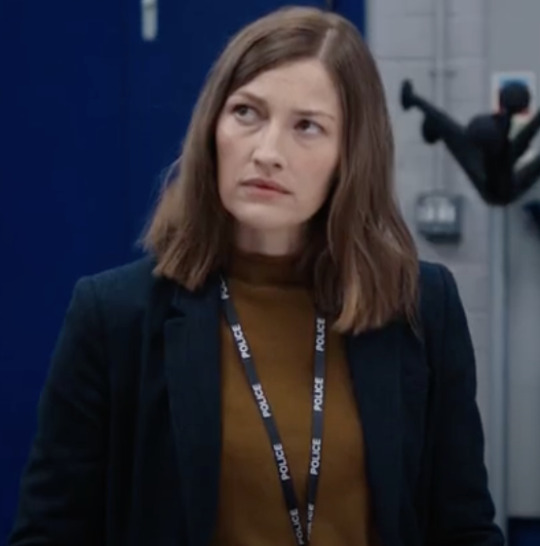
Jo’s outfit, which we’ve seen her in numerous times, again demonstrates her pull between what’s right and pressure from the OCG. After all, Ryan has just threatened her twice. She knows that the investigation is heading in the right direction, which she both wants and is afraid of, and she is panicking. At the same time, she’s wary of letting Kate get too close lest she suspect something and acts on it, putting them both in danger.
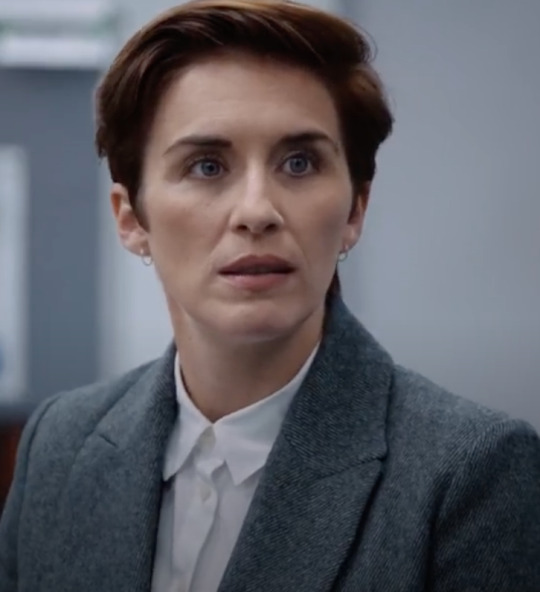
Kate’s outfit actually shows some of that forced distance Jo is causing. We’ve seen her wear a white shirt buttoned all the way to the top once before - when she spoiled the raid of MIT by AC-12. That outfit showed her pull between Jo and AC-12, and we’re seeing that here again. This time though, the grey jacket shows that she’s leaning AC-12.
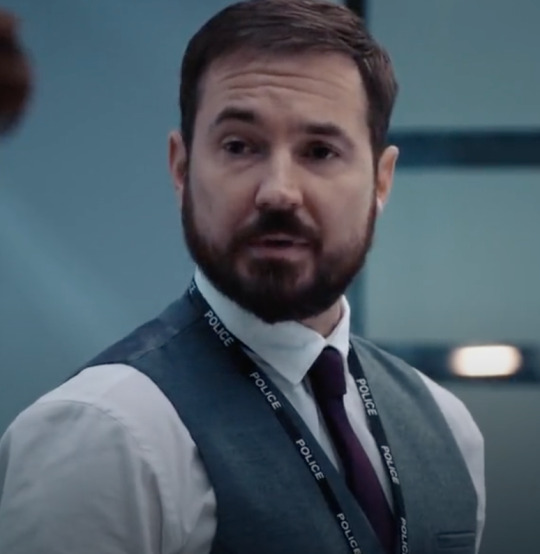
We see this in the next scene where Steve, in his grey suit with a white shirt and red tie, is directly paralleling his former partner’s wardrobe. Kate visits AC-12, and it's been revealed that she has permission to carry a concealed firearm because of the threat Ryan Pilkington poses. Now, call me crazy, but I believe we’re meant to understand he’s a threat to her at least in part because of her relationship to Jo, but I’m uncertain. When Ted asks for an update, Kate notes that Jo has become "cold and distant" toward her, and the team reveals Jo has been put under surveillance, which Kate isn't happy about. It's then revealed that Jo is related to Tommy Hunter (from series 1 and 2) through incest, which is of course horrifying, though we don’t know the full story of it quite yet.
Back at her apartment, Jo checks the laptop to find out the OCG won't let her go because of AC-12's continued investigation, which she promises to take care of. She’s surrounded by her blue flat, in her navy and orange outfit, her actions and heart still at conflict with one another. She’s distraught, and stuck.
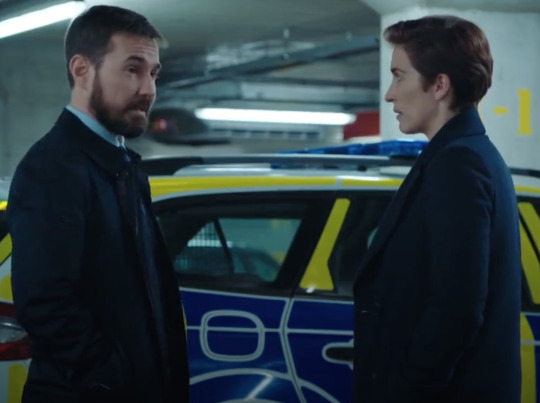
Later, Kate and Steve meet in an underground car park in their matching navy coats. Steve shares that Lakewell gave him information off the record, which is that Gail Vella had been looking into the death of Lawrence Christopher at the time of her death. He also tells Kate about his discovery that Hastings gave Steph Corbett the missing $50k of supposed bribe money (from series 5). The former partners match here because they are coming closer to being full partners again, working in tandem and trusting one another with information. They have been at odds this series, particularly when it comes to Jo, but they have remained on the same page in their disappointment in the gaffer and belief in finding justice for Gail Vella.
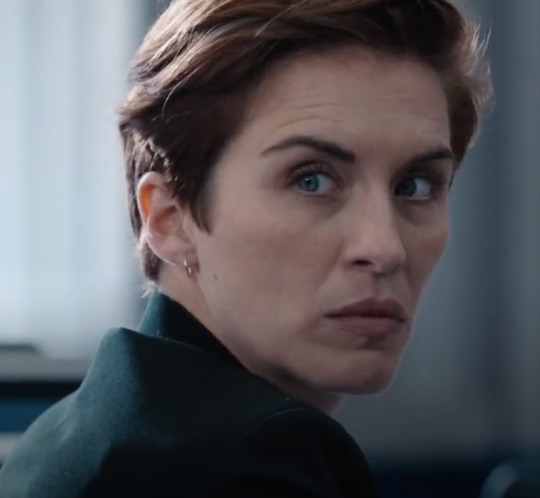
Back at MIT, Kate is looking into the industrial parks that may hold an OCG workshop. As she researches, she repeatedly looks over at Jo in her office and seems to have an idea. She then steps out of the office and calls Steve, though we don’t see the details of their conversation. Kate returns to the office and goes into Jo's office, telling her that they may have found the OCG workshop. She asks to brief the team immediately to avoid leaks, which Jo allows while glancing out at the bullpen. We can see once Kate leaves that she was looking at Ryan, who is watching her closely.
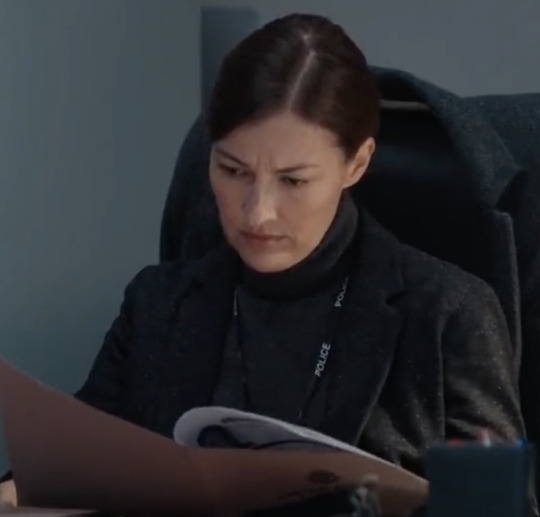
We don't know it yet, but Kate has found a way to test Jo’s loyalty and her belief that Jo isn’t bent. She tells the team about 1 location, makes them hand up their phones (which pisses them all off), and Jo makes them all stay within the MIT offices just as Ryan is about to step out. As the briefing ends, Kate goes to Jo’s office once more and demands to speak with her, despite Jo’s rude and annoyed response.
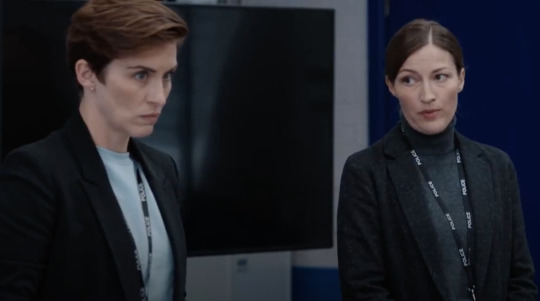
It’s later revealed that Kate then tells Jo there are 3 total locations to be looked at, but they’re starting with just one. Meanwhile, AC-12 surveillance teams are stationed at all three locations to see if people are tipped off and by who.
In these scenes, Kate is wearing a navy suit with a light blue shirt buttoned to the top, while Jo is wearing a grey suit with a grey turtleneck. For both women, the high necklines that fully encircle their throats indicates their discomfort and their desire to have a wall up for their own protection. We see Kate in all blue as she’s on a crusade to prove the truth - Jo isn’t bent, and this will reveal who is (as she suspects Ryan). Jo, meanwhile, is uncertain, and her monochrome grey outfit reflects that. Normally, this is the type of thing she would be expected to tip off to the OCG (as she did with Carl Banks), but Kate has cleverly made it so she can’t. She’s trying to push Kate away, but Kate keeps pushing herself right back in. She’s meant to be wary of Ryan, but she stopped him from an opportunity to send out a warning - and that’s before she knew there were three potential locations. All Jo knows is that she wants out from this lie and constant threat she’s lived under. She’s in all grey, not true blue but certainly not a warm tone, because she hasn’t decided what her next step is yet. Temporarily neutral.
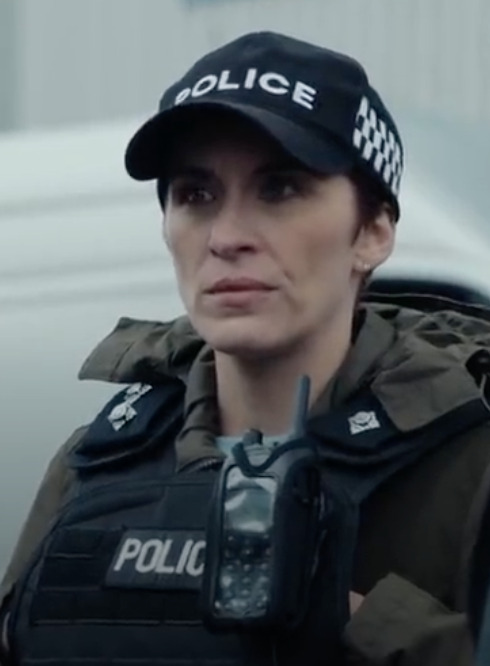
The initial raid is not a success, so Jo informs the team that they'll move on to the other locations instead, revealing that she and Kate did not give them all of the information. Lomax is pissed off, and directs that anger at Kate. From his perspective, the boss just told them she doesn’t trust him or the team and treated them all like a potential rat, and he chalks that up to the former AC-12 officer’s involvement. In an interesting parallel, Jo and Kate are wearing the same outfits under their body armor that we saw them in during the raid in the first episode - Jo in her black jacket and Kate in her green jacket.
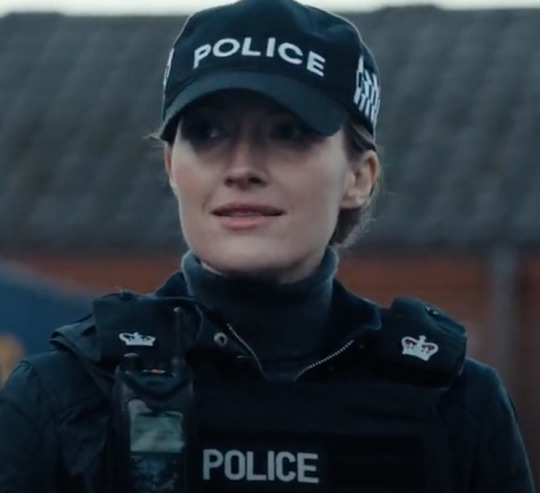
During this raid, Ryan snuck out to call in the danger to the OCG from a burner phone, an act which was recorded by Chloe “the only real detective” Bishop. Steve, at the real OCG workshop, rushes in with his team which results in the deaths of two suspects. Jo and the MIT team arrive on the scene not long after, and Jo and Steve come to disagreement over jurisdiction, and she ultimately forces him to stand down using her rank (which we’ll see her flex once more later in the episode). I have to say, I have loved watching Jo and Steve come to blows in this series in part because Jo is so much better at it than he is. Steve truly has been Jo’s foil, contradicting her at every point. We see this even in their clothes in this scene. While Jo is wearing a grey turtleneck (typically in the AC-12 color palette), it is hidden under her black jacket, and Steve is wearing a blue shirt under his body armor. On the visual face, they appear to be working at opposite ends to one another, and in this moment they are.
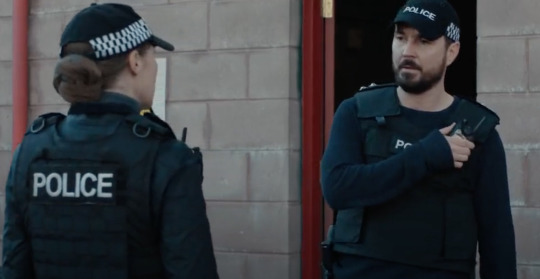
Back at AC-12, Kate debriefs the team on what happened and let's them in on the honey trap* (*not really) Kate set for Jo, which she didn't fall for (but Pilkington did). The team is taken aback, and Hastings points out how risky a move that was. "As far as I'm concerned, that's proof she's not bent," Kate replies, stubborn to the end. Steve has a different interpretation - Jo assigned herself to the raid on the location with the workshop, and took control of the crime scene from him. "That doesn't fit with what I've witnessed firsthand. I needed to know one way or another." Kate will not back down from her staunch belief that Jo is not bent, an unfortunate foreshadow to Jo’s eventual betrayal. Hastings sides with Steve, but Kate clearly still disagrees. However, Steve does believe Ryan should be removed from MIT, even as Hastings wants to keep him there. This raises their suspicions because Kate had originally talked the gaffer out of bringing Ryan in, but the reality of the matter is that Ted feels he’s on a ticking clock with his forced retirement, and wants to handle this fourth man situation before he goes.
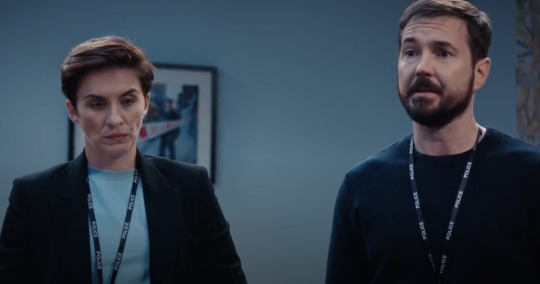
Kate and Steve are again in coordinated outfits here, dressed head to toe in blue. We’ve seen this before, the former partners in clothes that parallel one another while seemingly at odds. Sadly, this is because they’re again both right about Jo. She is using her position (and even Kate’s trust) to manipulate the investigation, but that manipulation stems from fear for her own safety as she herself is being manipulated and doesn’t want to do what she’s done. She’s like a cat stuck in a box - bent and not bent.
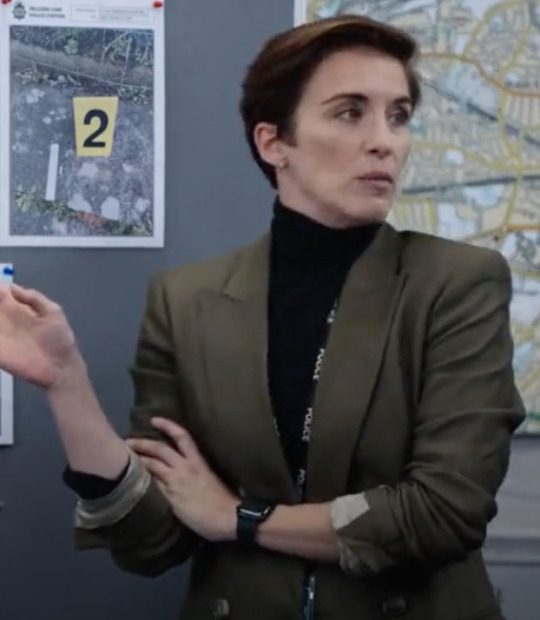
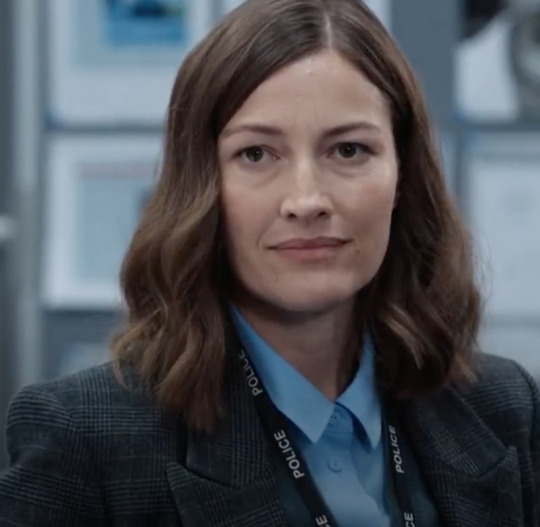
On the Hill, Kate gives the team the low down on the OCG warehouse and their next steps. Jo congratulates the team and tells them to get to work collecting forensic evidence while Pilkington sends laser eyes her way. This time it’s Kate wearing a turtleneck, this one in black under an olive suit jacket, while Jo wears a grey suit with a grey-green sweater and a blue shirt buttoned all the way to the top. Again, the high necks of these outfits demonstrate the discomfort and reservedness both women are feeling, but we also see a subtle connection with the green tints of their clothes. As usual, green represents the pull between two different compelling interests. For Kate, the pull between Jo and AC-12, for Jo the pull between Kate and the OCG.
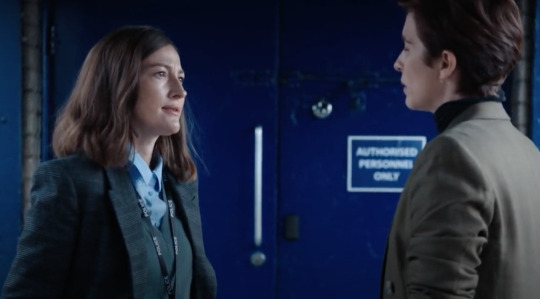
Wearing these same outfits, Jo catches up with Kate outside of Hillside, where she confronts her about AC-12's knowledge of the raids. Kate tells her she tipped them off because they're making a lawful inquiry. "Look, I'm telling you the truth Jo, because I trust you with it." Jo takes advantage of Kate sharing the information with AC-12 and tells Kate to put in a transfer request, saying, "I wouldn't want to harm your career, Kate. It's best if you request a transfer." Kate is taken aback and asks "You've been distant with me for days. Is this personal?" Jo denies this, pulling rank the same way she did with Steve, "I'm your senior officer, I should be distant." Kate seems confused and concerned with her response of "But I thought we were friends. What's happening here?" And here we see Jo’s fear crack through her irritation, just for a moment, when she says, "So you can tell AC-12?" As much as Jo is pushing Kate away in order to get her out of the picture, she also has a real fear that Kate continuing to share information with Steve will get Jo killed. She’s playing up Kate’s betrayal to explain her anger, but she’s also hurt and she wants her to know that. Jo trusts Kate, even if she doesn’t trust her enough to tell her the truth on her own. Up until this point, Kate has worked with her and told her about AC-12’s work, even helping her get a leg up on Steve. Now Kate’s helping AC-12 get a leg up on her.
But Kate is nothing if not determined. "No, I wouldn't tell them personal stuff." Kate refuses to take the transfer, and Jo leaves in frustration and anxiety, leaving Kate confused yet again.
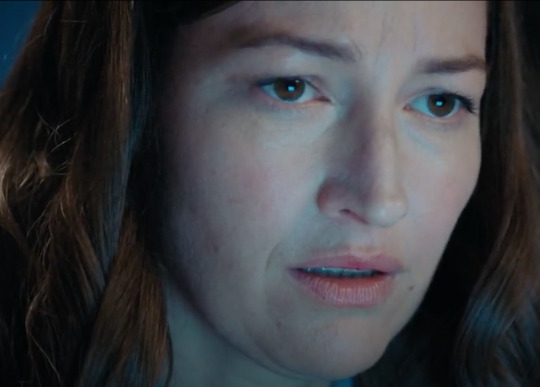
Back at Jo's flat, she's on the OCG laptop again. She tells the user she can handle AC-12, but they claim she can't because of Fleming. Jo tries to ask for more time to sort it, but time's up. "Get rid of her." Get rid of Kate, the last person Jo trusts, the one who just broke her trust.
And here is Jo’s betrayal. "As long as it's my last job." She looks devastated after she sends it, and she is. What she’s about to do is unforgivable. But scared and vulnerable people often do unforgivable things to save themselves. Jo just wants to be free, and she’s willing to pay a price for freedom.
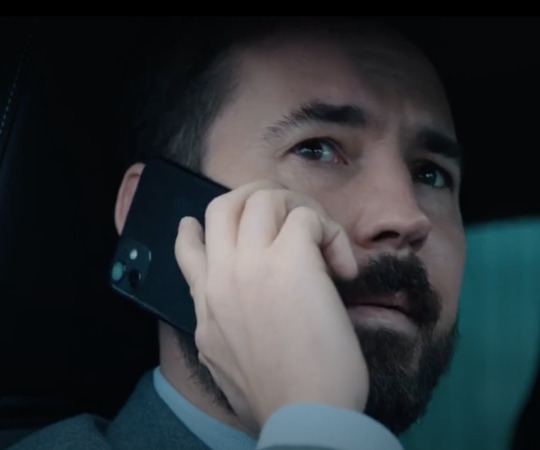
Steve, in his iconic grey suit and navy tie, goes to visit Ian Banks in prison and learns that Ted is the one that disclosed John Corbett's identity that later got him killed. He later calls Kate to tell her the news. Matching Steve, Kate is in a navy shirt, but is wearing a black suit, only the second time we’ve seen her in this suit. The first was in episode 2, when she gave Jo the information about AC-12 and they later had dinner together.
Kate heads back into Hillside after her conversation with Steve and runs into Jo in the hallway, who asks to meet with her outside of work to discuss their 'personal issues'. Jo specifically looks at officers further down the hall to confirm they're leaving before speaking to Kate. She also lowers her voice at her own mention of personal issues, adding an extra layer of privacy to an already empty hall.
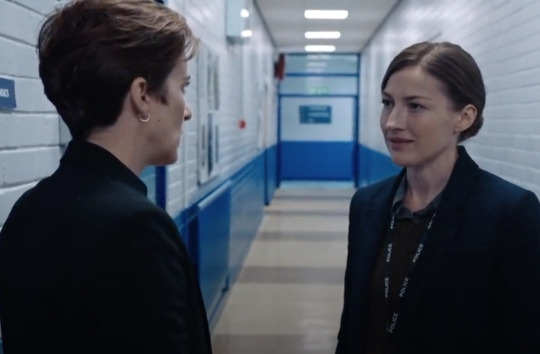
Checking to make sure there alone is something that Jo and Kate have done frequently throughout this series. In the handhold scene, they break apart when officers step into the hall. They mention how it’s easier to talk outside of work during both of their dinner scenes. When Kate tells Jo about Ryan’s spying, she dismisses Chris first, and later in that conversation when Jo puts her hand on Kate’s arm, they pull apart when they hear officers approaching.
Kate is surprised at Jo’s sudden change in behaviour from the past few days, but she agrees to meet with Jo after work. As Jo walks away, Kate clearly knows that something is up with her, but seems willing to find out what it is when they speak.
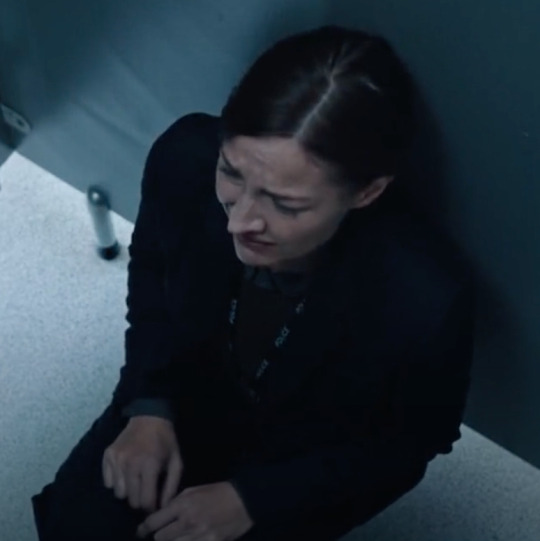
What Kate is sadly unaware of is that Jo walks away to lock herself in the bathroom and have a breakdown, distraught at the machination she has set in motion against Kate. Her hand shakes as she locks the stall, she falls to the ground, she looks around desperately for salvation. Jo’s mask, one that she maintains so strictly, falls for just a moment (not dissimilar to her breakdown in her car after framing Farida). Thirty seconds in a toilet stall to breakdown, to think about the consequences of her actions, about what she’s done to Kate. But she takes a few deep breaths, wipes away her tears, and we watch as her mask slips back into place.
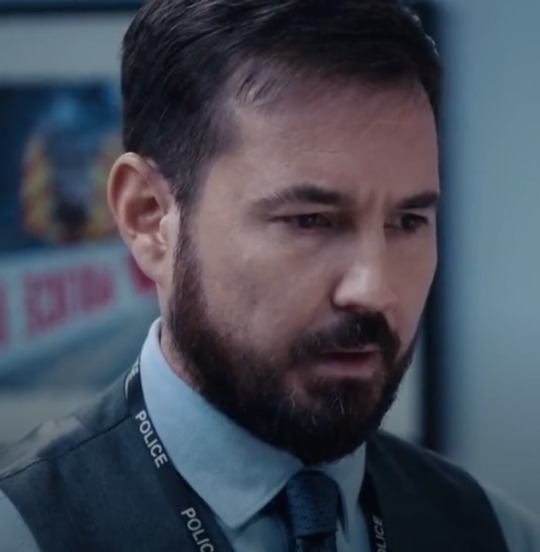
Back at AC-12, Chloe “my back is worse than Steve’s from carrying this investigation” Bishop has uncovered more about the racist gang that attacked Lawrence Christopher, including the investigators, Buckells and the current Chief Constable. This was the story Gail Vella was looking into when she was murdered, and appears to be the reason for her death. Steve is wearing the same grey suit and navy tie as when he spoke with Kate, and while he’s grateful for Chloe for digging everything up, he’s also concerned that the young Black woman had to learn so many details about the lynching of a young Black man. [Note: to be incredibly clear, the death of Lawrence Christopher as described by the script was a lynching, and the narrative did not do enough to reckon with that fact for anything more than relevance to the global racial justice uprisings reborn in late May of 2020. More than willing to discuss this further if anyone cares for my thoughts.] As they discuss the case, Patty Carmichael walks in with gusto (and damn if that voice isn't an incredible acting choice). She’s taking over AC-12, and she’s cancelling the surveillance on Jo and Ryan.
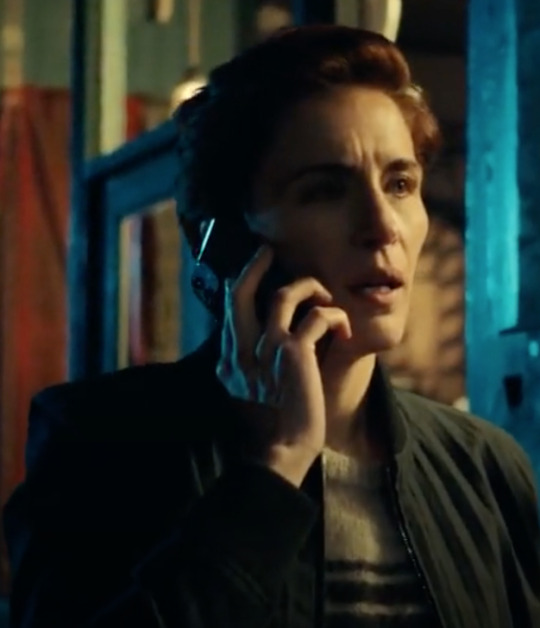
That night, Kate arrives at Frederico's to meet Jo, who calls her the moment she’s locked her car to ask to meet somewhere less public, for claims of privacy. Kate is immediately on alert, especially after her attempts to convince Jo to stick with the original plan. But after a small plea from Jo, she acquiesces, but not without caution. Kate immediately knows something is off - this is not how Jo interacts with her. Little do we know, Pilkington is skulking in Jo's backseat, coaching her actions.
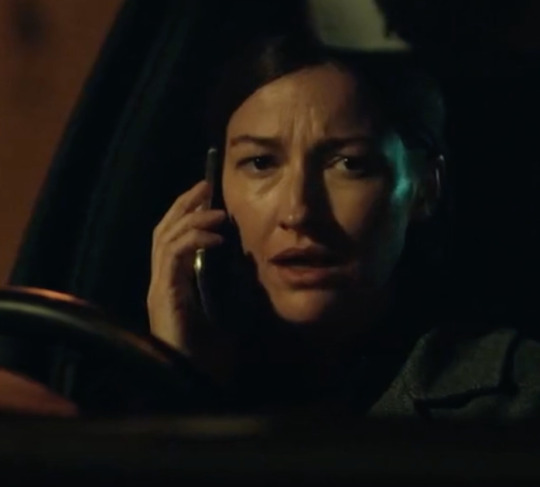
As an aside, this is also the only time we see them meeting out of work while they're both wearing casual clothes, not just the clothes they wore to the office.
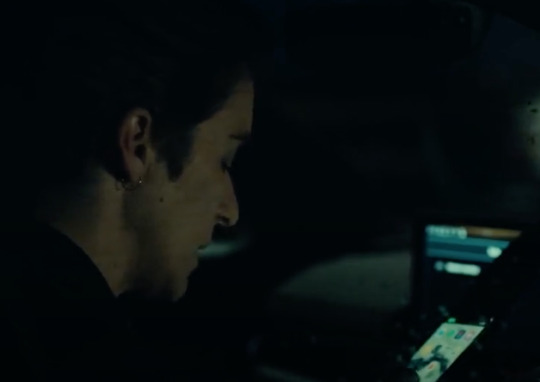
Kate drives to the lorry park and calls Steve, because she's both an idiot and a genius. He’s wearing the same suit as before, grey with a navy tie. She learns that surveillance was pulled on Jo and Ryan, and explains Jo's odd behaviour, forwarding him the address. Unfortunately, their conversation is cut short by Carmichael, which immediately sets Kate on high alert and she ends the call. Just as Kate is about to leave, Jo pulls into the lot, and the tension escalates.

Steve receives the address and immediately informs Hastings and Chloe, ordering the team to get a unit ready. The team starts to rush out and Carmichael asks for calm, which Ted isn't gonna do when one of his people is in danger. AC-12 isn’t about to let Kate down.
At the lorry park, a distraught Jo gets out of her car and approaches Kate’s car. Kate tries to convince Jo to go somewhere else, but all Jo can say is that she's sorry. Kate is confused, but that goes away pretty quickly once an armed bent bastard steps out of Jo's car. He gloats to Kate, saying "Jo wanted to give you a way out. Should've put in for that transfer." Kate tries to convince Ryan to put the gun down, that the authorities will find him, but it doesn't work. Which is when Kate makes a gamble - she tells Ryan about the surveillance on him and Jo. Ryan tries to blame Jo for their situation, but she acts none the wiser (even though Kate told her about Ryan’s surveillance in the previous episode).
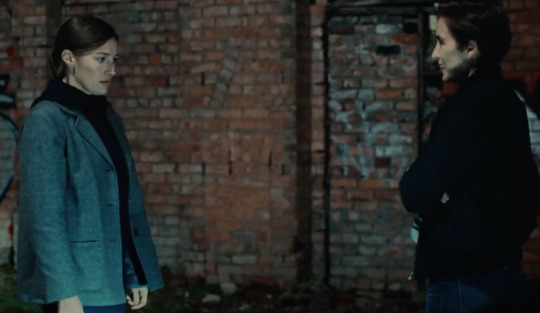
"Why would she come here otherwise?"
Sure, Jo is playing down her relationship with Kate for Ryan’s sake, but it isn’t quite that simple. Jo doesn't want to believe Kate had any faith in her. She wants to believe she was pretending, because she has no faith in herself. Her reaction does provide enough of a distraction for Kate to be able to pull her own weapon, and the most tense standoff ever begins...
One of the most key color choices of any outfits so far on the show are the clothes Jo and Kate wear to the lorry park where Jo sets up Kate to be killed by Ryan. Jo is wearing her grey coat, a blue sweatshirt, and a red top. Kate is wearing a blue coat, and a blue striped sweater with a band of red in the middle. These two outfits are ultimately the thesis statement between these two women. Jo is wearing red as her last layer, the one closest to her, but is surrounded by cool tones through her sweatshirt and coat. Meanwhile, Kate’s sweater has a stripes of red and orange surrounded by shades of blue.
But it doesn’t matter that Kate is being visually connected to Jo, because Jo is about to be responsible for her death via Ryan ‘the bent bastard’ Pilkington.
EPISODE 6
Nevermind though, no death for our beloved Kate!
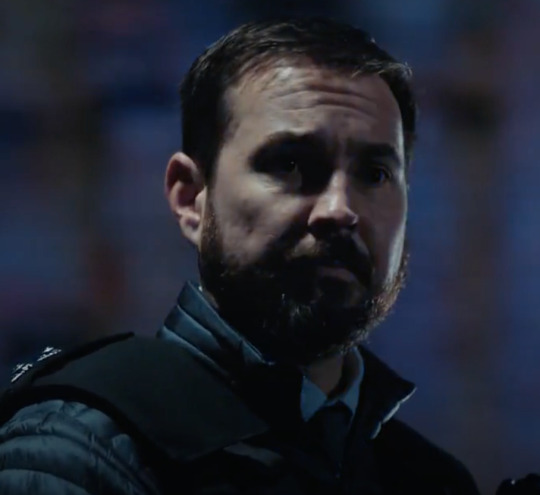
Now, I’m going to take the next parts of the episode slightly out of order in order to tackle Kate and Jo together before their ultimate confrontation with Steve and AC-12. First, a run down of the AC-12 crew: Hastings is in full uniform, which represents his ultimate faith in the system, despite the bad actors and groups that try to destroy it. Carmichael is wearing a grey coat, aligning her with anti-corruption, but it’s piped along the edges with red, which shows how she’s opposed to AC-12 (though not necessarily corrupt). Steve is in his classic blue on blue on blue under his body armor, which shows his dedication to justice and also his faith in Kate. Carmichael confronts him directly about Kate’s whereabouts, which he fastidiously denies having any knowledge of, but unfortunately Hastings is forced to admit that Kate was permitted to carry a concealed firearm for safety. Steve doesn’t trust Carmichael, and this is shown back at the office when he tracks what Patty C is up to, mobilizing Hastings when she’s on the move.

At first glance, Kate and Jo’s red and blue outfits read as a visual metaphor for AC-12 closing in on their location, but I posit that these outfits are also indicative of Kate's belief in Jo, despite her anger that Jo has just set up her death. It’s clear at this point that their simple flirty banter from the beginning of the season has evolved into a deeper connection, which is part of what makes Jo’s betrayal so painful - Kate has been on her side the whole time. Jo just didn’t know it. [note: wrote this before the finale so guess who has egg on her face now…]
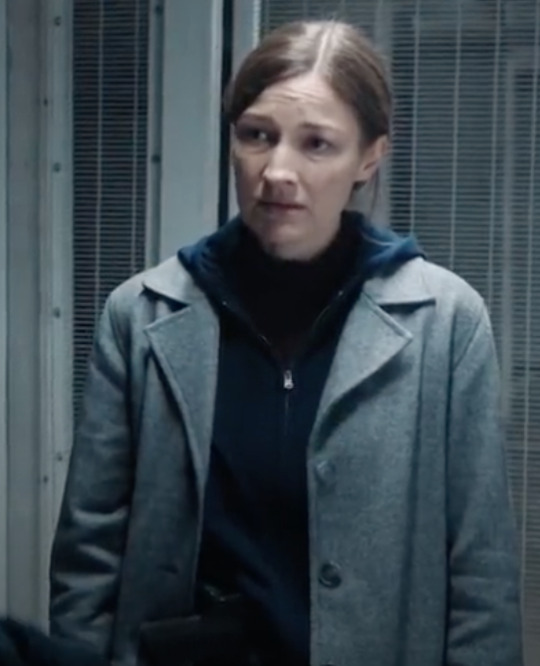
After a time jump (of nearly two hours, based on someone else’s analysis of time stamps and radio calls), Kate and Jo arrive at Steve's apartment. Jo asks if Steve can be trusted, and Kate leaves no doubt. Jo also asks why the surveillance got pulled, and Kate informs her about the chief and Carmichael. Jo denies having any part of it, but Kate isn't sure if she can believe her given the whole, you know, attempted murder thing. In a desperate bid to prove her loyalty to Kate, Jo asks for her gun, intentionally putting her prints on the murder weapon. Again, their coordinating outfits are the outward manifestation of their connection. Kate, while still angry, seems to accept what Jo is offering to her, but is clearly trying to maintain distance in the moment.
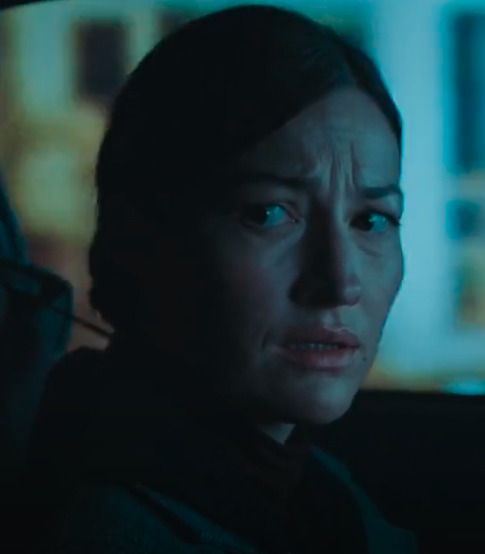
Jo then tries to see if things between them were real, but Kate refuses to entertain the conversation. What Jo is completely unaware of at this point is the lengths to which Kate has gone to prove that Jo isn't bent, up to and including risking a crucial raid on the OCG workshop. To Kate, it's a question that doesn't need to be asked, [the egg on my face remains] but Kate is also in disbelief that Jo would question her feelings when she's the one who was nearly killed by Jo. It’s an inappropriate time to have this discussion, and Kate lets that be known. They find Steve's personal car, a slate grey Mazda because this show is nothing if not subtle with its vehicular choices - even their personal vehicles tie in to their allegiance with AC-12’s mission.
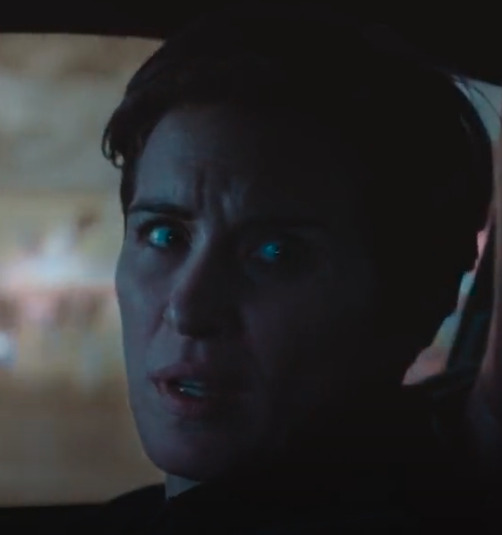
Driving in Steve's car, Jo asks again if Kate was pretending with Jo, and Kate diverts the conversation away from herself. Was Jo lying to her when she hired Kate because she was ex-anti-corruption? No, she was hoping Kate, with her anti-corruption background, would stop her. Would save her, really. They discuss Jo's ongoing work for the OCG, and Jo's fear that she'll be killed if she turns, just like Tommy. She insists that she's not bent and Kate implores her to prove it.
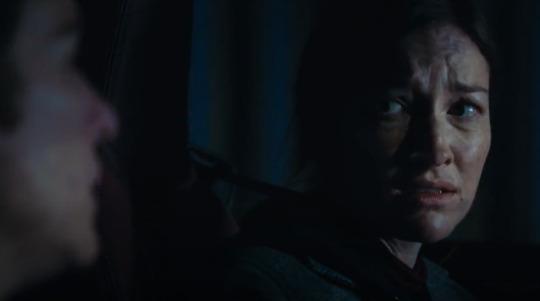
Kate is pissed [for the non-Americans, she’s very angry, not drunk…] in this scene, as she should be. She believed in Jo, she still believes in Jo, but she betrayed her in a major way. And now, when Kate is sticking her neck out for Jo again, she's still too scared to reveal what she knows. Jo does reveal that Tommy was her uncle, and that her father was a bent cop, which of course doesn’t align with what Kate knows. At Kate's further insistence, Jo directs them toward Gail Vella's house, and finally to the old print shop the OCG had used in the past that is across from Terry Boyle’s flat.
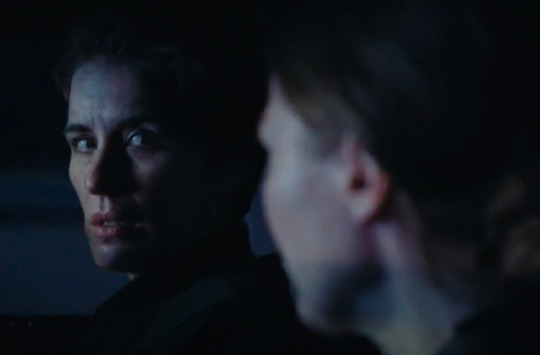
Kate and Jo arrive at the print shop, and Jo is finally about to reveal the truth to Kate. This act, coupled with putting her prints on the gun, earns Jo back a little bit of the trust she lost, and this is shown when the two women share the same shot. Most of the scenes between Jo and Kate have been over the shoulder shots where one woman is the primary focus, and this scene pivots to end with both of them together as the focus. This change happens in time with Kate dropping some of her much-deserved hostility toward the other woman.
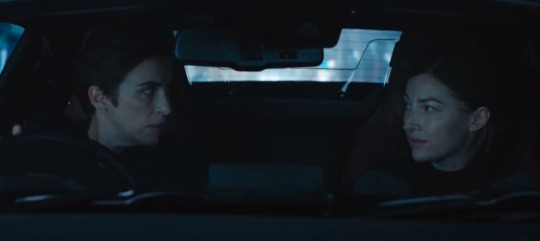
But before they can step out of the car, flashing lights and sirens appear behind them - they've been found. The fact that they've been tracked shocks Kate, but she spends no time dwelling as she throws the car into drive and speeds away. AC-12 AFOs have set up an intercept point, which Kate ignores in a truly badass handbrake turn, no matter if it makes any sense that they could have possibly known the route Kate would take in order to set up a kind of road block.
Handbrake turn or no, the Mazda has been intercepted and Kate and Jo are stuck. Kate is still confused that they've been found, but Jo knows the jig is up and tells Kate she's going to say she forced her to drive. It isn't until Jo tells her they have no other choice that Kate gets out of the car. Once out, Jo puts her hands up, but Kate refuses. Just then, AC-12 arrives with Carmichael, and Kate is in shock. "Jesus Christ, Steve's in on it" - cut to Jo's panicked face. This is the man Kate said they could trust, and now he's after them too.
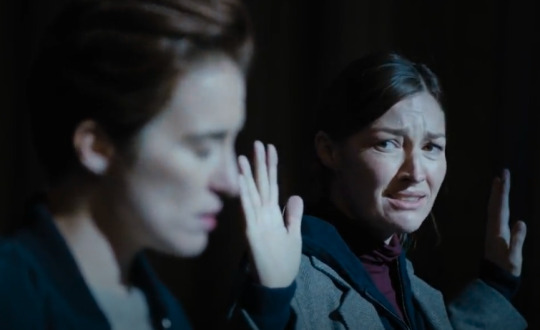
What follows is a very tense standoff between the two fleeing detectives and AC-12. Jo surrenders, but Kate refuses. First Carmichael tries, then Hastings (at which point Kate tells Jo she learned some shady stuff about him), and then finally Steve walks up to them. Jo begs Kate to surrender repeatedly, but the DI believes she’s onto her second major betrayal of the night and she isn’t willing to give in that easily. She thought she could trust Jo, and she nearly killed her, and to her mind she trusted Steve and he turned her over to Carmichael.
Kate is prepared to tear him a new asshole, but he swears up and down that he has no idea how they got tracked, he wouldn't do that to her. Once he promises to get the two women into safety, Kate surrenders. As he walks them in, Kate shared Ryan's confession of murder and Jo's clue about the print shop. To the end, Kate believes in justice and will pursue it.
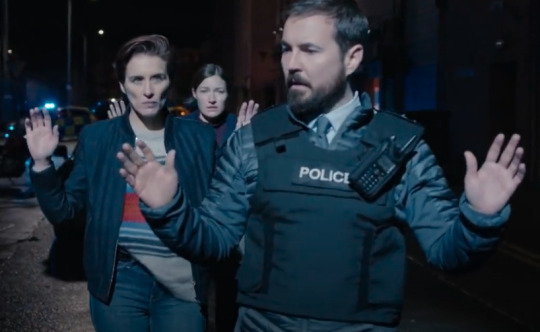
We then see a disillusioned Kate in her all grey Fruit of the Loom being walked into her jail cell. She sits down on the plastic mattress, looking at a total loss.
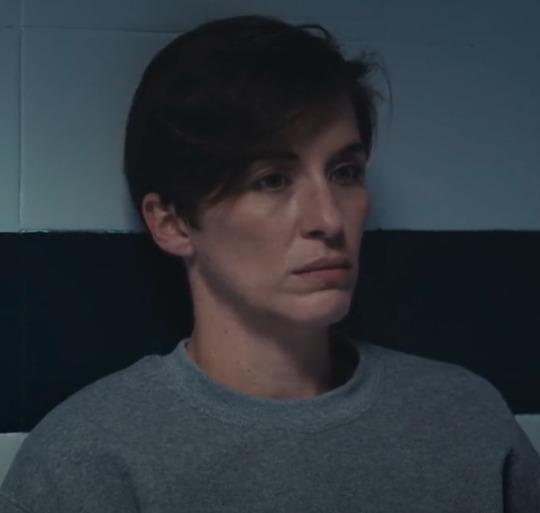
Later that night, Steve and Hastings are discussing the events of the previous few hours. Steve is in a grey suit with a blue shirt and tie, same as he had been wearing during the chase. The gaffer questions why Steve didn't tell him about Kate, and Steve claims it was to prevent putting him in a difficult position with Patty C, who walks in with the same question. Apparently, the former partners have keys to each other's houses and vehicles, in case of emergency. Carmichael taking Steve's phone would've read to Kate as an emergency. Steve refuses to back down, and she appears to drop it for the moment.

Now, onto Jo’s interrogation. A lot happens in this thirty minute scene, but to boil down to the important points: Jo is wearing her best Fruit of the Loom, stripping her of her identity and any affiliations she has. The lighting in this scene is cold and sterile, completely cool in tone. Steve sits with Carmichael and Hastings on the other side of the table, dressed in a navy suit, white shirt, and red tie.
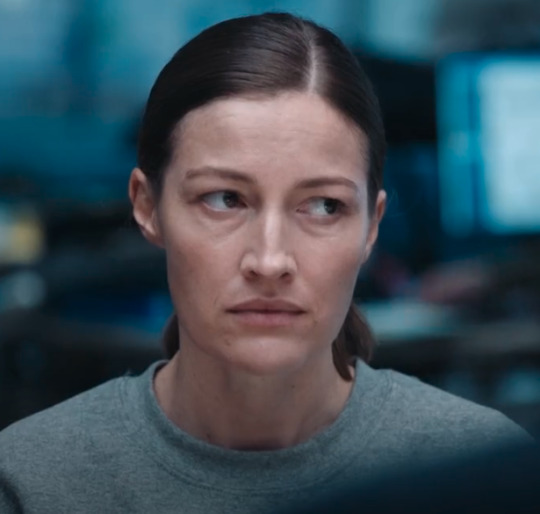
Something very important to note in this scene is Jo’s reliance on Steve. He speaks with her gently, acknowledges her pain, and encourages her to be truthful even when it is clearly very difficult. She takes Kate’s trust in him at face value and decides to trust him too. His outfit actually reflects this truth. He’s wearing the same red and blue that Kate and Jo wore while they were on the run - blue surrounds the red. As much as Jo is trusting Steve here because of Kate, Steve is being kind to Jo here for the same reason. His partner and friend does the right thing nearly always - if she was willing to go to these lengths to defend Jo, he owes it to her to learn the truth. Nothing exemplifies this more than when the conversation turns to Pilkington’s death.
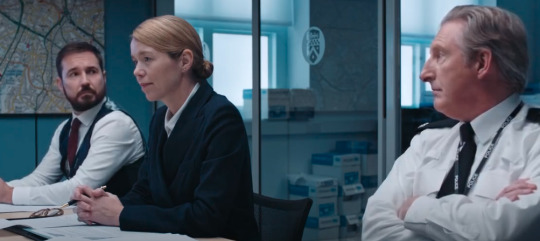
Jo refuses to answer at first and actually waits for AC-12 to show its hand first. She notices that Steve hesitates when Carmichael instructs him to talk about the evidence regarding Kate's gun, and she realizes this is her in, this is how she can prove herself to Kate once and for all. It's only after this that she claims to have shot Pilkington and completely shifts the blame from Kate to herself. This catches both Steve and Hastings up, and they react in obvious shock, which changes how Hastings treats her through the rest of the interview and cements Steve’s belief in Kate’s trust. Afterwards, she looks to Steve, who nods. He understands what she just did for Kate, and Jo is relieved to see his comprehension. The questioning continues, and Jo only admits to what she can take direct responsibility for, but nothing that involves the larger network.
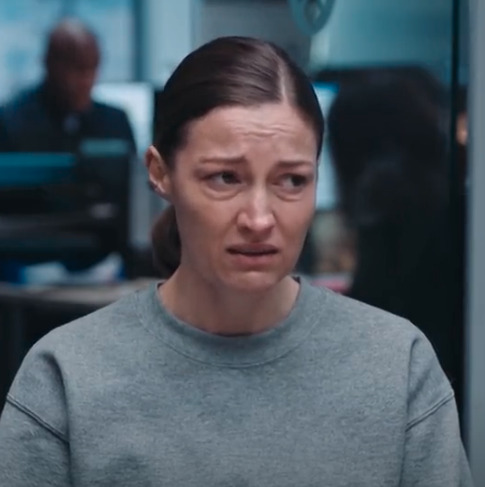
Once Carmichael and Hastings leave, she quickly turns to Steve and says a desperate "I'm so sorry." Sorry for hiding evidence in Operation Lighthouse. Sorry for framing Farida. Sorry for what she’s done to Kate.
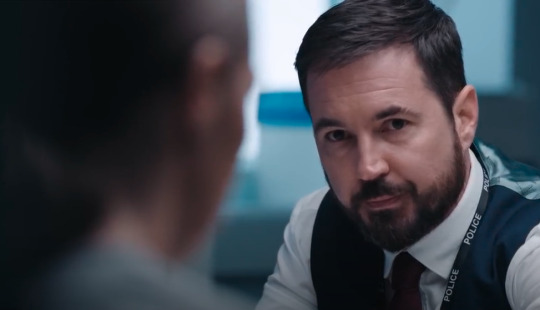
And Steve, gentle when he can be, gives her a kind "Yeah, me too," in reply. I’m sorry you were groomed into the OCG. I’m sorry you were scared for your life. I’m sorry you hurt Kate, too.
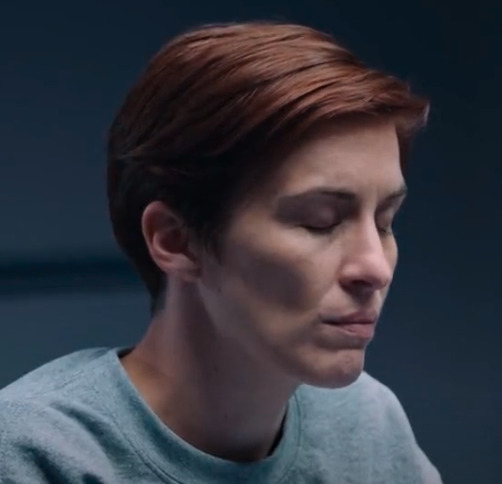
Patty C goes to talk to Kate, and lets her know she won't be charged for Ryan's murder - Jo will be. Kate has a look of relief on her face as she processes the information. But Patty C notes Jo isn't firearms trained, and Kate is. She's telling Kate she knows what really happened, and she's letting it slide. This time. Kate is well aware that Carmichael isn’t stupid - she knows Jo was lying and is only letting Kate get away with it because it better serves her interests. Kate is free, and she sighs with relief and the knowledge of what Jo did.
Steve, still in the same outfit from the interview, and Kate, in a navy pea coat and yellow sweater, meet in an underground car park. once she's been released. A quick note on Kate’s coat: I’d love to say there’s a deeper meaning for the shift in her coat, but I genuinely think it’s just because filming was originally in the spring, then was moved to the fall and continued until November, so it was simply colder. The cut and color of the coat are generally the same, despite the style changing.
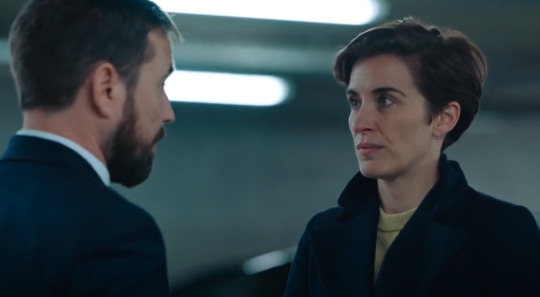
Steve offers to lend an ear about the shooting, and then Kate asks about Jo's interview. Steve tells her they didn't get enough information out of her, and Kate tells him that Jo told her that her dad was an officer. "She's scared, Steve. After what happened to Tommy, Dot, Lakewell, nevermind John Corbett". Kate’s anger seems to have dissipated at least a little at this point, because here she is, defending Jo by explaining why she wasn’t forthcoming with a lot of information. This is most obvious through her yellow sweater - still affiliated with Jo, even through everything else. Steve lets her know that Jo is in a secure cell with extra monitoring, which seems to appease her. Kate then informs him she's been made SIO at MIT, and will guarantee cooperation with AC-12. Lomax calls Kate, and the two partners are back working together.
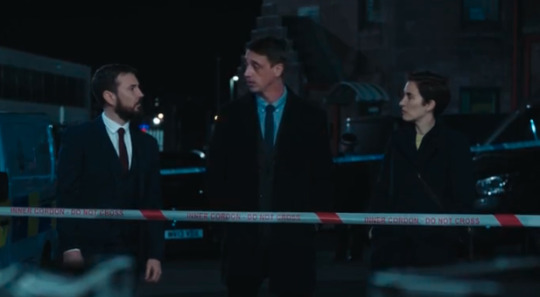
Kate and Steve meet Lomax at the OCG workshop, where he goes over the forensic findings so far as MIT’s resident plot reciter. Kate tells him they need to look further, and orders him to dig up the floor, ruining the poor man’s plans for the evening.
Chloe calls Steve with an update on Thurwell. Then we get a weird scene of darkvision Spanish police apprehending Thurwell. Truly hate it. He's dead. It's a deadend. Clever writing, Jed.
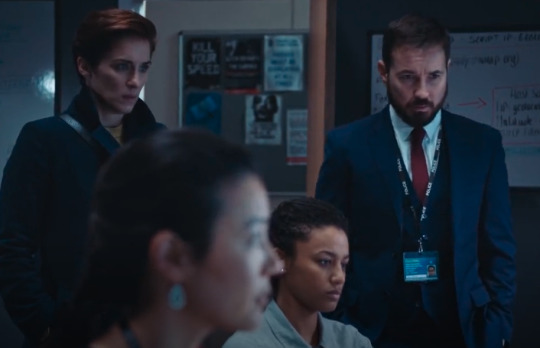
The episode ends with Jo in her navy blue jumper being put into her cell at Brentiss. Tweedle Dum and Tweedle Dee, Lindsay Denton’s besties, walk up threateningly before Jo is led into her cell and the door is shut. I do love the shot here of Jo through the door, caught in a small tight space that’s almost closing in on her.
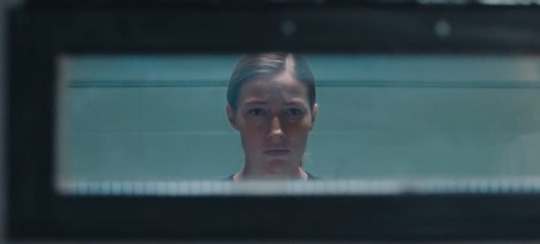
EPISODE 7
Before I fully jump into Episode 7, please be aware that I am doing a textual analysis. I’m not going to go into the fourth man reveal and its logic or even greater meaning (particularly because I’m looking at this show from a different political context as an American), and I’m not going to speculate on things not seen, at least in this analysis, because the focus is on wardrobe. You can trust I have many thoughts, particularly around race and the writing around female characters, some of which I’ve included but most of which I did not. It took me 9 full days to write everything for this one episode, and was shockingly exhausting. Forgive me if it doesn’t live up to my other ramblings.
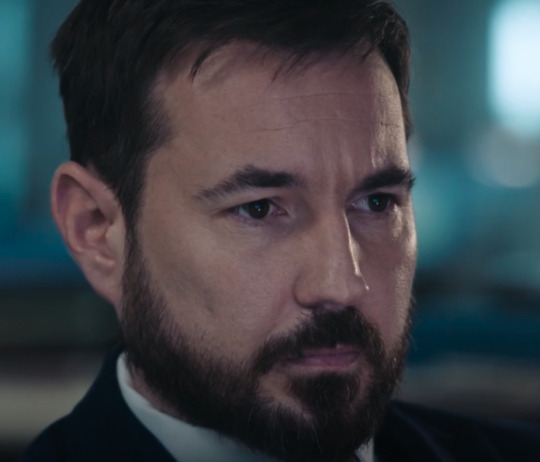
We’ll jump right into things. I'm gay but Steve looks so good here in his AC-12 uniform. Anyways, Steve is watching Hastings' old interview with Carmichael about Ian Banks. His concern about Hastings is clear. He’s in pursuit of justice, even if justice puts him up against the gaffer.
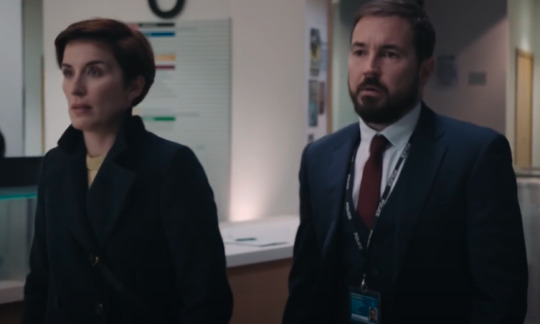
Later, Steve and Kate discuss the gaffer and his suspicious behaviour, and he informs her that Ted is slated for retirement. Steve wants to let it go, but Kate refuses. She asks if Steph Corbett knows anything more, and suggests she may be blackmailing Hastings, but Steve is dismissive of it. This causes Kate to raise an eyebrow - oh god Steve's done it again. Steve pleads "It's not like that, mate, it's different," and Kate has never looked more disbelieving and annoyed. She responds, "She's a person of interest,” and their conversation is cut short when Chris calls Kate with an update. Steve is still in his navy suit, and Kate in her yellow sweater. The lack of coordination in these clothes show Kate isn’t quite on the same page as Steve yet, but they’re getting there.
Lomax tells them there was a case found in the floor of the workshop, much like the one holding Gail Vella's computers at the abandoned print shop that Jo led them to. No comment on the OCG’s evidence techniques.
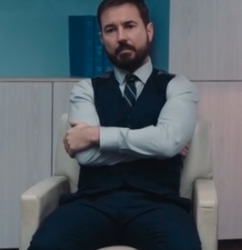
Steve, who kept skipping his occupational health warnings, is in therapy. I didn't cover the OH stuff throughout this analysis since it didn't relate to Jo, but this manages to tie in later so here it is now. It ends in him agreeing to temporarily give up his firearms license. I'm not going to discuss the rest of the meeting, given that Steve seemed to kick his pill addiction and reliance on alcohol and pain relievers to deal with his back pretty damn quickly and it's a storyline of entirely no relevance except as something Ted holds over Steve in a moment of manipulation later. Steve also admits this to Hastings before Occupational Health can tell him. This entire storyline is frustrating. Moving on!
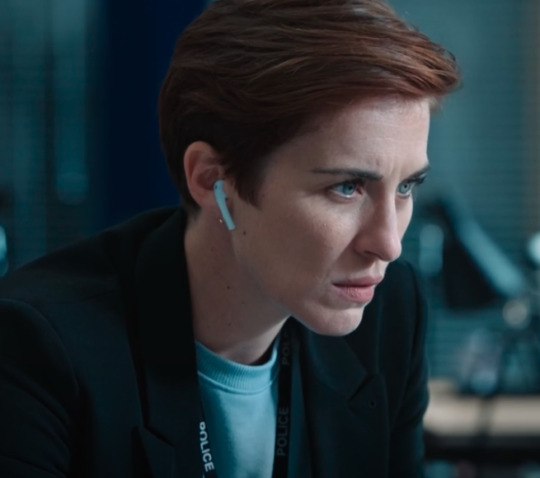
Kate is watching Jo's AC-12 interview at her desk on the Hill, specifically rewinding to parts concerning who Jo believed her father was. She pauses it on a frame of Jo’s face, the terror clear. Kate is dressed in a black suit and a light blue shirt, back on the side of AC-12 and in pursuit of justice, not only with regard to the OCG, but for Gail Vella and Jo.
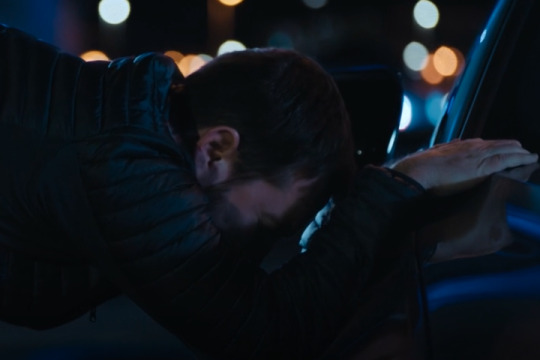
Steph calls Steve again, and he ignores it, because he's being a bit of a dick. Then he steps out of his car and has a back spasm. This only comes up so Kate can ask about it later and show that Steve, wearing a blue jacket, listened to what she said about getting close to a person of interest. Would truly love to know why Steve parks by an underpass by a river for this scene, but needs must, I guess.
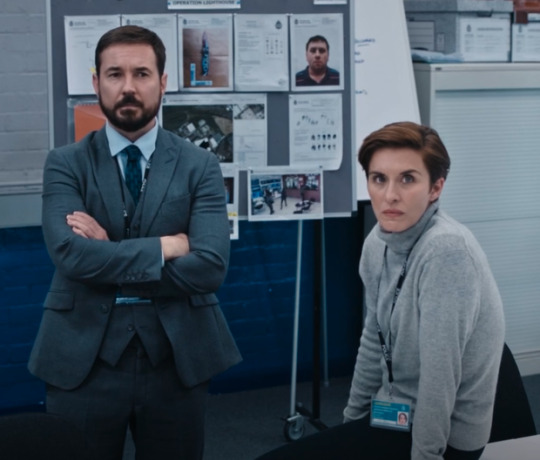
Back at Hillside, another Lomax briefing! Because Chris, Chloe, and sometimes Kate are truly the only people who do any detecting in the entire series!!! Anyways, Chris tells Steve and Kate about the contents of the box under the floor of the workshop. Conveniently, it held four murder weapons (can Jed Mercurio spell deus ex machina?) and neatly tied a bow on Corbett, Bindra, and Vella's deaths, and in a nice series 1 throwback, Jackie Laverty's murder! Kate is wearing a grey turtleneck which coordinates beautifully with Steve’s grey suit, blue tie, and blue shirt. This shows that they’re back on the same page and on the same team, despite their ups and downs this series.
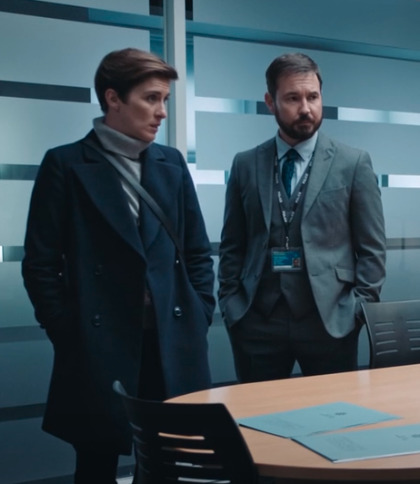
Kate and Steve return to AC-12, where Kate in her new navy pea coat shares that the proceedings against Terry Boyle will be stopped. Except, to my knowledge, Jo already handled that...? They literally made a point of it in her interview. Anyway, Chloe, like Chris, did all the detective work and tells them that the IP of the OCG laptop is in the UK, not Spain as previously believed. Amanda from forensics, the only other person who does any real work, interrupts with a message that shows Jo is about to be targeted. Definitely is spelled wrong. I give up. They feel the need to spell out what JD and BP mean, but spend 3 episodes never explaining what a CHIS is. Sure. Chloe is tasked with finding the fourth man via spelling.
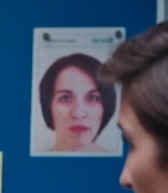
Also I'm truly not being funny by why is Kate on the investigation board in AC-12. Like. What. Was she a suspect? She’s not with the other victims!
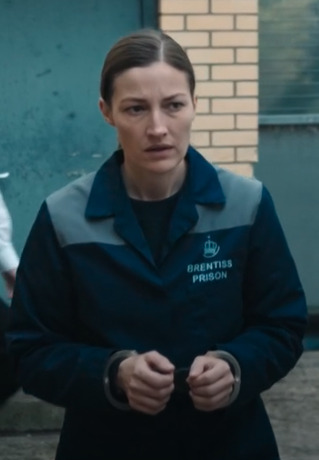
A very forlorn Jo in her blue Brentiss jumpsuit is sitting in her prison cell before being collected for transport to Hillside. Jo is very aware that something must be wrong because she’s a damn fine detective. She's mad suspicious as they head out to the van, and lo and behold, Tweedle Dee and Tweedle Dum are on the transport team.
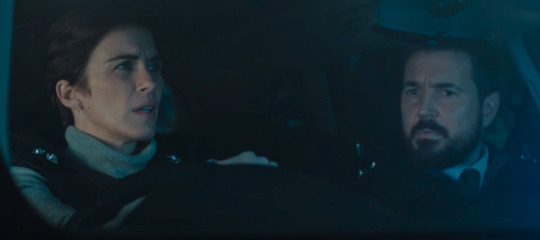
En route to Brentiss, they learn that Lomax and Kate's signatures were forged on the production order for Jo. Meanwhile, Jo is too smart for her own good, and questions the guard during the transport about the requesting officer. Tweedle Dee plays dumb.
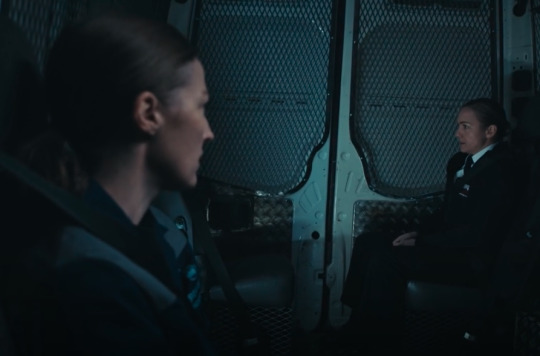
And then… nothing happens. They intercepted the van in advance, removed Jo, and planted Steve and Kate on the van. Because Steve is such a great choice what with his being an UNARMED OFFICER AT THE TIME. They arrest everyone. Steve ends up with a gun. Ok.
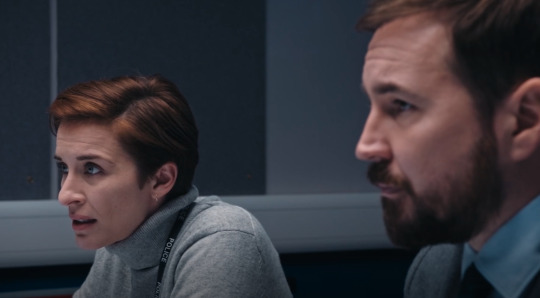
In an interrogation room, Kate and Steve explain what happened to Jo. Hastings looks on. Kate tells Jo she can apply to witness protection, and that all of her notes will show that she was under coercion from others, giving her a shot at the life she never had, but only if she reveals who the top man is, aka her father. Jo begins to cry, and Steve reminds her those OCG men were sent to kill her - this man doesn't care for her. Jo begins to tell them that she had no reason to believe Tommy was lying to her, all while speaking only to Kate. Steve encourages her further, telling her she's not bent. Kate asks her one last time for the name, and we see Jo resolve to say something before the scene cuts. Heaven forbid we show something happening instead of faking built suspense.
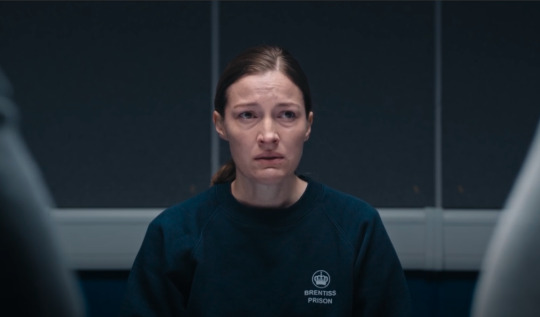
Now, I need to pause here for a small moment of rage. Kate should have been the one who got the call back line by telling Jo she's not bent. Not for any romantic reason, but because their little run from the police stunt was done at least in part under the auspices that Jo could prove to Kate that she wasn't bent. In fact, Kate pleads with Jo to do so. It's just frustrating, and gives Steve an emotional beat he hasn't truly earned with Jo, or at least hasn’t earned as much as Kate.
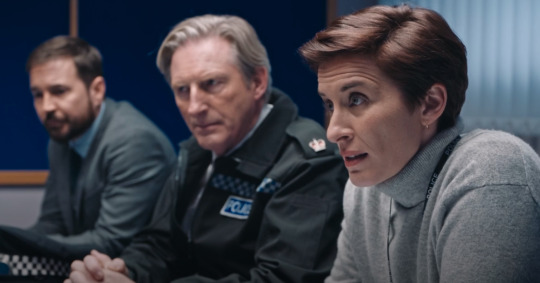
And Jo gives them a name! They search a prison cell, and find nothing. It's really built up to seem like it's Fairbank, who is revealed to be a confused old dude. Why Jo thought she was communicating with him this entire time is simply never addressed. Whatever. They ask about the murders and cover ups, and he offers nothing. Kate asks about Jo, and after some more pushing, Fairbank implicitly agrees that he and Tommy Hunter convinced Jo he was her father. Hastings is pissed, but Chloe calls to save the day (again).
Chloe "I should be Chief Constable" Bishop brings the team up to speed on the text search for incorrect spellings of the word definitely. Which they've apparently managed to do in a matter of hours, even on handwritten reports from 17 years prior! Because Jed has definitely never needed to do a text analysis by hand before. They then proceed to NEVER NAME THE SUSPECT. FOR 1 MINUTE AND 10 SECONDS.

Oh but don't worry, because this is the perfect opportunity for our realigned partners to confront Hastings about the bribe money and his conversations with Ian Banks. Can't reveal who the fourth man is when the head of the investigation is also a bent cop, silly audience. And it's revealed that Ted leaked Corbett as a UCO because of Corbett's role in the attack on Hastings' wife. But it's okay because he's sorry about it!
To be hella clear: Hastings, an anti-corruption officer who prides himself on following the letter of the law, took actions he knew would result in the death of John Corbett and Kate later forgives him for it. Jo was under threat of death from the OCG and tried to get rid of Kate via transfer and then led her to an empty lorry park to be killed while she thought Ryan was under surveillance that could likely intervene, and we in no way see Kate react to that experience in this episode. Cool!
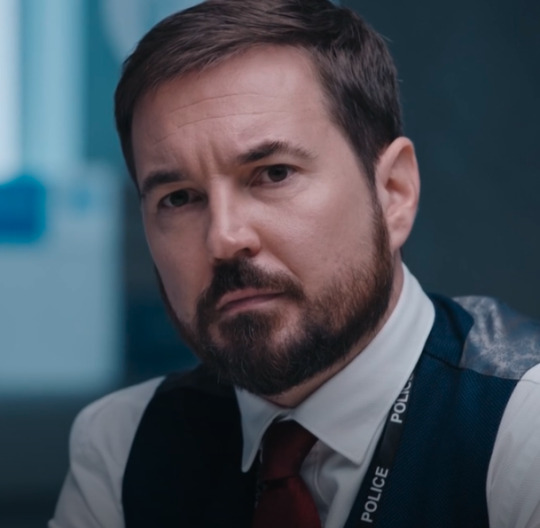
Finally, we get the interview with the fourth man, which is revealed 8 minutes and 32 seconds after the characters themselves learn the information. For some reason unknown to God or man, Kate is there despite not being involved in Buckells' case since she works for MIT, not AC-12. Frankly, not gonna delve into it. Kate is wearing a sweater we've yet to see her in, a blue crew neck that is frankly more feminine than anything we've seen this series so far, and moreso matches what she's worn in previous series. It’s unsettling. Steve is in his classic AC-12 uniform.
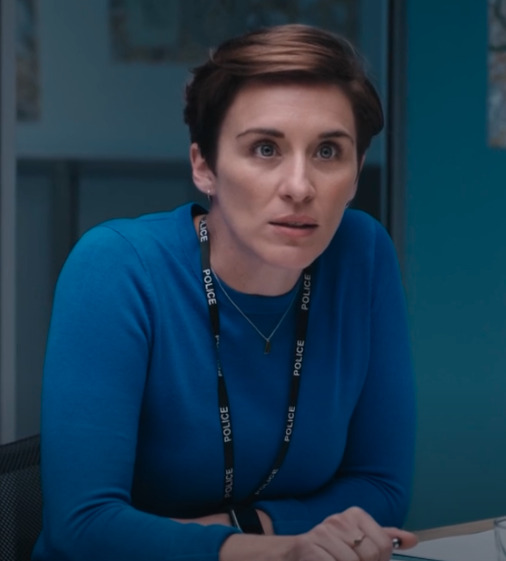
Just a quick q for the kids at home - if Buckells only ever communicated with people via a secure browser on burner devices, how in the hell did he get a laptop in prison? Also, why did he not break himself out of prison by having someone else plant evidence of some kind, especially since he supposedly had a lot to blackmail Jo with?
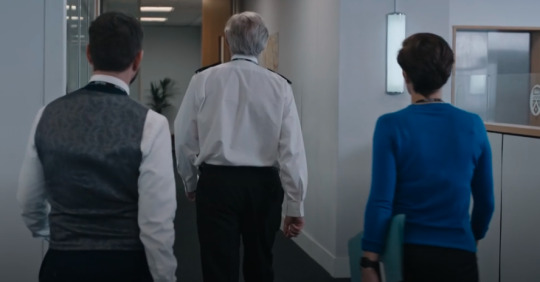
At what I can only assume is their local, Steve and Kate congratulate themselves on doing nothing beyond sit in interview rooms to catch Buckells. Kate might go back to AC-12 - even though she left because of the gaffer's actions which turned out to be WAY WORSE THAN SHE PREVIOUSLY BELIEVED? Sure, Jed. They have a chat about what's been happening with Steve and his painkiller addiction. Kate implies he should drive up to Liverpool to see Steph, which he doesn't think is a good idea. But don't worry, they've got each other, mate. Platonic soulmates forever (no romantic underscoring in this analysis).
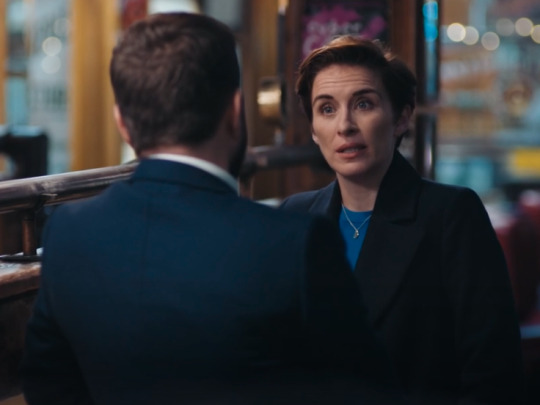
And then, with no previous discussion in the script or even telegraphing by the camera, Kate is in therapy. Which is great, because she truly needs it, girl has been through a lot. She mentions her ex, and Josh who is apparently her reason for living but she's texted about him once and mentioned him offhand to Jo to tell her he'd be with her ex, and then her great friend and partner, Steve (which is true, but the romantic framing is gross and out of character).
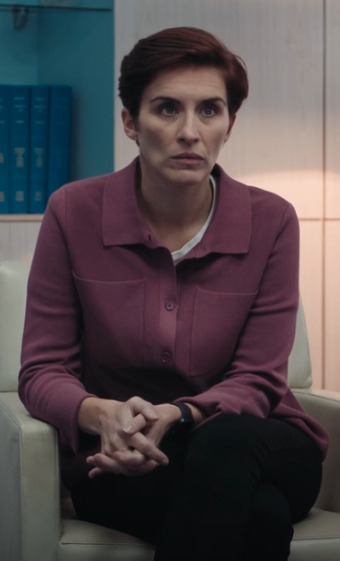
Not being funny, Kate is wearing a truly horrendous mauve top here, over a white shirt. We've never seen her in a color like this, it doesn't fit in with the rest of the color palette in her wardrobe, up to and including all of the orange and brown she wore at MIT. It's honestly frumpy, and in no way aligns with the characterization shown to us through her wardrobe in the rest of the series. The last time we do see her in an outfit like that is during the interview with Jo. Jo left and took Kate's excellent sense of style with her.

Kate and Steve meet with Patty to discuss Darren Hunter's involvement in the murder of Lawrence Christopher, and discuss how there's more corrupt officers to be uncovered. Patty C isn't gonna do anything about that tho. Hastings strolls up to chat with Patty C, and we learn that Buckells will get immunity. The trio are about to leave when Ted storms back into her office to confess to his actions leading to John Corbett's death. He gets one more speech about carrying the fire and bad apples in policing before they all leave.
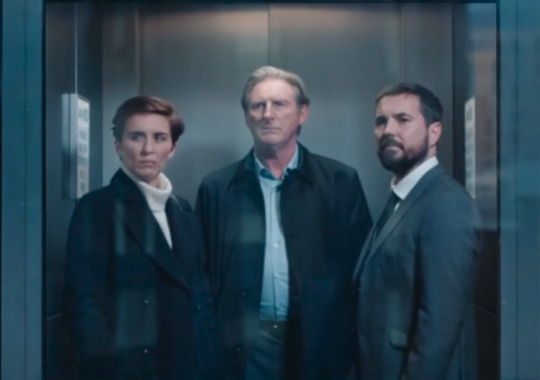
For the final outfits we may ever see them in, Hastings is wearing a blue shirt, Steve is wearing a grey suit, white shirt, and green tie, and Kate is in a white turtleneck with a navy pea coat. Again, this turtleneck is more effeminate than anything we’ve seen her in this series. Hell, even Patty C is wearing blue to show she’s aligned with anti-corruption and just kind of a bitch, not actually corrupt.
Finally, to the blessed epilogue. Shoutout to Terry and Farida for getting some closure to the bullshit they’ve been through.
Jo steps out of her little stone cottage in the country, dressed in a casual sweater of grey and blue, breathing in the fall air deeply. Her layers of clothing are gone, her hair is down and soft. Her Icelandic sweater shows that she’s finally free to honor her heart, and no longer feels trapped by her family and who she thought they were.
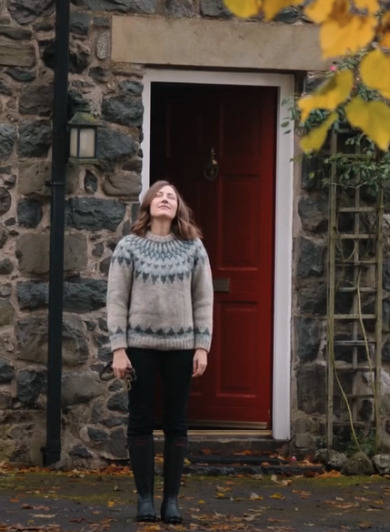
And then, a dog trots out after her, and we see Jo bend down to hug the retriever and kiss its head. This is the most free affection we have ever seen Jo give. A set of legs appear in the doorway behind her, and a redheaded woman steps out of the cottage to meet Jo and the dog. Jo smiles at her, oh so freely after the tension she carried for 21 years, and they clasp hands, walking down the country road away from their home. Because Jo is free, and she can freely love and live without fear in her new life.
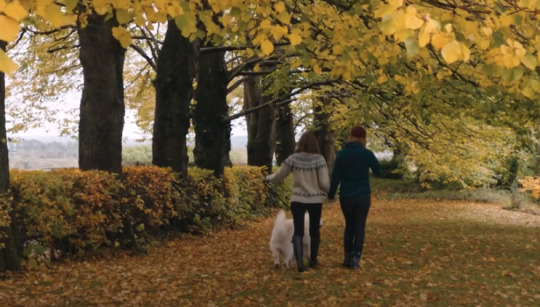
Now, from a purely logistical standpoint, very little affection between anyone could be shown from episodes 3-7 because of COVID filming protocols (which seem to be far more strict on physical distancing than American and Canadian productions). The production team actually did a brilliant job using forced perspective and interesting over the shoulders to make people seem like they were closer together than they were. From a film nerd perspective though, they broke the 180 rule so frequently that I nearly lost my mind (glass boxes are great but they ignore all rules of perspective).
All that aside, the logistics of filming in COVID mean that moments where we do see physical distancing broken are all the more important. Kelly filmed this scene with an actress who she has not been working with for months, because it is so, so important to see Jo come out of the other side of her tragic life intact. It also matters that her partner is wearing a warm hat and has red hair (intentional casting or otherwise) and that their home has a red door, because it shows that those warm tones represent something different for Jo now. They don’t represent fear and betrayal and being trapped - now they represent home.
Additionally, there are a lot of comparisons made between Jo, Dot, and Ryan. All three had been groomed by Tommy Hunter since childhood to work for the OCG, all three were put into the Central Police to act as inside men, and all three committed terrible acts in their own interest. But there are differences here. Ryan was a little shit as a kid and he clearly had a terrible home life - his mom was the worst. He gravitated to an authority figure who offered him something different and who gave him power. He is a victim of circumstance - but he also found power and enjoyment in his terrible actions. He gloated about Maneet Bindra and John Corbett’s deaths, and he enjoyed wielding power over Jo when he was threatening her.
Dot is the blend between Ryan and Jo - he too was groomed by Tommy to enter this world of crime, and did many awful things without regret, including killing people who threatened to expose his identity as the Caddy. It’s not until his friendship, and burgeoning relationship, that his behavior changes. He almost gets away from the Central Police, despite Kate hopping on a lorry for a free ride to track him down, but when faced with the reality that this would mean Kate’s death, he sacrifices himself and gives her a final clue to dismantle the OCG within the police.
Jo, from what we’re shown, felt regret after everything she did, and the show made it a point to demonstrate Jo as a victim of her family and genuine fear for her life if she didn’t continue following the actions of the OCG. We never saw Ryan or Dot with a gun to their head or with a dozen locks on their door. We never saw them break down in bathroom stalls, or even framing people and discrediting them instead of killing them. And it’s ultimately her relationship with Kate that changes things for her - she tries to use Kate at first to get caught, and when they get close she tries to push Kate away in order to protect her, right until she thinks she has no other choice but to let Ryan kill her.
It’s interesting that all three characters meet their end with Kate (and a damn shame the show never chose to address that fully). She quite literally kills Ryan, has a standoff with Dot that ends with him sacrificing himself for her and giving a dying declaration, and goes on the run with Jo to give her time to prove she isn’t bent and who plants evidence against herself to protect Kate. Later, it’s Kate who convinces Jo to give up everything she knows about the OCG and the man who claimed to be her father, and Kate who offers immunity and witness protection. Finally, in their last scene together, Kate manages to save one of the people corrupted under the thumb of the OCG. She completes a task she first set out for in series 1, the first time she interviewed Ryan and tried to get him to realize there’s a better life out there for him.
Kate does what Jo was hoping she would: she saves her, and gives her the life she never thought she could have.
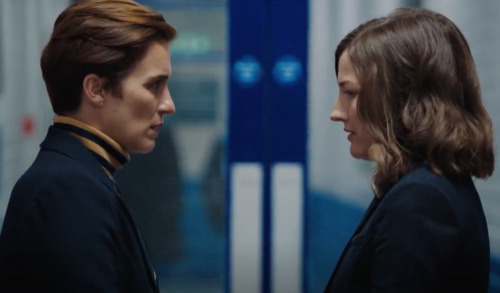
I wish I could end this with a perfect bow that ties the wardrobe threads of this series together, but frankly I can’t. On a macro level, cool tones remains the symbol of anti-corruption and the pursuit of truth and justice, and warm tones represent any force opposing those ideals. On a micro level, Steve’s clothing choices and what they represent remain consistent throughout the series, as do Jo’s. However, the character that ties Steve and Jo together, the person who believed in the truth of Jo despite what face value was saying, that person’s wardrobe gets thrown to hell in the final episode. Kate’s colors remain cool, and it’s understandable that the warm tones that represented her connection to Jo disappear as Jo turns on the OCG, but the actual physical clothing is completely different from what she’s been wearing before and doesn’t fit her characterization.
I think it’s crucial to note that her femininity is only played up when she’s back on a team with men, where her earlier androgynous dress became suddenly unacceptable. It’s a damn shame, because the emotional payoff for Kate’s growth outside of AC-12 could’ve been really spectacular, and she was stymied in the end in favor of her male colleagues.
#line of duty#kate fleming#jo davidson#steve arnott#flemson#kate x jo#lod spoilers#line of duty spoilers#It took me a long time to finish this because I struggled with the absolute 180 degree turn the show took tonally in the final episode#It honestly threw off quite a few of my conclusions#and I had to rethink the analysis#but thank you to everyone who stuck with me#enjoy!
40 notes
·
View notes
Text
Loki: Religious Predestination v Free-Will
And how that affects his relationship with Mobius, narratively speaking
So. In case it isn’t clear by *gestures at my whole blog*, I’m a Supernatural blog. I’m a DeanCas blog. I haven’t been around much lately because there are very important, Orwellian things going on in Brasil, but I still keep up with the fandom. And, more important to this post, I still keep up with whatever Marvel’s doing, which means I get up at 7 am every Wednesday to watch Loki.
(Before we start, I’d like to note that I had never actually published any meta on Tumblr. The most I had done was give it to my philosophy and biology teachers as school essays. So, bear with me, okay?)
Well, what does Supernatural have to do with Loki? Not much, except for the narrative they very obviously share. The characters are different, their motivations too, and so are many of the variables that surround, but deep down, at the core, it is the same narrative of Religious Predestination versus Free-Will. And yes, that drives me all the way up the walls.
Religious Predestination is the idea that all events, past, present, and future have been foretold, “written”, predicted by divine, omnipotent beings. There are different types of Predestination, but the two I think fit the most here are Double Predestination and Middle Knowledge (yes, most of my knowledge of this comes from Wikipedia, sue me).
The first claims that God (or whichever omnipotent divine being is responsible for the predestination, in this case, the Time-Keepers) chooses from his own will who will be “condemned” and who will be “saved”. This applies to the show when we consider the fact that Loki has been “predestined” to be a villain. Is all he’s ever been, it’s what he was “born to be”, while the Avengers were all born to be heroes, according to the decrees of the Time-Keepers.
Meanwhile, Middle Knowledge defends that, before the creation of the world (or, in this case, the Sacred Timeline), God already knew every choice that every free-will possessing creature could make in any given circumstance, and He chose the “timeline” that most suited his will. This version also makes sense when we consider the existence of multiple timelines and that the Time-Keepers united them and decided what would be the proper flow of time.
Now, which exact version of Religious Predestination to pick isn’t exactly my point here. My point is that I) everything about the TVA screams Religious Predestination allegory, from the minutemen and other agents being “created” to the words “decree” and “dictate” being thrown around whenever Ravonna is on screen or someone’s talking about the Time-Keepers (who just so happen to be kind of worshipped at the TVA, as there are so many statues of them. They are treated like gods. They are gods.). Do you know what else is a Religious Predestination allegory? Blade Runner. Do you know what was one of the main inspirations for the TVA’s design? Blade Runner! That could mean nothing or that could mean something given *gestures vaguely at the rest of this post*.
So. Loki seeks to escape his “Destiny”. He wants to make his own choices without them being decreed by divine, omnipotent beings. He wants his successes and failures (but mostly his successes) to be his own, and, most important, he doesn’t want to be what everyone expects him to be. Not anymore. Not after what he saw at the TVA. Because everyone is telling him that he was “born to be” a villain (or, at the very least, a side character), he will now want to prove to everyone that he can be more than that. Because he is that “insubordinate, stubborn, and unpredictable” (even if he plans on overthrowing the TVA, I don’t think he sees that as an act of villainy. Maybe he never even planned on actually overthrowing the TVA, maybe he just wanted to get the Variant).
And Mobius, well. Mobius is a good TVA agent. Not all good, of course, ‘cause he has shown more than once that he doesn’t completely agree with how the TVA does things (“They should be scared” “Not of us”), even though, at the end of the day, he believes in them and accepts their mission because he believes they are doing the right thing (unless I’m completely wrong about Mobius, he is the true villain of the show, and has an evil plan of his own. Sorry, I saw a post and now I’m paranoid). So, what happens when an already questioning, though devoted, agent of the Time Variance Authority like Mobius comes into contact with someone like Loki, who pretty much worships Chaos? After having studied Loki’s whole life, and admittedly being a big fan? Well, this happens:
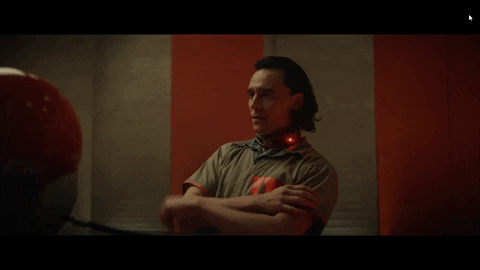
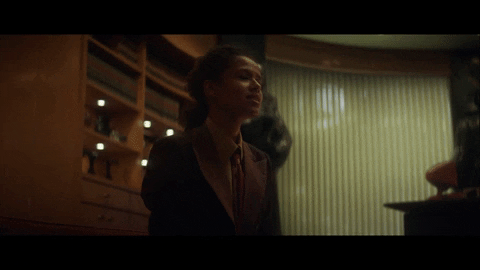
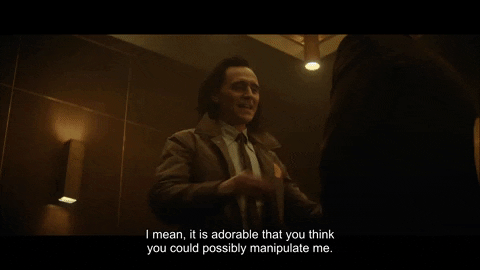
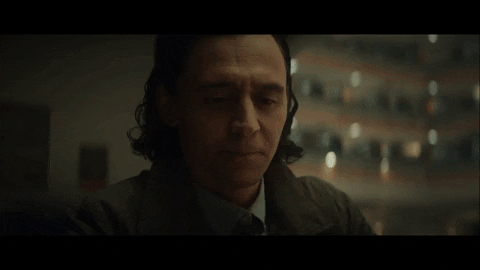
(If looks could kill indeed, Mobius)
Loki is supposed to drag Mobius out of his comfort zone at the TVA, to make him question things harder. Because it would seem “good people are never truly good”, so what’s behind the TVA’s Orwellian, Blade Runner-y scenario? And, even if they’re just really boring and full of paperwork, why should anyone dictate the proper flow of time? What about Free-Will, what about Chaos?
That is how this sort of narrative is supposed to go. Because Loki and Mobius are complete opposites in where they came from and who they wanna be, but at the same time, they’re much alike, as Ravonna even says. She accuses Mobius of being just as insubordinate and stubborn as Loki is. Loki was born and he wanted to be king because he thought (and was led to believe) it was his birthright. Now he wants to tell his own story more than ever ‘cause how dare the Time-Keepers predestinate Loki. Meanwhile, Mobius was created and all he’s ever known is the TVA’s order. But he is stubborn at heart and he craves humanity (the jet ski???), even if he believes he can’t have it because it’s too chaotic or simply not meant for him.
Mobius doesn’t see Loki as a villain (“no one bad is ever truly bad”?). He believes that Loki can be better. And Loki, if I’m reading this right, should help Mobius see that he’s, you know, kind of working for an authoritarian agency, what with “dictating the proper flow of time” and all that. (Yeah, yeah, I know. Multiversal war this, multiversal war that, but isn’t Doctor Strange’s next movie called Multiverse of Madness? Also, has anyone ever actually met the Time-Keepers? Or do all the TVA agents just blindly follow their orders? Maybe we’re bound to have a Multiverse by the end of this anyway.)
(And I’ve seen this narrative before. Faithless man meets angel, makes angel question Heaven’s orders, angel finds out Heaven is not that good after all, angel literally fall for the faithless man. In between, there is a lot of staring and standing too close and betrayals. It’s ridiculous how similar it is.)
So, where was I going with all of this…look, narratively speaking, from what we’ve seen so far, these two are a perfect match (and I’m not even mentioning Loki’s thing for older men in positions of power, which Mobius is completely aware of
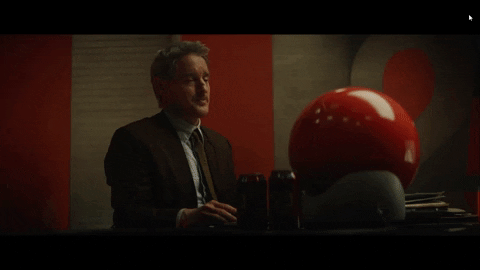
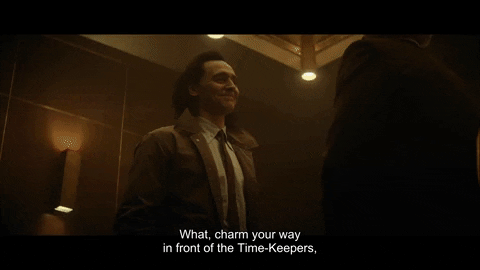
). But there is a big, big distance between the narrative pointing towards something and the creative (though, let’s be honest, probably the executive) powers following through.
Now, it wasn’t just the Religious Predestination thing that caught my attention here, no. It wasn’t even the Blade Runner parallels (I’m quite sure Loki has Galatians Syndrome, but that’s a whole other post). It was how similar the plot of Loki is to the plot of Where Mischief Lies by Mackenzi Lee. It caught my attention to the point that I’m nervously glancing at my book while writing this. But I don’t want this to be too long, so I’m gonna put that on a separate post.
Anyway, I hope at least some of this made sense, and thank you so much for reading through my rambling!
#loki#loki series#loki x mobius#mobius#the loki meta no one asked for#i know the gifs are really bad#i made them myself#i had never giffed before#yes i have a thing for blade runner#yes im going nuts with this narrative#lokius#mobius m mobius#i don't expect any of this to make sense#it sounded more coherent in my head
36 notes
·
View notes
Note
Thoughts on Star Trek AOS? (And do you think Kirk was on Tarsus?)
i have SO MANY THOUGHTS about star trek aos, so buckle up. brace yourself.
star trek aos is a terrible disaster and i love it SO MUCH. for me, star trek 2009 is still in that class of unreasonably pleasing movies like the mummy or stardust or jumanji: welcome to the jungle. what they are isn’t exactly top notch but you love them for being exactly what they are.
star trek aos is a star-studded fucking phenomenal cast of some of the best actors working today, which makes up for the very inconsistent writing and unfortunate low-level current of sexism.
literally where would i be today if chris pine could not make faces Like That. i honestly couldn’t tell you.
overall, I have quite a few bones to pick with JJ Abrams for setting up a star trek universe that is less Wacky Space Utopia adventures with liberal political commentary ranging from unsubtle to im-hitting-you-over-the-head-with-my-opinions-like-they’re-a-brick—
to this kind of overtly militarized action-hero adventure porn where one white man saves the universe from Scary People Who Don’t Look Like Us And Are Crazy. I also don’t appreciate what they did to Jim Kirk, turning him into this womanizing self-centered bastard who has to be in charge. I REALLY don’t appreciate the casual misogyny, what with the last of rank stripes for women and the gratuitous sex-ed up scenes and the way that Amanda Grayson gets fridged for man-pain and and and— you get the picture.
Or at least, that’s what they tried to do to jim kirk. and god fucking bless chris pine for being able to make facial expressions, because i firmly believe if pretty much almost anyone else had played Jim Kirk as written by JJ Abrams, that’s exactly what he would have been.
But because of chris pine’s acting, instead, most of the AOS fandom and I realized/decided that this “womanizing” version of jim kirk actually really really hates himself so much, most likely for trauma reasons.
we took that shit and ran with it and never really stopped.
zachary quinto is also like god tier casting. unfortunately the writers for the first two movies mostly gave him Anger as a primary motivator, which like, is not exactly how I would interpret Spock at all, but quinto played this Angry Spock so so well.
ZOE SALDANA PLAYS THE LIGHT OF MY LIFE, NYOTA UHURA, PERFECTLY AND THAT’S ALL I’LL HEAR ON THE MATTER.
john cho should be cast in everything ever he’s amazing and I love seeing him. this man has the range. hikaru sulu is the backbone of this fucking ship. this man wins the big damn hero award every single movie.
i still miss living in the same world as anton yelchin. i really, really do.
I also have found family feelings all over these movies, where these baby versions of iconic characters from the sixties are brought together too early to witness too much fucking trauma. harry potter references aren’t exactly in vogue right now, but there’s this one piece from a—well, actually, its a harry potter reference in an mcu fic i read years ago, now that i think about it, but anyway:
it was something like, there are some things you can’t go through with a person—like that mountain troll in harry potter—without becoming friends for life. there are some crucibles that will bind you together forever. and awful as it is, I think Nero and the Vulcan genocide were the AOS crew’s mountain troll. there’s no going back or separating, after that.
also I feel like there’s a ton of competence porn in this trilogy that i deeply, deeply enjoy.
star trek: 2009 and into darkness are both grimdark male power fantasy bullshit that only accidentally hits all the right buttons for me. I love them dearly but i know EXACTLY what they are, thank you.
star trek: beyond is a delightful movie with no real plot where our favorite crew are finally Adults With A Modicum Of Common Sense And Stability, instead of Disaster Children Angsting All Over The Place, and they get to save the universe with the power of excellent rock music and friendship. how cool is that?!? i wanna give simon pegg a high five for making this movie.
on a more meta note, what I find kind of satisfying about these movies is that—for all his many faults that i’m always happy to expound upon—JJ Abrams actually went for it. He Did That. He just made his own brand new timeline, killed jim kirk’s dad, then gave him an abusive uncle/step-dad, then literally destroyed one of the founding planets of the Federation, then he, in an iconic fashion, switched Jim and Spock’s places in the infamous “wrath of khan” death scene, so instead Spock gets to watch Jim die.
and you know what? I can forgive a lot of bullshit for that kind of poetic angsty fanfic plot detail.
every time uhura says, “an alternate reality,” in star trek 2009 just gives me chills. every time she says it, you feel the weight of sixty years of history and legacy sitting on these people’s shoulders, the weight of arguably one of the most popular TV shows of all time.
imagine, living in a new world you’re aware isn’t the one that was supposed to be. imagine that!
oh! and on the question of tarsus:
what I think is probably true irl: JJ Abrams has never thought that far ahead in his life. correct me if i’m wrong, but hadn’t he.....not even watched star trek.........when he made these movies............like lol i’d bet you this man didn’t even really know Tarsus was a thing. And even if he did, I don’t think he thought it was part of the new canon he was creating. AOS is much more self-contained than the serialized universe the original star trek was, so I don’t think that AOS was intended to encompass all those things, like tarsus, that we as a fandom like to obsess over.
what I personally enjoy: i love me some AOS fic that explores the ridiculous amounts of trauma that comes from living through a genocide. I think that, given we all decided AOS Jim Kirk hates himself, and engages in a shit ton of self-sabotaging and destructive behavior to cope, it’s a reasonable jump to think that at least some of that comes from some survivor’s guilt bullshit from Tarsus. And honestly, hit me up if you want recs for this, because boy do I have them. I’ve said it before and I’ll say it again: no one does angst quite like AOS!Jim Kirk.
what I believe wholeheartedly: this is like Schrödinger's Plot Point, okay, it both exists and doesn’t exist simultaneously. it’s easy to read tarsus into some of jim’s behavior, and it’s easy to read none of it in, and both of those choices are valid. go with your gut, go with what makes you happy, go with what you think makes sense. This is where fandom lives, in these little details that fall through the cracks.
anyway WOW did I talk a lot. those are at least some of my star trek thoughts. i do have others, but i’ve expounded on them before on this blog, and y’all don’t need me to repeat myself
ask me my thoughts on ______
#star trek#aos star trek#jj abrams#ask meme#actually i also had the tarsus convo with a mutual recently#and like 99.99% of my fandom opinions it boils down to: You Do You Babe We're Doing This For Fun#long post#(oops)#lupanymeria
83 notes
·
View notes
Note
Didyme?? What are your thoughts, please I'm dying to know!
Oh boy, I’m glad you asked, but you probably won’t be once you see the epic I’ve spawned now that you’ve given me the excuse. (But really, thank you so much for asking!)
My thoughts on Didyme can be separated into two thematic chunks. The first has to do with out-of-universe world- and character-building -- namely, I don’t believe Meyer had this specific “Aro murdered his sister and that’s why Marcus is Like That” backstory in mind while writing New Moon (although she probably did in Breaking Dawn). The second is just pure speculative fun, because based on what Meyer tells us in the illustrated guide and a foundation of some meta that I personally agree with, we can draw some...interesting conclusions about Didyme (and Marcus) as a character. (Or at least, we can if you’re a cynical harpy like me. Which I guess is a content warning about negativity incoming, but the negativity is more about Meyer’s logic than Didyme as a character.)
What I’ve ended up doing is answering you with the first chunk, regarding worldbuilding and such, because I’ve truly outdone myself with the Verbosity. (Like, the second chunk has sub-parts now, what the fuck.) But I’ve nearly written it all, and I’ll follow up with part two very quickly. So. LET’S DO THIS.
Didyme, Part 1: What Backstory? (Or, We Should Have Heard About Her in New Moon)
(relevant Kate Beaton comic)
This is a great time to talk about Meyer and her backstories, because @zzinvolterra has already done a chunk of the work for me with this post, with some excellent additions from others, and @panlight has another great post with replies going in a similar vein. The common theme of both is that Meyer most likely came up with the bulk of her characters’ backstories after the fact, otherwise some of it surely would have come up in the books themselves. Didyme, in retrospect, is glaringly absent from the books, particularly New Moon. It makes the timeline of her backstory’s creation, as @zzinvolterra succinctly put it, “a bit sus,” and I said as much here.
Now, I get that not every background detail about a character has to make it into the books -- it would be clunky, it would fuck with the pacing, and when you’re already dealing with a very limited narrative viewpoint like Bella’s, it doesn’t always make sense to include those tidbits unless they directly concern what’s happening to the viewpoint character.
Didyme’s death, though, and its impact on Marcus, are absolutely relevant to the plot of New Moon. The story of one of the three Volturi leaders, one of the most powerful vampires in the world, rendered a mere husk by the loss of his mate -- this sounds like the kind of cautionary tale that many vampires, and especially the Cullens, would know.
Plus, considering Edward supposedly fucks off to Italy to beg for death because he’s lost his ~one true love~ and there’s no point in living anymore, and also considering Victoria is murderous with grief over James and hunting Bella down with single-minded focus on revenge...I just...there are parallels here, you know? Like, these are some significant plot beats that could be reinforced and given special poignancy through the tragedy of Didyme and Marcus. I mean, am I crazy, or was this not a huge missed opportunity?
If Meyer had Didyme’s murder in mind while writing New Moon, she could have had Alice bring it up to Bella on the plane to Italy, in order to illustrate to Bella (and the audience) the profound grief vampires experience when they lose the ones they love. It’s a grief they can’t forget, because they can’t forget anything, and that grief is the dark side of the strength and constancy with which vampires love their mates. As much as the subject is likely verboten in Volterra, I think the loss of one of the leader’s mates is a story that would have survived among some vampires, and it’s conceivable that Carlisle (and therefore his family) would know at least that Marcus had a mate and that she died -- although nothing detailed, because if anyone thinks too hard about this it’s probably obvious that Aro was behind it.
Personally, I think it was a mistake to not mention Didyme’s death and its impact on Marcus at the most relevant point in the series. Hell, if anything, Meyer could have used Bella’s catatonic state of grief after Edward left as proof of the ~profundity~ of their love by comparing Bella’s grief to Marcus’ -- considering the Romeo and Juliet references she dropped like anvils throughout New Moon, that seems like something she’d have pounced on. Because of the omission, I tend to think Meyer came up with it after the fact, which brings me to one more note on the out-of-universe aspect of this: I also believe Meyer only came up with this backstory to further reinforce how eeevil Aro (supposedly) is and how terrible and corrupt the Volturi (supposedly) are. She really scrambles in Breaking Dawn to justify Edward’s conclusion that the Volturi are Bad Hombres and want nothing more than to destroy the Cullens. (He’s actually full of shit, but my view that the protagonists are Meyer’s mouthpieces and that she isn’t subtle at all about what she wants us to believe is a whole other subject.)
And you know, I can accept that Aro murdered Didyme -- but I don’t have to take it at face value. Which means it’s character analysis/headcanon time, so coming soon, like within the hour if I can get myself to shut up -- is Part Two.
#twilight#twilight renaissance#twilight meta#didyme volturi#aro volutri#anon this is only a scant preview of what you've wrought#i stared too long and the twilight abyss gazed back#zzinvolterra#panlight#you are both wonderful and your posts are excellent#also i edited this a bit to soften it -- i was worked up at the time
33 notes
·
View notes
Note
of all the things they could make mickey and ian fight over, why are the writers going with 2 so OOC storylines in the final season? the show never framed ian as seeing mickey's illegal income as not "real" work before. and mickey was never the slacker type, so why now? and mickey would never vague about monogamy. i'm so confused. if they gotta fight, why not over something in character and meaningful. this just feels like writers being mean to the fans, making us sit thru all this nonsense
Hey! Thanks for the ask. Made my (very weird and stressful) day.
I’m going to be disappointing right off the jump and say that I don’t actually think any of this is OOC, per say. But. In GENERAL. Shameless is not the show it was. I think this is very normal for long-running shows. Take Friends: When you get into the back half of that show’s extensive catalogue, is starts to feel like the characters are a Xerox of a Xerox. Early season Monica is a bit OCD, and a clean freak who loves to be in charge -- but she’s also warm, and hospitable and emotionally available to her friends. Late season Monica is often a coked-out squirrel-woman who loses her mind if someone moves a pillow. That’s quality isn’t out of character, but it’s no longer being balanced with the warm and supportive woman we initially met. I think a bit of that might be “we already know you either like or hate Monica, so we’re just giving you the stuff that’s funny and/or dramatic. We got 22 minutes and six characters and we don’t have to build that other shit anymore.”
I think that’s happening with Mickey and Gallavich. And I don’t think that’s weird for a) a show that has run this long and b) a character who was gone and then returned. They are giving us a Mickey that has always existed -- unbound by traditional manners, aggressive, blunt and obsessed with Ian Gallagher -- but we aren’t getting much of the Mickey who curls up with Ian at the worst time of his life and kisses his forehead. We aren’t getting all the verbal confirmation of Big Feelings they gave us when he came back in season 7. We aren’t seeing Ian and Mickey as a team, which is a big part of their mid-seasons dynamic. I think that makes people feel like these arguments are OOC, when they’re arguably reasonable issues, but aren’t being given a ton of nuance, or balance.
Aside: There’s some balance in how the actors are playing the intimacy and the physical affection. The little touches and kisses are appreciated by me.
So to dig into the OOC stuff -- first of all, it makes total sense to me that they’d have issues about the role crime plays in their lives together. I love that Ian never gave a damn that Mickey is a straight up criminal. But every time Ian lost Mickey, it was because the law intervened. When Mickey is not incarcerated, he’s with Ian. Ian is no longer 16, no one is a juvenile offender, Mickey was given a devastating sentence in season 6 -- 16 years -- Ian was 18! That was his entire living memory, if not more. They are married now, against considerable odds, and I completely understand why Ian doesn’t want Mickey to risk going back to jail.
Likewise, I get why Mickey doesn’t want to do what Ian is doing. Mickey does not have the temperament for minimum wage jobs. He has a longstanding history of thinking it’s absolute bullshit to work hard for no money. Particularly when he’s smart enough, skilled enough and ballsy enough to make a LOT of money in an afternoon just by spotting an opportunity.
Mickey has never SAID this on the show, but in canon we have seen him go to prison four times. Once, because Ian’s unhinged spurned groomer shot him; once because Mickey CHOSE to headbutt a cop so he could go to prison and avoid his dad; once because Mickey was consumed with a need to avenge Ian; and finally because Ian got himself tossed in prison, so Mickey CHOSE to join him. If Mickey has confidence that he won't go to prison if Ian isn’t a factor... Not the craziest idea.
So -- writers spitballing ideas for Gallavich conflict? I think that’s a pretty good one. Two clear sides that both have merit.
I’ve already written a bit about my thoughts on the monogamy issues... first, I’ve always figured they were monogam-ish, to reference Dan Savage. They are faithful to each other while they’re together, and when they are separated (usually by prison!) they aren’t. This isn’t the first time Mickey has voiced a lack of interest in being monogamous -- most notably “Great. Now we’re in a horror movie.” Mickey isn’t a traditionalist and I don’t think he feels like this is a make-or-break issue. But MOSTLY?
MOSTLY.
I really and truly believe what I’m about to say...
Mostly Mickey wanted to do what Ian wanted.
If he legit didn’t want monogamy he wouldn’t have tried to cheat of Ian’s paper. He didn’t like that “write it down and flip the paper” game. He wanted to match Ian’s answer. So he took a guess and he was wrong about what Ian -- who had literally just told him he found the concept of the rest of his life overwhelming -- had written.
This is my head cannon:��I think he liked that Ian wrote down monogamy. This is not my head canon: they are SUPER sweet to each other in the next scene. I am not convinced that the monogamy debate is going to be much of a thing beyond that scene. And I understand that, for a lot of people, that scene was extremely unpleasant. To me, personally, it made sense for it to come up. But I think it’s settled. I think they’re done with it.
The one place where I’m like “What is this?” is the slacker stuff. I mean, I can meta why Mickey might be afraid of failure or whatever, but it’d be mostly head cannon. They haven’t given us a ton to build on there. The best we got is “Stop disappointing the people you love!” being what motivated Mickey to do something he didn’t want to do. But Mickey was right, if he thought that interview was going to be a disaster. Mickey knows himself and he is painfully aware of his limitations.
As for why are the writers DOING this? Well. Ok. Here’s what I think it is:
1. Story is conflict. So they needed one. And “struggle to adjust to marriage” really isn’t a bad one. Specifically, figuring out how to be married when you have no role models and have a few social strikes against you is a good one.
2. The writers are amused by Gallavich fighting. They think it’s entertaining. And while there are a lot of people out there for whom Gallavich is EVERYTHING, Shameless’s viewership is also made up of people who think Frank is hilarious. No one ever send me an ask about why Frank is hilarious. I will not be able to figure that one out and the research might kill me. We definitely don’t all agree on what is and is not funny.
3. They’re going somewhere with it. At least a little.
I don’t KNOW three is true, but here’s something I believe about John Welles. I think he’s a biiiiit of a sap. I think he probably wants to leave each Gallagher with something nice. I don't think his plan it to send everyone off on an ice floe to freeze to death. So I think (hope?) that what we’re going to see is three (maybe four?) episodes of Gallavich At Odds and then I think we’re going to move into them trying to work together to make lives together. And they will probably still fight, because that seems to be part of the Xerox of a Xerox of Gallavich. I’m sure many people will find that cringey and problematic and annoying -- but I also bet we get a few moments we love, here and there.
I don’t think they’re trying to be mean to the fans, but I think it’s serving 8 characters ... Nope. 9. (I forgot Frank. I always forget about Frank.) ... and we aren’t going to get the depth and breadth we want. And most of that will be on the side where we see Gallavich loving each other, because at this point they expect us to KNOW that. And some of it’ll be Mickey’s internal life because they tend to focus on the Gallaghers. But I do fervently hope we get a little more of that other side of the coin. Because I absolutely agree that one side is more fun than the other.
63 notes
·
View notes
Note
Godddddd I'm so upset that I dislike yen this much, doing main quests in skellige and Freyas ppl were doing stuff and she again disrespected other cultures with Geraly being against, "I may be inhumanly beautiful" I know she's meant to be confident but wowww. She's not confident and worried for Ciri she just comes off arrogant and selfish and vain. Like, fuck.
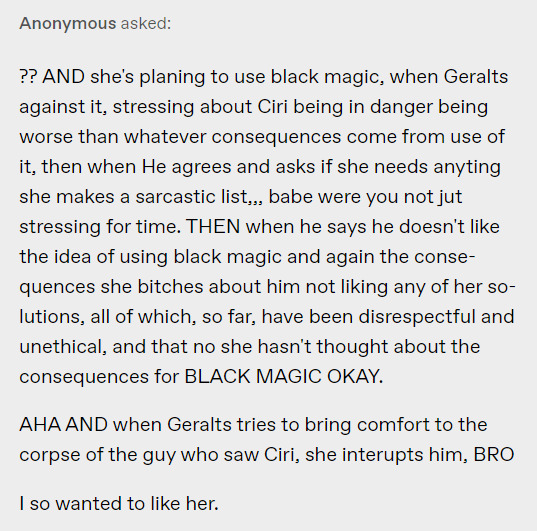
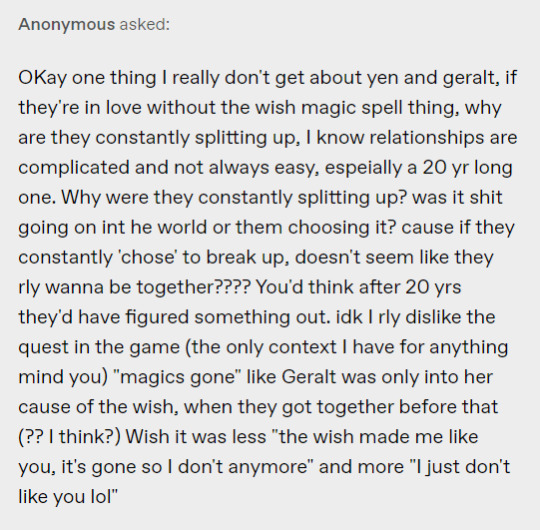
The ultimate mood, anon. My Witcher fandom life would be so much easier if I enjoyed Yen ... but I just do not lol. Remember how I mentioned that things were going to get even worse than her stealing and using a potentially dangerous artifact? Yeeeaah. She also resurrects Ciri's friend to torture him for information, all while destroying another sacred garden to get the power to do it! It's not even a "She's so evil and I love it 😏" situation for me because the game tries so hard to convince us that she's still The Best. Geralt's sexy soulmate, Ciri's adoring mother, the baddest bitch around who gets things done and does it with an effortless confidence... all while ignoring how horrific her actions and attitude are. Oh sure, other characters speak ill of her at times, but considering how much Geralt is written to adore her, no matter what you choose, that's all undermined. I love morally gray/evil characters, but I've never enjoyed them when the text refuses to appropriately acknowledge that side of them. Nothing is more frustrating to me than a story that frames disliking a character as the unambiguously wrong thing to do, especially when the text is piling up reasons to dislike them and, as a result, ignoring or shrugging them off their actions as not that bad. Yen is a rather extreme example of that for me. Despite her attitude, her choices, and other characters outright going, "Why do you like her?" the story as a whole works under the assumption that it's correct to like her anyway because Geralt loves her. And he loves her for... reasons.
They do meet before the wish, but only just. Major "The Last Wish" spoilers in this paragraph, so feel free to skip. Basically, Geralt and Dandelion run into trouble with a djinn, he goes to Yen for help since she's a sorceress (first time meeting her), he instantly falls for her because she's gorgeous and such (there's an elf there who is also madly in love with Yen. Men just... fall for her, instinctually), she heals Dandelion, Geralt agrees to pay her, but Yen has already decided on the payment she wants. She takes control of Geralt's mind and forces him to attack the town to seek revenge on those who have insulted her, resulting in him waking up in prison awaiting execution for "his" crimes. Meanwhile, Yen has gone after the djinn for herself because power/trying to regain her ability to have a kid. Geralt escapes, finds her failing to master the djinn (an attempt which btw has endangered the whole town) and despite what she's done to him, Geralt tries to get Yen to escape with him. She refuses, set on capturing the djinn even though it's obvious she can't. So as a last resort he uses the final wish to bind their fates together, saving Yen from the djinn in the process. Aaaaaand then they have sex.
So yeah, their rocky relationship is one of the main reasons why I can't enjoy Yen. For some their tumultuous history is evidence of realism, for me it's evidence that they're not actually very compatible and they're only together because a) that's the fantasy trope: protagonist men get together with the hot sorceress and b) because the magic is literally ensuring that they can't escape one another. I mean, canonically their fates are tied together by magic and canonically they spend about 20 years swinging between passionate love and fearsome fights... but there's supposedly no connection between these two things? No chance at all that they keep coming together because magic is drawing them rather than because they actually want/should be together? I wrote a meta a while back about the short story where they meet, which includes a present day scene where Geralt is criticized by another character — Nenneke — for running out on Yen. Thing is, he tries to explain that he left because she was "too possessive" and this is... flat out ignored. By both Nenneke and the fandom. There's a strong trend of ignoring Geralt's words in favor of a pro-Yen interpretation of events. He says he left because she was too possessive and she treated him like ____ — he's not allowed to finish the sentence and say what she treated him like because Nenneke interrupts him, saying she doesn't care about his version of events. Major yikes imo! She turns a claim of being possessive into Geralt not being man enough to stick around. The fandom likewise turns this into a case of Geralt getting cold feet and running out because he's a bastard who hates commitment. Likewise, Nenneke and the fandom claim Geralt is trying to get Yen money as a way of appeasing his guilt for leaving, he claims he's doing it simply because he still cares for her — even if he doesn't want to be with her — and knows she needs it. Geralt's words are frequently dismissed, in the same way others characters' opinions of Yen are dismissed. Any mark against her is treated as either a lie, or a convoluted claim that they don't really know her... never mind that an understanding of why she may act this way doesn't excuse the behavior itself. (Plus, the whole "Yen had a horrible upbringing, so of course she struggles being kind" perspective always fell flat to me when so many, including witchers, had horrendous upbringings too. The whole point is this world is a mess and most everyone suffers). It's supposedly true love, yet if someone came up to me and went, "I magically tied my fate to this woman to keep her from getting herself killed and we've spent the last couple decades having what many would term a rocky relationship, to put it kindly. I left once because she was too controlling. She once cheated on me. I likewise hooked up with others during our frequent breakups. A mutual friend used magic to get me to have sex with her — also while my lover and I were broken up — and though I view it as a dumb decision I'm happy to forgive her for, my lover is ready to commit murder because again: possessive. A lot of the time we're only a family because of our daughter. I once thought she'd horrifically betrayed us both. She didn't, but it says something that I was so ready to believe it, huh? Hmm? Permanently separated? Of course not! I love her. We're destined to be together after all :)" I'd be like, "Uh... you sure about that, dude?"
Not that Geralt doesn't make his fair share of mistakes in the relationship — he absolutely does — but I don't think it helps his case that he's immature in other ways and, frankly, that he's a very strong, badass witcher. It's easy to turn the hints we get about their relationship into a simplistic "emotionally naive man can't give the poor woman the commitment she wants" situation. Given Geralt's status as the badass fighter of the tale, it's likewise easy to dismiss his admissions of her being "possessive" and his general discomfort. He's the man. He's the witcher. If he's making any claims about how Yen isn't treating him well, they must be excuses, or exaggerations, because real men, especially physically powerful men, would do something about that — a something that's not sneaking out in the middle of the night. A lot of people read Geralt leaving as the ultimate proof that he's an immature bastard who doesn't deserve her. I read him leaving and think, "What were you trying to get away from? What was going on that made you think you could only leave by sneaking out without a word?" To me, that doesn't read as someone who felt safe, comfortable, and respected enough to do anything but slip away and try to wash his hands of things. And I'm not just pulling this "Geralt is at least somewhat afraid of Yen and isn't comfortable establishing boundaries with her" reading out of my ass. When Yen wants Geralt to kill the golden dragon for her and he refuses, saying he doesn't care anymore, his thoughts are:
He expected the worst: a cascade of flames, flashes of lightning, blows raining down on his face, insults and curses. There was nothing. He saw, with astonishment, only the subtle trembling of her lips. Yennefer turned around slowly. Geralt regretted his words.
And everyone is like, "See! Yen has improved so much. Geralt nearly made her cry, but she's supposed to be the bad guy here?" Meanwhile, I'm going, "Uh... anyone want to unpack why he expects fire, lightning, insults, curses, and blows to his face for telling her no? Why he's astonished that she wouldn't use her magic against him? Anyone think that Yen refraining from attacking Geralt when he refuses to murder on her command is a pretty low bar? No? Just me?"
Geralt and Yen's relationship makes me uncomfortable and a great deal of that discomfort derives from how much of the Witcher fandom shrugs off the fictional warning signs. I mean, I post primarily about RWBY. We watched a man in that show try to sneak away with his kids when his villainous wife planned to use them for a eugenics plan... and the fandom still blames him for that, refusing to admit that he was in an abusive relationship. Because that doesn't happen to men, right? I'm not saying it's the same for Geralt and Yen, simply because they are written to be soulmates. An abusive relationship was, quite obviously, never the authorial intent. However, I am saying that the a "This isn't a healthy relationship" reading is there, it exists as an interpretation, and both the story and fandom's tendency to dismiss it is something that hasn't helped me enjoy Yen's status as an otherwise well written, complex character. Their equality supposedly stems in part because they're both so flawed, yet each time I see a list of Geralt's supposedly equal faults they're... lacking imo. "Geralt bound himself to Yen without her consent." Yeah, to save her from dying from the djinn she was trying to enslave, after she refused to leave, while her actions threatened a whole town. "Geralt ran off without a word." Mmm hmm, anyone care about why? And my personal favorite is a scene you may not have gotten to yet (or may not get depending on your choices), but suffice to say, Yen is supposedly justified in physically attacking Geralt if he dares to challenge her in any way. That's the main takeaway across the fandom: If Yen is pissed off, you must have done something to deserve it which, in the relationship deliberately written to be "stormy," is something that sets all the alarm bells in my head off. Honestly, it kinda makes my skin crawl to go, "Geralt didn't deserve that" and get responses back of, "Yeah he did because he [insert basic human action here]." The Witcher world is hard and cruel, absolutely, but that doesn't mean I personally enjoy seeing an equally messed up relationship presented as something that's enviable in its flaws. "That's actually true love because the magically bound man who often expresses discomfort with his lover, written by a male author with a very iffy perspective on women, says it's true love." Crazy theory here, but... maybe it's not?
Idk, lots of rambling on my end tonight! For me, Geralt/Yen reads as something rather tragic which, in a canon that unironically upholds the relationship, and in a Yen-adoring fandom, doesn't make enjoying her character any easier. I keep coming back to Witcher 3, the comics, the show, even the books going, "Maybe I'll like her this time?" but nope, still trying lol.
13 notes
·
View notes
Text
So I am literally just speculating but something does not sit right with me about this last season. It doesn’t sit right with a lot of people but here’s my thing:
-knowing this is going to be the last season (I don’t know when they announced it but it was pretty early) and you went in, you started plot lines in s14 that would continue into s15 that just... didn’t go anywhere.
-you brought characters in and back for storylines that only fit to further the boys’ plotline, which would have been fine if you didn’t insist on killing them right after when the fandom has been asking you for years ‘please stop killing my faves’
-one of your actors, who’s been trying to convince you for years, goes full down knock down drag out for one whole ‘I love you’ scene to canonically make him gay (which you’ve been denying for years and made him sleep with women) and you decide to pepper little things throughout the entire season that shows Cas and Dean feel more for each other than just friendship. And instead of making Dean reciprocate, you kill him because of literary symmetry that stopped being relevant to the story in s4 or s5
-you then started a bunch of plot lines (and here is where it REALLY gets me) that were good this season. That were leading you up to the finale. And then you got to the middle of it. AND IT ALMOST SEEMS LIKE YOU JUST DIDN’T KNOW WHAT TO DO WITH YOUR CHARACTERS OF 15 YEARS SO YOU JUST DECIDED TO THROW OUT AT LEAST 9-10 YEARS WORTH OF CHARACTER GROWTH IN ORDER FOR IT TO REALLY ALL TIE TOGETHER ( I mean, come on. They did a whole ass episode bout why being normal sucks and then all they wanted at the end WAS TO BE NORMAL I CANT EVEN THIS SHOW WAS EVERYWHERE THIS SEASON)
-and then you just LITTER the season with meta and foreshadowing (Dean and Cas in purgatory, Dean and Cas ‘what’s real about any of it?’ ‘We are’, Sam and Eileen not knowing if it’s real and breaking up because of it ((which didn’t even matter come sam wanting to get his dick wet but I digress 🙃)) and then you have Garth who got to live, his episode is ‘the heroes journey’ and he ends up safe, happy, still settled with his wife LIKE A MIRROR FOR OUR BOYS) and then you just DECIDE THAT NONE OF THAT MATTERS
-and then you did exactly what we asked you not to do for years. No matter how many times we all said ‘we want to see the boys happy, together, all three of them. We want them together as a family, even Jack too and Claire and the wayward sisters, we literally wanted everyone safe, happy, alive.’ So it doesn’t matter which ending they were going to give us, it was always going to end in a way we never wanted or asked for. They literally heard... okay. We kill the boys. And then everyone, even if they aren’t dead yet... will be in Dean’s heaven. That sounds right. EXCEPT THE PEOPLE THAT WE WOULD HAVE WANTED THERE, THAT WOULD HAVE MADE IT REDEEMABLE FOR US (Samantha Ferris, Chad Lindberg, Osric, etc) WERE NEVER GOING TO BE THERE. it was going to be filled with his abusive father, a mother that we fleshed out and mourned for a second (or third I can’t remember) time, a vessel of the guy that very much tried everything to get away from you and your brother and this life and was super not okay with it and only did it to save his daughter but sure, he cares about you, and the actual fucking band Kansas. Who isn’t even dead!
So you did that. You did all that. And so here’s where i absolutely eat fire. Besides wanting to know why on earth this was done to our show after years of asking them not to, I want to know why it nearly felt like they were setting us up for another season. They knew that s15 would be the last way before they started writing. They had the time to write this well thought out ending and they could have taken it so many ways. They could have closed a loop, they could have tried again with the spinoff as I’m sure it would be phenomenal now. But everything they did, every plot hole and plot line they opened and never closed again... feels like it should have been a set up for s16. Now maybe I have too much anger and this was done accidentally, but I don’t think so.
Now I want to add a disclaimer that there a no proof here, I’m speculating, of course. And there were never rumors about a s16. But with the way the season went, I can’t help but wonder if someone had already planned for one. And when j2m said no, we’re gonna hang it up, it fucked a lot of peoples plans of this show being their cash cow. Now, it’s completely possible that the writers are just bad as this show has given us some doozies before. maybe they recycled plot had they been planning for a s16 but Cas’ declaration scene was the first thing to be written so... I doubt that.
But here’s my thing alright, and if you’re already here with me, guys, stay with me: why would you leave all these open ends knowing there will be no other season, throw away all this character growth you’ve been writing and telling the fans about for 15 years, and do exactly what the fans asked you not to and leave them separated and stuck on blood when for years you’ve been telling us ‘family don’t end in blood’?
It was a fuck you. It was a big fuck you to everyone involved. And I don’t mean just to the fans, which is exactly what it was to all the people that asked for them to end up alive and happy (so most of us). Again, I say, I’m speculating but it sounds to me like producers, show runners, went out of their way to make this season not make any sense. To make it bad (the fight with Dean and Cas having been written more sad than angry, the way we had an entire holiday episode for the first time in a while but without Cas, the way they literally told us the ending in beckys scene and then had the nerve to make fun of the GOT ending, I won’t even mention saileen again, the way they knew it would only reach about 30% as a good ending). It sounds to me like someone was being a petty bitch. And especially towards Jensen and Misha. Going back to look at this season, those two boys were put through the ringer and were put at the forefront of our screens and made to go outside of their character especially in the last few episodes, and yet it was all a plot device for Sam to live on.
Jensen who went tooth and nail for his characters ending and hated it (even the original one because I’m pretty sure it was pitched to him precovid) got a car ride for the send off to his character. Misha who fought for Cas to be queer for years got to die and have 12 years of love be for nothing (as dean dies a week later). These are the two that have been trying to tell the show who their character really is for years. If you go back and watch panels, Jensen has been trying to tell them for years where he thought his character should go and he said multiple times that it got swept under. He said he left the meeting feeling drained and they told him he was too close to the story. Bitch, he’s Dean!
I can only speculate that Jared didn’t have as much back and forth with the writers and show runners, but I don’t actually know. I’ve seen a panel in which he said he’s done that stuff but they’ve literally either not listened or done the opposite so I have a feeling he stopped trying so hard after a while. But I can take a guess, after hearing what Jared said at his panel about the ending being good and right, that they brainwashed him just a little to believe that this is the ending they’d always been fighting for. They say forget AKF, forget pretty much all the growth you’ve had for the past few seasons and he had to go along with it. I can also speculate that with the new show coming out they were like ‘shhh this will be good for your ratings’.
TL; DR: I think the show runners/ producers purposefully set us up with a bad season because the producers/show runners are petty bitches and they broke our boys to do it.
57 notes
·
View notes
Text
How to Write a Horror Story: The Magnus Archives
This post is kinda weird since most tumblr fandom content is based on the assumption that Everyone Has Seen The Thing, but since this is a transcript of a video essay, it’s more broad.
I might link the video in a reblog since, you know, tumblr doesn’t like links.
Anyways, here’s the post:
Hello Jon, apologies for the decep-
I’ve seen a lot of mystery shows in my day, and some supernatural shows, and the common thread between them is that they kind of...fall apart as they go on.
Obviously, this is a generalization and I haven’t seen every mystery show or every paranormal show, but it’s a pretty common problem.
At this point in pop culture criticism, it’s basically common knowledge that these shows fall apart due to a lack of planning. If a mystery series is making shit up as it goes along while trying to surprise the audience, it’s going to stop making sense at some point. And if an episodic paranormal show is constantly trying to up the stakes, eventually it’s going to become absolutely ridiculous and stretch the audience’s suspension of disbelief past a breaking point.
Other people have already talked about this stuff to death, but today I want to talk about a paranormal mystery show that actually succeeds at what it set out to do.
The Magnus Archives is a podcast written by Jonny Sims and directed by Alexander J. Newall. It ran from 2016 to 2021 and it’s...really really good. It’s an episodic horror story, taking place at the fictional Magnus Institute where the head archivist reads various statements about people’s encounters with supernatural entities. It’s got it all; scary stories, mystery, an overarching plot, office comedy, office romance, office tragedy, a villain that’s making straight men everywhere question their sexuality, and an overall really solid structure.
If you listen to the Q+As put out by the writer and director, you’ll hear them talk about how they planned the series from the beginning, setting up the layout for each season. Some things were definitely changed throughout the actual writing process; that’s just inevitable and necessary when you’re working on a long running show, but in a general sense, they knew where they were going. But, writing a good story doesn’t just involve knowing where you’re going; it’s about executing whatever plan you have effectively. And I think the execution of The Magnus Archives is pretty brilliant, so I want to talk about it.
And for the record, I said “brilliant,” not “perfect.” I do have a lot of criticisms of this show, and I’m definitely going to talk about those too, because honestly? Even the problems with this show are interesting in their own right.
Ok, let’s go.
Oh, spoilers by the way. For the whole plot. Whole thing.
Part 1: Horror and Mystery
Ok, so The Magnus Archives has two separate plots going on: the episodic stories that can be listened to individually, and the underlying meta plot. The former is where most of the mystery storytelling takes place, and it’s a really engaging mystery. It’s starts off slow, and almost undetectable at first. The main character, Jon, also known as The Archivist, is just reading out old scary stories that people have delivered to the Magnus Institute. Stuff like; a college student sees a ghostly inhuman figure asking for a cigarette, a woman’s fiancé dies and she finds herself trapped in an empty graveyard, there’s this goth kid who apparently murdered his mother and then skinned her? But she’s kind of still alive? What the f*ck? Hope we never see that kid again. Also, this “Jurgen Lietner” guy wrote a bunch of cursed books and Jon knows about this? Are more books gonna come up? And then you’re like, wait is the goth kid who killed that burn victim the same goth kid who killed his mom like 8 episodes ago? Holy shit the family of that girl’s dead fiancé FUNDS THE MAGNUS INSTITUTE? Did this famous youtuber meet one of the missing people from episode one? The goth kid is back and he’s looking for Leitner books? The name “Michael” has come up like 6 times? Are they all the same guy? I just—who the f*ck is Jurgen Leitner?
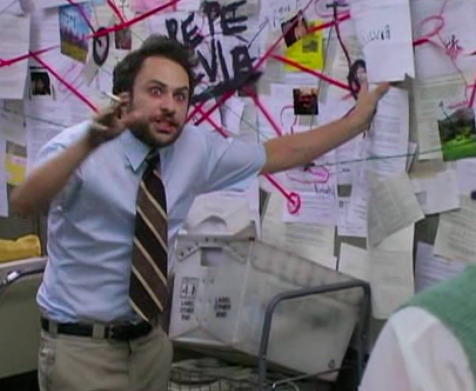
So yeah, as you can see, a lot of these stories connect in cool ways, and I’ve only mentioned like, 0.2 percent of all of those connections. Furthermore, these stories are told out of chronological order, and sometimes the same scenario appears in more than one statement, told from different perspectives. This asymmetrical storytelling and odd doling out of information creates a mystery that’s really interesting. It also makes for a great re-listen, since you can retroactively see what elements were set up before you even realized that they were going to come back.
The audio format contributes to this too; you can’t just see that the table from episode three matches the pattern on the box in episode eight. You have to pick up on clues that were mentioned and pay attention to what people are describing, and it’s highly rewarding when the pieces all start to fit together.
There is a bit of a downside to this though. Technically The Magnus Archives is a horror story first and a mystery second, and these two elements can mesh in weird ways.
The horror is element is really strong. Each story is completely different, sometimes focusing on psychological horror, body horror, or supernatural versions of more primal fears like heights, darkness, enclosed spaces, etc. Basically, if you’re afraid of anything, there will be at least one episode of The Magnus Archives that gets under your skin.
Jonny Sims can really sell his stories through both his writing and acting. He plays Jon, by the way, and plagiarized his own birth certificate for the character name. (For future reference, Jonny is the actor, Jon is the character). Overall, he’s really good at writing prose, and each narrator has a very distinct voice even though the large majority of the stories are being read by one character/actor.
Obviously not every episode is a bull’s eye. Sometimes it’s due to the subjectivity when it comes to what you as an audience member are scared of, and occasionally it’s just weird writing decisions. I’m thinking specifically of episode 21 where the line “the sky ate him” is said, and it is the worst line in the entire show. The whole goddamn show. That’s it. That’s the number one worst line.
But still, overall, the horror storytelling is incredibly solid, and some episodes even gave me brand new fears, like the unholy isolation of being in space, or the concept that someone you love could be replaced by someone completely different without you noticing.
But here’s the thing;
A lot of good horror is based on the absence of explanation. Most of the episodes that gave me the most visceral reactions of genuine terror come from the first two seasons, because that’s when the audience has the least amount of information.
For example, in episode two, a really terrifying coffin is introduced. It’s creepy, it reacts very strangely to water for some reason, and appears to compel people to try opening it. By the end of the episode, the audience never finds out what’s in that coffin and that is a good thing. That is a huge part of what made that episode so unnerving.
And then a few seasons later, we do find out what’s in the coffin, and to be fair the answer is both very creative and very scary, but it also takes a lot of the punch out of episode two.
No matter how f*cked up your thing is, it’s not going to compare to whatever the audience can conjure up in their own mind after such a creepy set up. This problem isn’t just stuck in this one scenario either; there are a lot of early episodes that, while still good, seem a lot less creepy in hindsight after you learn more about the scenario.
I don’t think it’s bad writing, but I do think it’s a double-edged sword. Jonny Sims even mentions this sort of issue in the first Q+A.
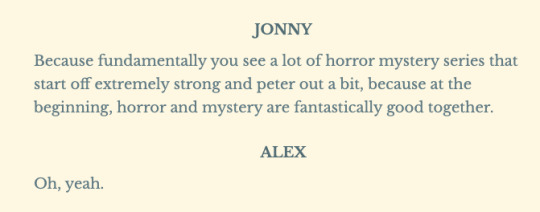
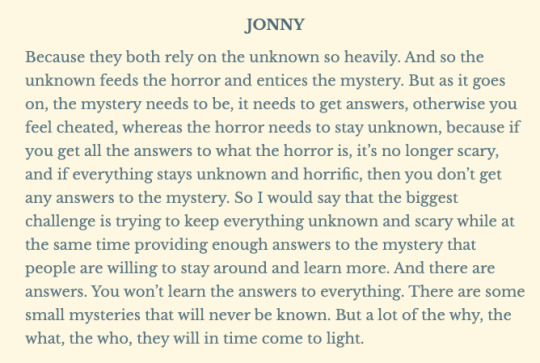
But yeah, to sum up; the narration is good, the ideas are creative, and seeing the mystery unfurl itself is deeply compelling. And for the record, the mystery elements aren’t of the Sherlock Holmes variety. It’s less about finding out who did the thing, and more about discovering how all of these individual points are intricately connected, pulling on each other as they move. Woven together like a... oh shit what’s the word? Gah, it’s on the tip of my tongue. Ah, whatever, I’m sure it’s not like a running motif or anything.
Part 2: Stakes
One of the main reasons I stopped watching Supernatural is that it devolves into complete f*cking nonsense. At the end of season five, the boys literally defeat the devil, and then the show...keeps going? Which would be fine. It’s also, largely, an episodic show, so if they have more creative ideas, they could definitely keep going with it. In fact, there are some post season five episodes that I thought were pretty good. But as they kept trying to outdo themselves with Bigger Bads, it got kind of difficult to suspend my disbelief. And the final nail in the coffin for me was the end of season nine, when Crowly basically points out to the audience that the main characters keep dying and coming back to life, so there are no stakes. The most-badest bad guy can always be defeated because some new Thing can just come out of left-field, and dying isn’t even on the table as a threat since people have tons of ways of coming back to life.
The Magnus Archives, while being a show based in the supernatural, notably doesn’t bring anyone back to life, even though some very beloved characters die. I say “notably,” because in the season three Q+A, Jonny even says, “We make a point not to bring people back from the dead in Magnus, I know it sometimes feels like that, but we are very careful to never actually resurrect anyone.”

Upon listening to this I said “oh my god, these guys are the only writers left who at least kind of know what they’re doing.”
Also, as far as plot progression goes, The Magnus Archives is lowkey structurally perfect in the way the threats escalate in the underlying plot; both in terms of destruction and power and in terms of emotional consequences. Season one starts off with one major threat that’s dealt with by the end of the season, season two reveals the main villain, season three lays out the grander forces at play, season four ends the world, and season five is about un-ending the world. The difference between season one and season five is vast, but how we got there makes perfect sense.
As for the emotional stakes, let’s talk about themes and characters.
Part 3: Themes and Characters
At the very end of season two, it’s revealed that the supernatural happenings in the Magnus universe are the result of entities far beyond our understanding. Since their existence is so fundamentally different from what we can comprehend, they interact with the world through cursed items, creatures, and humans who have dedicated themselves to an entity.
A lot of people read this as a metaphor for late-stage capitalism, and I am one of those people. A bunch of faceless entities exploiting humans through means of dehumanization and causing people to suffer because it feeds them seems like an appropriate metaphor.
While we’re on this topic, I do want to talk about Elias, since he’s the main villain of the entire series and also one of my favorite villains of all time. The Magnus Archives is a series that deals with a lot of moral questions and has a lot of characters who do morally questionable things, so one might assume that the villain of said series is, you know, morally ambiguous and sympathetic to some extent despite being “the bad guy.”
Nope! No stops, full bastard. It’s great.
He falls under what I’ve deemed the “unbeatable boss” archetype. He just doesn’t tolerate insubordination or resistance, and that combined with his lack of empathy means that anyone who crosses him is either killed or brought to heel. His power set is cool too. On the surface the ability to see out of any eye and read minds sounds useful, but not deal breaking, but the way he uses that power to manipulate people and anticipate threats...yeah, it makes him kind of impossible to beat.
He’s just...so evil and he loves being evil and every single f*cking thing he does pisses me off and makes me want to kill him. It’s. Great.
Anyways, I think Elias’s role as the central antagonist is what makes the capitalist reading so common. He’s the head of the institute, he’s wealthy, he’s powerful, and he dehumanizes people in ways that are both brutal and chillingly indifferent. He seems like an appropriate stand in through that lens.
I also love how voice actor Ben Meredith plays him like’s he’s trying to seduce the audience.
With all of that said, I wouldn’t call this the critique of capitalism a direct allegory or anything; in much looser terms, this could be a metaphor for any power structure that exploits humans. Organized religion or cults might be even more on the nose, considering there’s a lot of mentions of rituals and worship within the show.
But if we boil it down to its barest aspects and focus on the avatar characters, The Magnus Archives is a series about people becoming monsters. Or, at the very least, becoming worse versions of themselves. That can mean a lot of things to different people in a metaphorical sense; the tense relationship between desperation and morality, the eagerness to please at the cost of one’s own mental health, the psychological traumas that lead people down dark paths, and how personal choices can still be dictated and manipulated by outside influences. It’s kind of heavy stuff, but put into a digestible package through the show’s abstractions.
Well, for the most part.
There’s some debate as to whether or not Daisy’s arc was handled tastefully. While her demise and Basira’s character arc were clearly meant to condemn police brutality and the deeply corrupt system that allows it to foster, it’s still a weird subject to discuss in such a fantastical context, and there is a strange sympathy for the devil angle that can get kind of uncomfortable for some listeners.
Okay, stepping back from that for a bit, let’s talk about Jon and how he fits into this whole “people becoming corrupted” thing.
Jon has one of my favourite brands of character arc, which is one based in deterioration alongside growth. The most obvious way this takes form is his departure from humanity as his relationship with the Eye drives him to psychologically harm others, and he finds himself sympathizing more and more with the people he was afraid of, stating in episode 152 that anyone listening to his recordings might compare him to the other avatars that have had their minds and morals twisted.
Over the course of the series, he is repeatedly traumatized and the show makes a point that he is being both physically and emotionally scarred. These happenings are what drive his motivation for revenge in season five, and he even states that revenge is making him a worse person. As a character he’s constantly berating himself and his own monstrousness, much to Martin’s dismay.
That’s why the finale destroys me in the best way. Upon seeing that Jon has betrayed him and basically given himself over to the Eye, Martin asks “how much of you is even left?” And when Jon tries to reassure him that he’s still himself, Martin’s response is “how would you even know?” This cuts through me every time. Up until this point, Martin had consistently stood up for Jon and Jon’s humanity, even in the face of Tim’s doubt, Basira’s mistrust, Elias being cryptic, and Jon’s own self-hatred. This is the ultimate breaking point, the point where even Martin, the love of Jon’s life, doesn’t really recognize him. It’s brutal. Because at the end of the day, Jon is still himself; he’s a deeply broken person trying to make the right decisions.
We’ll come back to the finale later, but for now I want to talk about the romance.
Jon’s emotional growth throughout the series is largely tied into Martin. Martin’s the first person that Jon really opens up to, and this later grows into trust which then turns into a genuine emotional connection. On the flip side, Martin’s growth in season four is largely tied into Jon. Martin starts season four basically waiting to die, but Jon’s return gives him a reason to keep living, and he’s later able to recognize his own value outside of the pure utility of ‘you need to set yourself on fire to keep everyone else warm.’ Both of them give each other reason to push onward despite everything becoming more and more hopeless.
It’s a good romance. I wish the two had had a few more scenes together before the culmination, but it is built up over the course of four seasons and comes together in an utterly fantastic confession.
And yeah, the scene with Martin and Jon in the Lonely is cheesy as hell, but it is the highest quality of cheese. These are some gourmet nachos.
Umm, also kind of stating the obvious here, but it’s also pretty cool that the main character in this horror story falls in love with another man. You don’t see that a lot, and it’s cool that no one even makes a big deal out of it. It’s just a normal romance, but with two guys. It’s nice.
So, they go to Scottland, they hang out, they’re in love, Jonalias starts the apocalypse through Jon, the world ends, and season five starts!
...Let’s talk about season five!
Part 4: Season 5
At the very start of this post, I said that supernatural mysteries tend to get worse as they go along, and I am deeply sad to report that I don’t think that The Magnus Archives is an exception. It just goes downhill in a very different way than its ilk.
And, so we’re clear, I don’t think season five totally tanks or becomes unlistenable, it’s just, in my opinion, notably worse than the rest of the show.
As discussed earlier, it doesn’t fall apart due to a lack of planning; everything still makes sense, but the presentation has changed drastically. The episodic statements are no longer scary stories, but more like slam poems about the various hellscapes that Jon and Martin are trekking through. Honestly if these were published in a book of slam poetry, I would probably think they slapped pretty hard. I genuinely believe that Jonny Sims is a good writer, but as a podcast a lot of these statements just made me zone out. There’s at least four that I don’t even slightly remember. Myself and many others have noted that they just...aren’t scary, unless there’s a specific episode that really gets under your skin due to a certain fear or phobia.
To quote my friend, “it’s harder to feel a solid impact when the setting is literally divorced from reality. People would either go numb or insane to the point where their fears become unrelatable.”
And, to be honest, I think that this same surreal odyssey set up could have worked with a slight shift in narration. Two stand out episodes for me were “Strung Out” and “Wonderland.” Both of them show the tormented target actively trying to resist and interact with their tormenter, instead of just trying to escape or live through their situation. “Strung Out” is also more of character study; you learn about Francis’s life before the apocalypse through their interaction with the Web hellscape. Meanwhile “Wonderland” is just...f*cked, and you get to see Jon take the perspective of first-person Bad Guy throughout the whole thing, which is its own level of disturbing.
But the majority of episodes feel so abstract that I kind of forget the people trapped in them are supposed to be characters and not just concepts, so it’s harder to feel their dread and pain.
But I’m still here for the metaplot, the drama, and the romance. And when that’s good, it’s great! I think the final handful of episodes are really solid in that regard.
Buuuuuuut...
A decent chunk of season five is dedicated to the “kill bill” plot. Jon discovers he has the power to smite people, and while at first, he’s embarrassed about this, since he actively enjoyed killing Not!Sasha, Martin is super into it! He’s encouraging Jon to murder people.
This is actually the set up for a really good arc. As Jon gets more and more into his own avenging angel persona, Martin could get more and more disturbed by it so by the time they get to London, Martin could be really upset that Jon is so willing to wreak his own divine justice by killing or torturing all of the avatars.
And this does kind of happen. We do reach this end state, and it makes for a good final conflict, but the way we got here was borderline nonsense. Thematic gibberish, if you will.
Throughout the journey, Martin is clearly motived by a sense of justice; these people are bad, and so they should die. Whereas Jon is clearly more motivated by revenge; he only goes after the avatars that hurt him personally. At one point, Jon admits that maybe all of this killing isn’t making anything better, but just making him worse. Martin apologizes for egging him on, Jon absolves him by saying he started it, and then Martin’s like “I’ll keep my apology then.” This is the second worst line in the entire series, right after “the sky ate him.” And it’s close.
But it kind of feels like we’re back at square one. Jon is back to being ashamed of killing and Martin is still keen on his justice stance, but now just less pushy about it. The arc is basically half resolved at this point.
But then it doesn’t matter, because Jon kills Helen anyway. So, Jon’s back on his revenge/justice thing. Then what was the point of his earlier revelation? Why have that if it’s not going to matter and the conflict that was escalating still culminates with Jon leaning into the avenging angel stuff, and Martin being disturbed by it? It just makes both of them look like huge hypocrites! I f*cking hate it when they’re in the tunnels and Martin says “you weren’t meant to enjoy it this much,” regarding Jon’s smiting. Where did this come from?! Why didn’t you say this earlier? Third worst line in the series.
And yeah, I’ll say it; the boys fight too much in this season. I loved their romance up to season five, and their cute moments and more lowkey serious discussions are still good in this season, but God, they fight so much. And I’m not saying couples can’t have fights or tension, that’s just realistic and also stories need conflict to be interesting. Jonny Sims is on the record saying that balancing a healthy romance with the stress of a literal apocalypse was a priority, and I’m sorry, but I don’t think it’s well balanced. I’m just saying that sometimes it feels like they don’t even like each other and it really started to grate on me.
Maybe it would have been better if the beginning of this season was dedicated to charming romance at first, so we as an audience could better appreciate how strong their love is and how it’s truly being tested. But obviously that was never on the table—
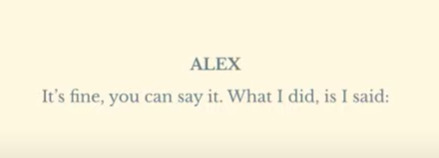


ALEX NO.
So, yeah, I have a lot of problems with season. I think it’s the worst one by far, even though there is a lot of it I still enjoy, including the ending.
As I mentioned before, the moment where Martin confronts Jon in the panopticon absolutely kills me, and Jon’s reaction kills me even harder. Throughout the season, Jon had largely been motivated by revenge, martyrdom, and the subconscious call of the Eye, and all three of those factors led him to his position as the pupil. He’s getting revenge against the powers, sacrificing his humanity to get rid of the Fears, and taking his place as wearer of the watcher’s crown. But all of this gets thrown out the window when he realizes that Martin is going to die. And not only is Martin going to die, Martin is going to die specifically because he loves Jon and refuses to leave Jon alone to die horribly. Martin had always been an underlying motivation for Jon, his “reason” as stated in episode 167, but now love as a motivator has come to the forefront, and Jon can no longer go through with his plan because of it. But at this point in the series, they’re both utterly doomed, and Jon concludes that the only possible chance they have of surviving, however unlikely, would be to sever the pupil of the eye, technically killing Jon, but maybe, just maybe, allowing them to escape with the Fears. Whether that’s meant to be literal or more ethereal is left unclear. Hell, maybe Jon’s just making it up completely and creating his own potential happy ending. It’s a pretty potent ending in emotional terms; Jon has to release the Fears and Martin has to kill Jon, and those are the two things they were dead set on not doing.
The Web, arguably the real main antagonist, basically won, and their manipulation of Jon worked. The destruction spread, and there is kind of a bleak underlying tone to that.
But at least this ending has some semblance of hope to it. I’m not saying that releasing the Fears was objectively the correct moral decision; the entire point of the dilemma is that there was no objectively correct moral decision. But, while Jon’s solution does have merit, it was also the most hopeless. I think dramatically, any one of the choices on the table could have worked if the writing was well executed, but thematically this one seemed like the perfect combination of grim and optimistic. Like, all of the evils that plague humanity can’t just be defeated forever and things could get worse, but maybe not. Maybe everything works out...
So yeah, The Magnus Archives...is a podcast. And it’s a really good podcast. Great, even. I can complain about season five all I want, but regardless of how that worked out, you can tell throughout the entire show that the people working on it were trying to tell a genuinely excellent story.
It’s good. Go listen to it. Even though I spoiled the entire thing and if you’re still here, you’ve probably already listened to it. Listen to it again.
19 notes
·
View notes
Text
Dark Cybertron Chapter 1: Welcome to Comic Event Hell
You know what readers love? When the stories they’ve gotten invested in over the course of a couple years get interrupted for some pseudo-crossover bullshit.
And you know what writers love? When the story they’ve been crafting over the course of a couple years get interrupted for some pseudo-crossover bullshit.
Did I say love?
Because I didn’t mean it.


“Dark Cybertron” was penned by John Barber and James Roberts, with collaboration with comic writer and artist Phil Jimenez, and was published from early November, 2013 to late March, 2014. Atilio Rojo, James Raiz, and Livio Ramondelli did the art, each responsible for scenes in specific locations, with Robert Gill filling in as needed. Alex Milne, Andrew Griffith, and Brendan Cahill would also contribute pencils to the first issue and the back half of the series. It was a celebration of the 30th anniversary of the franchise, and the second birthday of Phase Two... which went on for over four months, but never mind that!
Both "Dark Cybertron” and its preliminary materials were made to go alongside the Transformers: Generations toy-line, each issue being included as a toy pack-in with whatever character was being featured… or, at least, that was the plan. Sometimes it didn’t work out. Regardless, this storyline was created to sell toys directly, as opposed to the MTMTE/RID series being made to sell toys more through the power of suggestion. It’s a small distinction, but important, because it will help explain any lack of soul one may perceive while they read “Dark Cybertron”.
“But Hannz!” you cry out, reaching to grab me by the throat and shake me like a rag doll, because to you I’m merely a faceless voice on the internet. “Surely by calling this specific storyline soulless, you’re completely ignoring the very nature of this franchise that you’re almost uncomfortably invested in!”
To which I’ll say this: look, I’m pretty realistic about where my giant space robots came from; Transformers as a franchise would not exist the way it does without Ronald Reagan introducing the Free Market to literal children and fucking up how we interact with media for the rest of time. There is no ethical consumption under capitalism, and that rings especially true when I’ve got a Spinister on my bookshelf staring me down as I write this, that was likely made out of plastics which either involved blood oil or unethical labor practices, if not both.
However!
The choices of a company to have their comic license holders to cook up an entire plot that derails what they’ve already got planned out for toy tie-in comics is a completely different animal than what IDW had had going on up to this point. Phase Two had been about exploring different ideas that hadn’t been able to be explored during the war, and seeing what happens when you take away a third of the logline for Transformers G1 as a whole. Being a part of a brand of toys was almost inconsequential to how the stories were being told; even the Spotlights, which were also toy tie-in comics, had plenty of charm to them, if only because there weren’t quite as many constraints placed on the writers, and they were stand-alone issues.
Of course, being tie-in comics isn’t the only reason that “Dark Cybertron” is a bit of a slog, considering everything IDW itself was trying to get done within this storyline, but we’ll cover the publishing company’s/Simon Furman’s/Transformers’ tumultuous relationship with the concept of gender identity and expression later on, when it becomes relevant to the story proper. This point also ties into the interesting origin of Windblade, who we’ll meet in a few issues, and what happens when you let your fanbase have a taste of power and forget that people might like to see themselves represented in the media they consume.
“Dark Cybertron” is what ended up making me stop reading MTMTE the first time I tried it in 2015. A big part of it was because it forced the reader to need so much information from RID and even events prior to Phase Two, it wasn’t very fun to try to parse what was going on, on top of the writing beginning to flag because of obvious constraints to what Barber and Roberts could actually do, both within their deadlines and the rules put in place by their higher ups for the event.
“Dark Cybertron” is the result of the sort of executive meddling that kills reader enjoyment by requiring writers to cram their two worlds together as quickly as possible, without the option to go for nuance because there simply isn’t time. The reason we have four separate artists for the front half of this story is because Milne and Griffith didn’t have time to draw both their current workload and “Dark Cybertron” at the same time... but sales probably went up due to the nature of how the story was published, so I’m sure they didn’t really see a problem with it.
That’s a general “they”, not a Milne and Griffith “they”.
In short, we’ve got license contract obligations, fan-poll obligations, and gender stuff fighting for space within the next 12 issues, which will be published in the span of roughly four months. Things are probably going to be a little bloated and sloppy.
Regardless of any of these points, this is what we’ve got. It’s not like it’s all bad- “Dark Cybertron” has the benefit of being written by two people who had been working closely before it had even been conceptualized. Barber was the senior editor for MTMTE, and IDW as a whole until he left in 2016. It also isn’t a proper crossover- y’know, where two completely separate titles get mashed together for a bit. MTMTE and RID exist in the same universe, just have their own things going on, so a decent amount of things still carry over without you needing to have read every single thing in both. The writing, while not quite up to par with pieces that had more creative freedom and breathing room between scenes, is still recognizable as being Barber and Roberts’. Their voices are still here, they’re just strained under the weight of everything that has to be said inside of 12 issues.
With all THAT out of the way, let’s dive in to Dark Dawn: Dark Cybertron Chapter 1.
We get a quick rundown of the most basic information you’ll need for this entire story to make sense, as we reintroduce the fact that Shockwave is an ecoterrorist with more agendas than a daily planner factory on meth, and also that he grows magic crystals. I don’t care what he says, the Ores are fucking space-magic. If you don’t want to read through all of RID for everything else, please see Robots in Disguise (2012), #1-22- A Recap, For Reference Purposes. We also get a quick rundown of the Lost Lighters’ deal, as Swerve potentially has a meta-episode.

Be careful what you fucking wish for, bucko.
Our story proper starts with a flashback to the shittiest road trip Cyclonus ever went on, as the Ark 1 finds itself at the edge of a mysterious portal. This is likely why he wasn’t super thrilled when the portal to Luna 1 showed up- portals are probably a touchy subject for him.

Jhiaxus doesn’t know what this portal is- surely this means that science has failed us, and it’s time to call in the religious crowd to try and suss out what’s going on here.

It’s moments like this that make me wonder what exactly happened in the Dead Universe that made Cyclonus’ cheek meat just pack up and leave.
Now, we know that Cyclonus is correct here, because we as readers have more knowledge than the characters at this point, but Jhiaxus tries to write off this theory as hogwash, because he is a man of rationality and science. This is a slight removal from his character in the present, whose most notable traits seem to be a lack of ethics and screaming.
Everyone here seems to be slightly different from their current iterations, actually; Galvatron doesn’t say a word as he steps between Jhiaxus and Cyclonus, only using his body to communicate that the scientist might want to back off. Cyclonus himself is certainly the wordiest we’ve ever seen him to be, droning on through his actual thought process before he comes to a conclusion on what exactly they’ve found. Compare this to the Cyclonus of today, who only deigns to grace everyone with his voice if they outright threaten him, have something he wants, or are Tailgate. If he were to ever pull this verbal meandering on board the Lost Light, people would probably assume he’s having a stroke.
Nova Prime- you remember him, don’t you?- gives not a fuck about the Dead Universe, only what it means for him personally. And what it means for him is more locations to subjugate, because he is cartoonishly evil. His character is the least removed from his present-day iteration out of everyone. He tells the crew they’ll be getting a little closer, only for the portal to do the work for them, by way of dark energy tentacles.
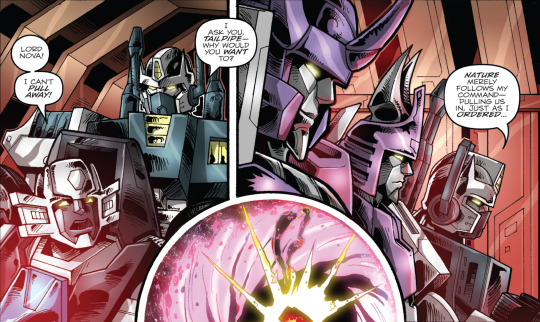
Wow, the pilot for the Ark 1 really is just straight-up named Butt, isn’t he? And what the fuck is that face you’re making, Cyclonus? Are you- oh my god, are you emoting? Oh my god, he’s emoting.
As the Ark 1 is pulled to its doom, Jhiaxus makes a quick phone call to Shockwave to tell him he’s his favorite, and to keep up the good work.
In the present, Shockwave reflects on just how friggin’ long this whole ordeal has taken. Fortunately, Waspinator and the Titan are almost here, and he can hardly wait.
Not, uh, that he’s got emotions or anything. It’s been established that he doesn’t have those anymore. Is impatience an emotion? Does that count?
Shockwave seems like he’d be really frustrating to write for.
Anyway, the Titan shows up, the Ore inside him and the Ore in the underground Crystal City combine, and the Titan starts screaming because everything hurts. Shockwave’s about as thrilled as he can be about the situation, given his lack of emotions.
Above Crystal City, we finally get back to that nonsense about the early sunrise, as someone- maybe Starscream, given the color of the narration box- waxes poetic on the planet of Cybertron, wartorn and wild in its rebirth, ruled by paranoia that has nothing to bounce off of, and so creates its own walls.
Then we get a detailed shot of Rattrap’s mug, and the moment is broken.
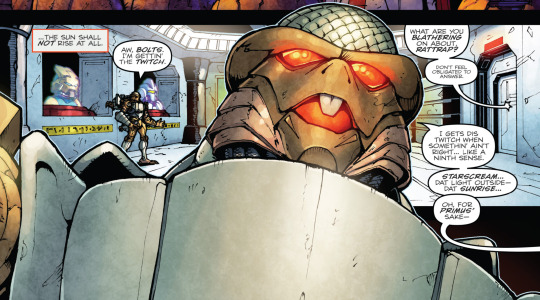
Rattrap’s character is a lot of fun in everything he gets tossed into, but you’re a goddamn liar if you think he’s pretty to look at. You are lying to yourself, and I won’t apologize for saying it.
Starscream walks out of his room in his hot new body, feeling fine and ready to take on the world. We’ll check in on him later in the day to see how that positive mentality is working out for him.
So, the sun hasn’t moved, and it’s way too early for the sun to even be up right now. That’s weird. Because I guess he didn’t know how the sun works, Starscream’s only just realized that this is perhaps a problem. He does some computer work and realizes that this is indeed a very bad thing, and asks that Rattrap call the Autobots. Not the ones who fucked off into the wilderness, the other ones. The gay, space ones.
Up in space, Orion Pax and his pals have found themselves in dire straits, the collapsing Gorlam Prime sucking their ship back down as the Death Ore consumes everything.

That’s not how engines work! And I think it really says something about the “Prelude” issues that I completely forgot why Wheelie was down an arm for a solid five seconds.
It turns out that Orion was the narrator the entire time, which I should have known- since when is the once and future Optimus Prime not the primary voice in any media he appears in?
It’s looking rough for the fellas, but luckily we’ve got to get the plot rolling, so the Lost Light VZZZZTs into existence and picks up the Skyroller to place it gently into its belly.
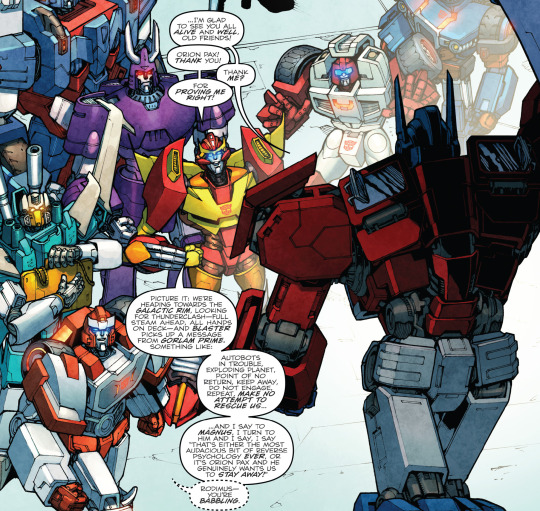
Orion isn’t exactly jazzed about the fact that Rodimus didn’t listen to what he told him, not even bothering to thank the guy for saving his life. I say y’all keep going on your Thunderclash Quest and leave this ungrateful loser behind. No space yachting for you, Orion.
The rest of the Pax Posse enter the Lost Light proper, and Hardhead reveals that he nearly joined the Quest, before he saw who all would be coming with, while Garnak has a tearful reunion with Rodimus. The fact that he’s calling him Sir- which I don’t recall him doing in Transformers (2009), at least not in a way that seems reminiscent of an unfortunate Antebellum Period Romance- feels rather weird, but I’m glad someone’s fucking happy to see Rodimus at least.
Ultra Magnus asks Orion if he’ll be assuming command of the vessel, as Rodimus tries not to look horrified by the thought alone, but fortunately Orion’s not going to pull his “I’m Optimus Prime and I Can Do What I Want” Card just yet.
Smash cut to the bridge, as Rodimus tries to make himself sound competent, when Starscream calls. Orion doesn’t like that Starscream has their number, Perceptor almost reveals the fact that this ship technically doesn’t belong to a faction, likely due to being purchased after the war, and Cyclonus gets brought in for his professional opinion.
As it turns out, that early sunrise isn’t a sunrise at all, but a portal to the Dead Universe. This is a problem, because the Dead Universe really sucks, and you don’t want to go there, especially if you enjoy being alive. Orion seems more concerned about the fact that Starscream is ruling the planet, and Bumblebee is nowhere to be found.
Speaking of Bumblebee, he and all his camp buddies are psyching themselves up for a confrontation.

Swoop, please, this is hardly the time for crudeness.
The Dinobots, sick of Bumblebee’s dithering about, decide they’re going to fight the fucking sun and gear up. Prowl, though generally disliking their brand of problem-solving, does share his begrudging respect of their can-do attitude.
Their can-do attitude over fighting the fucking sun.
Then an earthquake happens and the ground rips open to reveal that Titan that Waspinator showed up with.
Shockwave takes over the narration at this point, and we get artsy, as we see events that haven’t transpired yet over musings on the nature of... time? Maybe? It would be in line with Roberts’ go-to topics, but honestly the whole thing’s kind of vague so I couldn’t give you a solid answer. Shockwave gets awfully introspective for a guy who shouldn’t care, I know that much. The point is, he is inevitable and is super good at logic and science.
Also, Nova Prime and Galvatron are back, which is cool, I guess. Not sure where Galvatron had gotten to exactly after the events of “Chaos”, but he’s back now, so it doesn’t matter too terribly much. Shockwave serves them, which we’ll probably get an explanation for at some point.
God, you can practically taste the desperation to pin all these plot points together before the entire thing implodes on itself.
#transformers#jro#dark cybertron#issue 1#maccadam#Hannzreads#overthinking about robots#incoming analysis#text post#long post#comic script writing
86 notes
·
View notes
Text
SPN 15X14 Observations
So, for whatever dumbass reason, when trying to use my actual television, the cable refuses to work properly 8 times out of 10. BUT I was able to stream tonight’s episode on my computer with my cable network’s app. So, there’s that. Because of that, and since it’s easier for me to type on my keyboard than on my phone, I actually took quick notes and observations during commercial breaks. Here are those, then some more of my thoughts following. (And I’m sorry if any of these seem a bit incoherent. They were more my observations to myself. *LOL*
(everything else under the keep reading line since I got a bit rambly, and just in case anyone wants to avoid spoilers)
- Brothers being written a bit like characters of themselves rather than just themselves. (trying too hard?)
- Love Mrs. Butters. Actress really good. And the minor ret-con works with what we've seen.
- Sam more concerned about Jack. I think he understands him better, even though he hasn't seen much of him.
- "Ignoring your trauma doesn't make you healthy." (or something like that.) Good quote!
- Waiting for the catch.
- "Enjoy the world you're fighting for." (compare with Kevin's similar line: "I can't enjoy a world I need to save.")
- Mrs. Butters knows Jack isn't human.
- BOY did the shoe drop! But it was Sinclaire involved. Not surprised he took advantage of her natural protective nature.
- Wanted more plot for WHY exactly they still have Thor's Hammer. Have they had it this whole time? Last we saw Sam dropped it in 8X2. Or did Mrs. Butters conjure it up because they might need it? Was cool though that Sam was using it. Because we already know he can.
- Jack figured out on his own how to use the projector. (love that boy!)
- liked hearing him talk about what happened with Mary and how he feels.
- Mrs. Butters knows from experience about needing "second chances" I think.
- Why were they ALWAYS wearing the same clothes during the "We got one!" montages? Assuming it was supposed to have taken place over several days at least if not longer. (I highly doubt they went out on THAT many hunts in one day.)
- Yeeeah... So I get she's protective, but JACK IS BABY! She can clearly see his power levels but she has to have seen how he he actually IS? But she gave him the smoothies from the start, so she's been planning it from almost the start. Hrm.
- idk what anyone else says, I'm thrilled that Sam and Eileen had a date. Also, THIS is where that sweater-vest comes from. Bet we'll see him going for his gun too. (That clip was hotly debated in one of the discord servers I’m on)
- Dean is obviously still having some issues with Jack, but he also seems to know that they're his personal issues and he knows that Jack is good. (Expanding on this thought post episode, I was seeing this as Dean recognizing the difference between what he knows and what he’s feeling. So, yey! Personal growth!)
- DEAN JACK IS NOT A BATTERING RAM!!!
- Dean sees Jack as a weapon. He used him as a battering ram. He'll use him as a grenade to throw at Chuck. (More on this after the notes.)
- Sam sees him as a person. His argument was that Jack was someone he cared about. That killing him would HURT him.
- Also, did they HAVE to go for the fingernails again?!
- Poor Sam, getting tortured. And being the "favorite" of something bad.
- Also, SAM WAS RIGHT! To be cautious of her at first. Too many times he's had things/people seem good and turn out opposite.
- And because Dean had decided it was all okay, they both stopped looking up on her.
- Maybe Sam will realize that he doesn't always have to follow Dean's lead. He can pursue his own paths. (Not talking about them separating. Just, if he wants to look into something, he should do it. If he wants to follow a different lead, he should check it out.)
- I know he lost a lot of confidence last season but I hope he realizes that he doesn't by default make bad decisions.
- Okay, that was a good resolution. I'm glad she's going back to her people.
- Interdimensional geoscope: Dean saw nothing. Because ALL the other universes are gone. *sad-face*
- Love Sam and Jack. Wish we got a bit more. But it was something.
- Also love that Dean tried. That felt real to me. (the birthday cake)
More thoughts!
So. Overall I liked this episode. It was lighthearted mostly, but touched on some serious topics and wasn’t completely disconnected with what is going on with everyone, despite the random holiday montage. *LOL* (Yes, I know she wasn’t bending time or anything, she was just choosing to celebrate some holidays with her boys regardless of when this is all taking place exactly.) It did feel a bit to me, at the start anyway, like the writing at least was trying too hard to “Sound like Sam and Dean” instead of just them being them. I mentioned that at the start but what I mean is, in this season especially (but not exclusively) I’ve noticed a lot of times where it feels to me like the writing/directing/whatever leads to the sum total of what we see is trying too hard to present this idea of who the characters are, like caricatures of them. The things associated with them get emphasized, sometimes out of proportion. Though in this episode, it only felt like that during the opening scene and maybe a few places elsewhere. Overall I thought the writing and especially the acting on the parts of the main 3 guys and the guest actor were well done and had a lot of nuance when needed. Like, as an example, when Sam and Dean sussed out that this being that they didn’t even know was a bit behind the times, they were actually pretty gentle with bringing her up to speed. And her reaction to realizing that everyone she knew before was dead felt very real.
I liked what we saw of where each of the characters were emotionally this episode. It was the first one after Jack has been re-souled and it had definitely been weighing on my mind how everyone was doing. (Though I REALLY wish we could have actually seen Sam and Dean’s reactions to Jack tearfully begging their forgiveness last episode. But lacking any other input, I’m headcannoning that Sam gave him a very long, warm hug.)
I also agree with Sam, I think there’s something more that Jack hasn’t told them yet, probably some details about Billy’s plan that he or her are sure the brothers won’t like. (Now, what exactly that could be is very much up in the air. I can think of quite a few options, but the details aren’t really important to me just now. Just the fact that something about it is weighing on Jack. More than just Mary’s death and the prospect of having to kill God. Which, in and of themselves would be more than enough.)
Speaking of Sam, I liked that we saw all those little nods to how he feels about Jack, how he’s still worried about him, and seems to understand him.
I also get where Dean’s coming from. And I thought it was well-portrayed. And let me just say, I am GLAD that he just outright told Jack where he was at. He didn’t sugarcoat it, but he also didn’t blow up at him, or reply with sarcasm or bring up other, unrelated stuff. Dean knows that Jack is trying, but he himself has some emotional stuff he needs to deal with. That he is dealing with. And it’s going to take him some time.
I do however stand by my observation made during the episode that at least at that point in it, Dean considered Jack a weapon. An asset. He literally used him as a battering ram, and in a more meta way, he’s planning on using him as a grenade to throw at God. Even when arguing with Mrs. B about it, his response was in reference to Jack’s usefulness. Whereas Sam was arguing that Jack meant something to him, that he cared about him, and hurting Jack would hurt him. Now, I do think that Dean’s POV had shifted a bit by the very end. Dean’s love language has almost always been shown by doing things for people, and taking care of them. So him making that birthday cake for Jack really felt to me like him trying to tell him that he does actually care about him. And I think Jack got it. And true, the cake might not have been as neat and pretty as Mrs. B would have made it, but I thought it was beautiful because of all the thought that went into it. (Dean’s more of a cook than a baker too.)
As a side note, something I thought about after the episode: when Mrs. B stepped in, she kind of took over that care-taker role. AND the research role. She made them lunches, cooked them dinners, decorated for holidays, and overall made them feel comfortable and safe. And she also pin-pointed where monsters were and made sure they were all stocked-up and ready to go. All they had to do was show up and get it done. And yeah, it must have been a nice break from the norm. But I also think about how much Dean finds his identity beyond hunting in taking care of people. And how much Sam finds his identity in researching and figuring things out. And with her doing that, they both took it easy on those ends. Dean didn’t have to make burgers for everyone since Mrs. B made a roast. Sam didn’t have to research since she could tell them where the monsters were and what kind. I almost wonder if both of them were starting to feel like those parts of themselves were all of a sudden unnecessary. (Which makes me a little sad, because it reminds me a bit of the “two cakes” concept in fandom. Who cares if someone else can “do it better”? If you do it, then there’ll be even more of the good thing!) And as I observed above, Sam also stopped looking into HER. I mean, he didn’t even know what would kill a wood nymph. And I do think part of that also goes back to him having recently fallen back on letting Dean make the big decisions. Because last season so many of his blew up in his face. (Though I don’t think most of that was his fault. But Sam tends to blame himself for a lot.) And I do hope that maybe he’ll remember that he does have good instincts when he listens to them. And he can keep looking into something even if Dean thinks it’s fine. It’s not a betrayal to be prepared.
ALSO! Being the absolute Saileen hoe that I am, even though we didn’t Eileen in this episode, I was thrilled that Sam went out on a date with her because she was in town! And true, we don’t know what all went down, but regardless, I see it as good that they’re at the very least still friends, and that hopefully Eileen is sorting out her own feelings vs whatever she might think could be Chuck’s manipulations. Even if Saileen isn’t Engame (and honestly, as much as I love it, I don’t think it will be) I would still like for them to be on good terms with each other. (And for her to NOT get fridged again!)
Another thing I was pondering afterwards and a bit during: I wasn’t surprised that Sam held up to the torture fairly well. I mean, it still obviously hurt! (And again, WHY with the fingernails again?! As someone in one of my discord servers mentioned, we didn’t need THAT particular call-back to the Christmas Episode of Season 3!) But he was listening to what she was saying. And he understood the implications that she had been tortured into acting how they wanted her to act. And Sam understands torture, and how it can mess someone up. And despite what she had done to him, and was trying to still do, he validated what she had been through. He empathized with her. And that.... it’s just SO Sam!
I will say that the resolution felt a little... abrupt. Like, her expression had changed a little during the fight/argument. Then back from the commercial break and she’s all packed-up and ready to leave and they’re all saying goodbye and wishing her well. I feel like there might have been some more scenes or parts of scenes that were originally there connecting things up more, but were cut for time.
I wouldn’t say this was a groundbreaking episode, but it WAS fun, and it did have some seriousness at it’s core, and I think it did what it needed to do.
(And I apologize if this is just a big rambling mess. I’m not used to doing structured episode reviews. *LOL* Feedback and opinions are welcome though!)
#spn 15x14 spoilers#spn season 15 spoilers#episode review#my thoughts#ignoring your trauma doesn't make you healthy#sam winchester#dean winchester#jack kline#mrs butters#i still need more sam and jack
32 notes
·
View notes
Photo
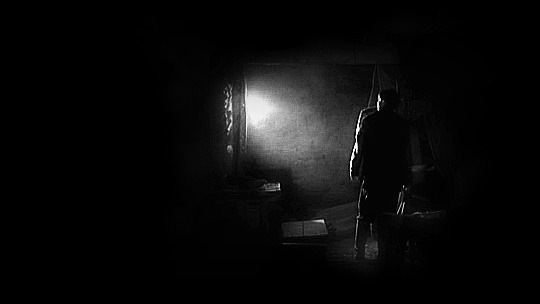
you can be my ride or die: a staggeringly long essay about a deceptively short appearance
(aka, pan’s personal depository of notes about prince william of ealdor.)
now that my fic is long since done and posted, i can finally transfer this monster piece of meta out of my google docs and onto my blog, where it can serve as an unasked-for, absurdly detailed, beginning-to-end analysis of my obscure fave.
(whose line ‘yeah, and i’m prince william, of ealdor’ is still the funniest damn shit i’ve ever heard and also the most shocking burn arthur has ever received; i hope he thinks of it sometimes and remembers that humility is a virtue)
(the BRISTLING DISRESPECT! the ZERO FUCKS GIVEN! i love him! please can someone else talk to arthur like this! he needs it!)
disclaimer before we begin: i wrote this over a year ago, as a character check for myself during the very early stages of working on my fic. i kept messily adding bits to it over the course of a couple weeks as i explored what i knew about this character and who i understood him to be, but at the time, i didn’t intend on posting it; it was just prep work for my own story-making. it’s still essentially just a record of my train of thought as i pieced this character together - i’ve cleaned it up a bit now and added some recent links to make it more coherent, but it was never meant to be a posted essay, just a collection of notes for myself.
be forewarned, it is more comprehensive than the things i’ve written about this character since, and it goes on for years. if you are not interested in many, many pages of super heavy in-depth musings about a character who appeared in one episode, now is the time to scroll on by. i promise i won’t mind in the slightest; i wrote this for my own purposes and don’t really expect people to read it - i’m posting it just to have it archived with the rest of my merlin stuff.
if you are interested in that sort of thing, however - hit the jump, and off we go!
i really love the episode where we meet will, though i’ve started to love it for new reasons since the first time i watched it.
the first time i watched season 1, 'the moment of truth’ was my favorite S1 episode overall, because it was the first time the Fab Four went off on an adventure together, and that was very exciting; and i also loved it because all the character stuff in that episode was so good; and i also loved it because look, all of us are suckers for that classic seven samurai plot, you know - i loved it in TCW, i loved it in the mandalorian, i loved it in merlin. not gonna get bored of ‘simple farmers defend their homes with pitchforks’ anytime soon. it is overall just a solid, self-contained plot with clear emotional arcs, and it sticks its landing well. it’s a simple, strong story.
nowadays, though, i also love it because of will.
i. will whomst?
prince william of ealdor, that’s who!
will straddles a kind of weird place in canon, because he feels like a minor character to the audience but is very much not a minor character for merlin, who has known will much longer than the brief hour we get to spend with him and who has spent his entire life with will as his sole friend.
but, because will only appears once - let’s start with a round-up. what do we actually know about him?
he’s a peasant farmer from ealdor, like merlin
his father was killed fighting for king cenred (as a foot soldier - these people are not wealthy enough or high-status enough to afford or be accepted into the knighthood)
his mother is either dead or absent
he’s painfully class conscious and doesn’t trust the nobility
he’s a “troublemaker” (the interpretation of which is...well, it’s left to the viewer’s discretion. fandom seems to jump to ‘fun mischief and pranks,’ though i personally don’t get that vibe from this episode. “troublemaker” in will’s case seems to mean more “doesn’t know how to keep his head down/can’t go along to get along to save his life.” it means when he sees something that he thinks is Wrong, he absolutely will not shut up about it even when all his neighbors are sick of him and want him to just let it go. it means he can’t stop rocking the boat even when rocking the boat makes everybody want to strangle him.)
he supplements his agricultural pursuits with carpentry. you can see in his house big piles of hewn timber along one wall, as well as a grindstone and a shaving horse, and when he comes out of his house on two separate occasions he’s holding woodworking tools (mallet, chisel, etc)
he knows about merlin’s magic - for how long this has been the case, we’re not told. it doesn’t feel like a new thing to me, but ultimately that’s guesswork.
he appears to have just one friend
that one friend is merlin
will loves merlin enough to die lying for him
merlin left will behind.
ii. it wasn’t what i wanted
so let’s talk about that.
merlin is asked “why did you leave?” twice in this episode, first by arthur and then by will. he gives completely contradictory answers to the two of them, and it’s worth remembering, before examining both responses, that one answer is inherently more honest than the other, because merlin is only able to tell the whole truth to one of these people.
so when merlin talks to arthur, it goes like this:
“why did you leave?”
“things just...changed.”
“how?”
*silence*
“come on, stop pretending to be interesting and tell me.”
“i just didn’t fit in anymore. i wanted to find somewhere I did.”
arthur has to drag this answer out of merlin, and it’s not because merlin doesn’t feel like sharing (i mean, come on, we know merlin; merlin wants to be in everybody’s business and he feeds off human connection like a starving man; he’d be thrilled that arthur was interested in his life) - the problem isn’t that he’s shy; it’s that he’s not exactly telling the truth and he’s trying to figure out how to do it in the least deceptive way possible.
i just didn’t fit in anymore. i wanted to find somewhere i did.
that’s nice.
it’s also a lie.
it’s not a total lie, of course - there’s an element of it that becomes true, after merlin gets to camelot and realizes that working for arthur is “not totally horrible all the time” - that he sort of likes the excitement, and the newness, and being somewhere where nobody knows him and nobody will judge him - but that’s the reason he stays in camelot, not the reason he leaves ealdor.
by contrast, when will asks the question, merlin gives a completely different answer:
“why did you leave?”
“it wasn’t what I wanted. mother was worried. when she found out you knew - she was so angry.”
it wasn’t what I wanted.
can we digest that for a moment?
merlin didn’t want to leave home.
not that he isn’t enjoying himself in camelot now, of course - which he conveniently doesn’t mention in this conversation, because will is upset with him and merlin feels guilty that he’s been off enjoying his new life while will has been struggling at home alone - but at the point of departure, merlin didn’t want to go.
his answer to arthur about finding a place where he belonged is certain-point-of-view bunk. he didn’t just up and decide that he wanted to run off and find a place where he fit in better. he didn’t leave because he wanted to escape a place he didn’t belong. he didn’t set off in search of adventure and a new life. it’s true that he didn’t feel like he fit in in ealdor, but that’s not what sent him packing. he left because his mother found out that will knew about his magic, and she panicked and sent him away.
iii. why did you leave
most fannish things i’ve encountered tend to interpret merlin’s departure in a much more generous light than i do, with merlin explaining to will that he’s leaving and will being unhappy about it but eventually understanding and kind of like...giving his blessing before merlin goes. this is fine, of course, but it did surprise me, when i started dipping my toes into fandom, because i never interpreted events in this episode like that, and i don’t think it’s even a plausible read, not from the conversations we’re actually given. the antipathy that accompanies merlin’s return doesn’t make sense under those circumstances, and moreover, from the way things actually unfold in this episode, we’re told, in order, the following three things:
1) the fact that will asks “why did you leave” tells us that he and merlin did not discuss it prior to the point of departure. there’s no other reason for will to ask this question. everything about will’s tone and body language in this scene indicates that he’s been stewing over this for a long time, that he doesn’t understand, that this is something profoundly difficult for him to address. and while it might be nicer to think that merlin sat down and discussed things with will before leaving for camelot, that’s not the inference we’re being asked to make here.
2) there is absolutely no way they wouldn’t have discussed it, if will had known that merlin was going to leave. like - if your only friend in the world told you they were moving to another country tomorrow, there’s no way “why?” wouldn’t be the first question you asked. there’s no way you wouldn’t have that discussion, at the most basic level, before separating. it just wouldn’t happen.
3) so, given that information, the unfortunate, inescapable conclusion is this: will didn’t know merlin was going to leave. merlin left without telling him.
everyone is free to continue to headcanon this in their own ways, of course. but this is what we’re actually being told.
iv. we don’t want your kind round here
the fact that merlin vanishes without so much as a word to his best friend goes a long way towards explaining why merlin is so uncomfortable when he first sees will in the street.
when they first encounter each other, merlin looks so apprehensive and wary, and the writers are playing it like ‘uh-oh, someone saw him use magic and now he’s nervous about it!!!’ but two seconds later, you realize that this can’t possibly be what’s causing merlin’s concern, because it’s made immediately clear that will already knows about merlin’s magic and isn’t going to say anything about it.
merlin isn’t afraid of being outed, in this scene. but he might, however, be afraid of the reception he’s going to get, given what we just discussed.
merlin just up and disappeared from home, and not so much as a letter since - we know will’s had a secondhand update, probably from hunith (“how’ve you been?! i hear you’re skivvying for some prince”) but he very clearly hasn’t had any direct contact with merlin since before merlin left.
merlin knows this was a big fuck-up. he feels guilty.
(and to be clear - i think there is a lot to be said about just how merlin’s departure unfolded, and what stopped him from getting in touch. it’s a complicated enough topic for its own piece, and it’s not quite within the scope of this essay, but suffice it to say for now that i don’t believe it stemmed from deliberate thoughtlessness or callousness on merlin’s part; it’s...deeper and more complicated than that. honestly, i think merlin looks back on this as like...the first major mistake he ever made in his life, his...original sin, sort of. and i don’t think he’s ever forgiven himself for it, either, but again, that’s a story for another day.) the point here is that merlin didn’t necessarily want to cause harm, but he knew that’s what he was doing regardless - he knew that leaving without a word was the wrong thing to do. and in this moment he feels rightfully guilty about all of it, and he’s afraid that his friend won’t welcome him home.
merlin’s moment of uncertainty is real, when will pretends to greet him with hostility. merlin is afraid that will is angry with him for leaving him behind.
(and let’s not kid ourselves, will definitely is)
it’s a festering thing that keeps boiling to the surface as we progress through the episode. it shows in the way will finally asks why did you leave, avoiding merlin’s eyes, the question laden with vulnerability. it’s in the exchange “are you going to abandon them?”/“what, like you did?” there’s real pain there, and confusion, lots of hurt feelings.
but.
despite all of that, will doesn’t freeze merlin out, when merlin comes riding back into town. merlin is rightfully afraid that will might not want to see him, afraid that “we don’t want your kind round here” might be less of a joke than it ought to be. and while all of the troubles that merlin is worried about are absolutely real and poised to cause friction later, the truth is that at that exact moment, when merlin comes walking up the road - none of it matters. will has been nursing a collection of hurt feelings for months now, yeah, but in the immediate moment, when it comes down to it - he puts them aside.
they both do. nerves, guilty thoughts, bruised feelings - they temporarily abandon all of that in favor of a momentary joy. you can see how excited they are when they reunite. how they start smiling at the same time. how they laugh their way into that hug. they’re so happy to see each other.
people get pretty worked up about ***That Time Arthur Finally Hugged Merlin!!!***, but i don’t know. i think it matters to remember that merlin had people who knew how to hold him long before arthur was even a flicker of a shadow in merlin’s mind.
v. why are you being like this
so they reunite!
and then they fight. D:
but what really matters is how they fight, because even when they’re having an argument, they never let things escalate quite to the level of interpersonal nastiness, certainly never to the level of cruelty for cruelty’s sake - just a few hard truths and a pile of hurt feelings:
“i trust arthur with my life.”
“is that so? so he knows your secret, then?”
...
“face it, merlin, you’re living a lie, just like you were here. you’re arthur’s servant, nothing more. otherwise you’d tell him the truth.”
the delivery in this scene is essential for understanding how these two interact with each other. it’s so telling. merlin and will are having an argument, and will is angry about everything we’ve already discussed, and on top of that, some prince is trying to round up a bunch of will’s neighbors for a fight that’s going to get a lot of people killed, and will sounds so sharp when he’s talking, up to and including the challenging “is that so?”
but then when he sees that he’s touched a nerve there and merlin knows he’s right, his voice drops those edges and goes gentler, regretful, like - he and merlin aren’t all hunky-dory right now, but he’s not out to rub merlin’s face in it, either. he’s not trying to “get back” at merlin for leaving him. he’s not like...happy that merlin’s situation is shitty.
vi. if i broke it (would you quit?)
we mostly only see these two in a tense season. they’re arguing with each other for almost the entire episode, and yet even in this at-odds state, there are little things that remind us of what they’re usually like - that they don’t want to be arguing, that this isn’t a natural at-rest state for them, that this isn’t what they’re used to. they butt heads, but they keep swinging around back to each other, and trying again, and trying again, and trying again. they never write each other off. they keep trying to make it work.
examples: merlin asking “why are you being like this?,” the implication being that will isn’t usually like this, that this isn’t how they usually act around each other. the two of them together in the background of arthur’s pitiful training session, coming right off the tail-end of another argument and busying themselves with their own work, but still reflexively hanging in each other’s orbit. merlin, even in the middle of a strained conversation, helping clean up the mess that the bandits made of will’s house, without asking or being asked, like it’s just the automatic, reflexive, natural thing to do. merlin using will’s proper name when discussing him with other people, but always the diminutive when they’re talking to each other. merlin following will every time will walks away; will doing the same when merlin’s the one who’s leaving. that moment up in the hedgerow, with will’s embittered “you know why,” which sets them to arguing again, except instead of it pushing them apart, it pulls them closer together - will climbs right up into the hedge where merlin is standing so they can sit next to each other and talk.
like. he’s angry! but the instinct isn’t to storm away, it’s to get closer.
i love that so much. i love how they’re starting to have another argument and merlin stands there and says “why are you being like this,” to which will, already upset, responds “you know why,” BUT -
but
will stalks up into that hedge and plops himself down right next to merlin, and merlin, without a moment’s hesitation, sits down beside him.
i love that. they’re angry with each other, but their first instinct is still to close the distance.
i wonder, sometimes, how much of that is a function of them only having each other. when you’re on the outs with someone, usually you can lean on your other friends, but what can they do? it’s different when the person you usually seek out for comfort is the same person who’s pissing you off. you don’t have anyone else to run to, so you can’t ever really storm off. you have to learn how to hash things out. you have to learn how to make it work. you have to learn not to give up on each other.
vii. she was so angry
the implied backstory for how merlin actually ended up in camelot is so painfully fascinating and, quite frankly, wrenching to think about, given how this episode eventually ends.
when will asks merlin why he left, merlin tells him, “it wasn’t what i wanted. my mother was worried. when she found out you knew - she was so angry.” this is telling us that merlin’s departure for camelot was directly preceded by his mother discovering that will knew about merlin’s magic. that is what ultimately prompted her to send merlin off to camelot. of course there would have been other contributing factors - it’s evident that merlin’s situation in ealdor has always been precarious - but her immediate reason for sending him away was the fact that she found out that will knew about merlin’s magic, and she was angry and afraid to learn that merlin had been lying to her about something that put him at risk.
“i wouldn’t have told anyone.”
“i know you wouldn’t.”
but merlin’s mother didn’t believe that, or she wouldn’t listen to him when he tried to tell her, and she shipped him off to camelot anyway, despite the fact that camelot is arguably more dangerous for merlin than ealdor ever was.
the web of how this played out is such a tangled mess. is it my fault, thinks will, before the episode even starts, desperately trying to figure out why merlin would abandon him like that. it’s my fault, thinks merlin, at the end, knowing that if he had used his magic sooner, or come back alone, events would have unfolded differently. it’s my fault, thinks hunith, realizing that the particular fear upon which she based merlin’s entire departure was utterly unfounded.
merlin doesn’t blame her for it, even though he has reason enough to be angry about it, by the end of this episode. he understands that she was just trying to protect him. but the truth of the matter is that she did make a mistake. she was afraid for him, and she saw danger everywhere, and so she made a misjudgment.
it’s the miniest of mini-arcs, but it’s there. at the end of this episode, right after will drops the Big Damn Lie, merlin looks desperately around for the only other person in the room who understands, and the camera rests on hunith’s face for one lingering moment, as she realizes what’s happening. when she’s exiting the house, there’s a shot where she pauses for a minute on her way out the door, staring back at her son's dying friend, who just offered himself up as a willing sacrifice to keep merlin’s secret safe.
she and merlin are the only people in the room who understand the real import of that moment, the real meaning of that gesture. they’re the only ones who know what’s happening, what it really means for will to say “i did it.”
hunith knows she misjudged that kid big-time.
viii. you can be my ride or die
so. will.
why am i even interested in him? what is it about this character that makes me want to write about him?
number one: i love him because he’s the only person we ever meet who cares exclusively about merlin.
everyone else merlin has met up until this point is either a) as beholden to camelot and arthur as merlin is himself, or b) aware of merlin’s “destiny,” which isn’t necessarily a bad thing but does change the way people talk to him and treat him.
it’s not that merlin doesn’t have people who care about him, but those relationships are not the same as the one he has with will. merlin is obviously #1 in his mom’s life, of course - but, importantly, even hunith’s immediate reaction to merlin’s uncertainty at the end of 1.10 is to tell him that he has to go back to camelot, that arthur needs him, that he’s “the other side of a coin.” this despite the fact that hunith has known arthur for all of five minutes and that merlin, in the moment where she talks to him, is in a lot of pain, and maybe it isn’t the most appropriate moment say, ‘hey, you absolutely must devote yourself to that guy i literally just watched lecture you about the evils of magic while attending your (supposedly magical) dead best friend’s funeral.’
and when it comes to merlin’s camelot network, well - he’s #1 in gaius’s life, too, but gaius also is deeply concerned with the greater good, with the future emergence of albion, with what merlin is meant to become and do. morgana and arthur - well, they don’t know merlin, first of all (really know him, all of him, the important bits) - they definitely like him well enough, and care about him in their way, but ultimately they’re royalty or pseudo-royalty and they have priorities that go beyond merlin, who, at the end of the day, is still a servant. gwen comes the closest to being on merlin’s level, but she doesn’t know him-know him either, and as time goes on she gets more involved with the Crown, with arthur, and with the responsibilities all of that brings. even merlin’s later friends all go on to have other missions - they absolutely all love him, but they all become knights, and they are as concerned about the well-being of the realm and the king as merlin is. even merlin HIMSELF puts arthur’s life ahead of his own - he defines his worth by how well he can protect his prince.
but will is the only person we ever meet who just cares about merlin - merlin the regular person, not the servant he pretends to be, or the legend he’s supposed to become. not the fake, non-magical merlin facade (which is what almost everyone else needs merlin to be before they can condescend to be his friend) and not some destiny-laden figure out of prophecy, either. will doesn’t know anything about destiny or prophecies. he’s never needed to know about any of that stuff to care. he’s always liked merlin. just merlin. just as he is.
that matters. all merlin ever does in this show is deny himself or be denied of the things every regular human being needs to thrive - love, acceptance, truth, safety. he constantly puts or is forced to put other priorities ahead of his own interests, to a point where now, by season five, he’s spent years defending a regime that oppresses him, protecting kings who would execute him.
will, in a display of true-to-character contrariness, upsets that entire narrative, because he does not care one whit about any of the things for which merlin is supposed to sacrifice his life. will gives less than zero (count them: negative zero) fucks about arthur pendragon, and he doesn’t care about camelot, and he wouldn’t know what “albion” meant if he heard the word. and it is refreshing - a blessed, beautiful, heartbreaking relief - to see one person in the world who only cares about merlin, for whom arthur pendragon, in comparison with merlin, isn’t the slightest bit important. arthur isn’t even on the map. he’s a non-entity. he doesn’t exist.
it’s a complete inversion of the way things are supposed to go, in this story. you know how it goes - arthur is the once and future king, and merlin’s job is to usher in his reign. "maybe that is its purpose,” gaius says, about merlin’s magic being meant to protect arthur, about merlin being born this way for that particular reason. it’s merlin’s job to save arthur’s life. it’s merlin’s job to teach arthur to be a better person, at his own expense. it’s all for arthur. i give my life for arthur’s. his life is worth a hundred of mine. what is the life of a servant compared with that of a prince?
will delivers the biggest fuck-you to that entire framework, because he doesn’t assess merlin’s worth based on what merlin can do for some random prince on the other side of the border. merlin’s magic wasn’t purposed for anything, as far as will is concerned. it doesn’t need to justify itself. it just is. it’s just who merlin is.
and who merlin is has always been just fine.
ix. am i the only one wondering who the hell this is
for will, it’s people like arthur who need to justify themselves. arthur with all of his power, arthur riding into little villages with his sword drawn, arthur and his bossing around and his “now, merlin!” conversation-interrupting. will makes no allowances for wealth and couldn’t be less interested in royalty - his frame of reference isn’t you’re the once and future king and merlin exists to prop you up; it’s who the hell are you? what gives you the right to be here? what did you do to earn what you have?
will, like gwaine after him, is acutely aware of the injustice of the reigning social system, and he’s not afraid to throw it in arthur’s face. he knows that people like himself and merlin and all of their neighbors are unjustly disadvantaged from birth until death, and he knows they’re disadvantaged solely because the people at the top of the social chain are greedy lords who sow no seed but reap all the grain, who do no work but enjoy the greatest rewards, who steal from the people with impunity and call it divine entitlement. will knows that he and merlin and all of their neighbors are considered no better than plow-beasts or war-fodder, and he knows that there is absolutely nothing they can do to stop the nobility from either taxing them into starvation or sending them off to die in a ditch - which makes him impossibly angry, and, unlike everybody else in his village, he’s not shy about saying so.
will is, at this point, literally the first non-villain to look at arthur and not immediately see some messianic pinnacle of human greatness - which is refreshing, to be honest, and fair enough besides! he’s evaluating arthur from merlin’s side of things, after all, which nobody - including merlin - ever does, and while i love arthur as much as anybody - for the people’s hero that he could be, and for what he is, sometimes, if not frequently enough - the truth is that he’s not good for all of his people, not yet, and he’s not good for merlin, not the way things stand right now.
will knows that. he looks at arthur and sees a guy with a lot of power, who also happens to rule over the the least magic-friendly place in the five kingdoms, to whom merlin needs to lie in order to avoid the executioner’s block, and he sees merlin deluding himself into thinking that this supremely unequal, extremely unsafe situation counts as friendship.
now, is will’s assessment of the situation a snap judgment based on personal encounters with an unjust social system and very limited knowledge of arthur as a person? yes, definitely. are there nuances to merlin and arthur’s relationship that he’s missing? absolutely.
is he wrong?
not really. and merlin knows it.
x. friends don’t lord it over one another!
i think about that line every damn episode.
over and over again, it comes back to me. i hear it every time arthur gets On His Shit and invokes power he pretends not to have, every time i see more evidence of how this supposed “friendship” between him and merlin is inherently imbalanced. it’s my favorite thing will says in all of 1.10, because it is so true and yet, most of the time, so unacknowledged as a dynamic.
we’re meant to love arthur and merlin together, and we do - i do; i do; when i see those moments that approach true mutual respect and care between them i am as swept up by the potential beauty of this friendship as anyone - but i still think about this line all the time. it’s not right, the power dynamic between the two of them. it’s not just about servants vs. royalty, though of course that’s a structural part of how it plays out. it’s about the fact that, in a real friendship, one person can’t just whip out “you ever say anything like that again, and i swear you’ll join her in exile forever” to shut down a conversation and cow you into silence. one person can’t just throw you in jail to spend a night “cooling off,” and they definitely can’t arrest you whenever someone levels a random accusation at you. in a real friendship, it’s not one person who has all the power.
but when it comes to arthur and merlin, that’s exactly what happens. arthur gets to decide when he and merlin are and aren’t friends. arthur gets to call merlin in or send him away. arthur gets to make all the decisions about when to listen, when to ignore, when to trust, when to believe. merlin can nudge, encourage, suggest, even defy, but ultimately, when you get right down to it, arthur is the king, and merlin is his servant, a dynamic which is compounded by the deadly particulars of merlin’s situation. the relationship isn’t unequal solely because of a difference in social class, it’s unequal because arthur literally has the power of life and death over merlin. arthur could (and would, as far as merlin knows) have merlin executed any day of the week, if he found out who merlin really was.
that’s why when merlin tries to tell will that arthur is his friend, will snaps, “friends don’t lord it over one another!” it’s not that you can’t care about someone who has more power than you, and it’s not that you can’t have some kind of relationship with them, but it is not real friendship if you think your “friend” will kill you when they find out who you really are. it is not a real friendship if you have to pretend to be someone you’re not in order to preserve the relationship. real friends don’t leverage impossible amounts of power to shut you up when you say something they don’t want to hear. real friends don’t say things like “you’ll be a friend for life if you do [x thing]” to convince you to lie to their dad while they go out with a girl and thus get you clapped in the stocks three times in a row, and then turn around and show their appreciation by letting people raid and ransack your house multiple times, throwing you in jail at least twice, accusing (and once nearly executing!) your loyal long-serving mentor more than once - among innumerable other issues. real friends aren’t “you’re my friend when i need you to be, but not when it’s inconvenient.” they don’t have the kind of power to turn things on and off whenever they want.
i love that will is the only person who ever acknowledges this, across five seasons of this show. i love that he spits it out immediately, without hesitation, the minute merlin tries to makes things sound better than they are. i love that he says it unapologetically, to merlin’s face, because he says it for merlin’s sake, after all - the point of saying ‘friends don’t lord it over one another’ is to say ‘that guy doesn’t appreciate you the way you appreciate him/this isn’t reciprocal and he’s taking advantage of you/this isn’t the friendship you want it to be and i don’t like seeing you settle for this.’ will is that friend who watches you interact with someone and then later gets in your business like ‘EXCUSE ME! I DO NOT LIKE HOW HE TALKS TO YOU! I DON’T LIKE HOW HE TREATS YOU!'
will knows that merlin deserves better than arthur pendragon, even when merlin himself won’t concede that point. merlin won’t advocate for himself, so will tries to do it for him. merlin can try to convince himself that arthur is a real friend all he wants, but will knows what’s up. he knows. he knows where this is going, if merlin’s relationship with arthur is allowed to continue on exactly as-is. will knows, from the very beginning, that this is a recipe for disaster.
[addendum 2020: speaking from a post season-5 perspective...will understood where merlin and arthur were headed long before even we the audience did.]
xi. friends don’t lord it over one another [reprise]
you know what real friends do do for each other, though?
a) listen - even when they don’t like what the other person is saying
b) care - even when they’re angry
that’s it. that’s what matters.
we don’t need more than an hour of watching will and merlin onscreen together to see that this is how they interact with each other. they’re arguing for most of this episode, and they’re both right, in different ways, but by the time they’ve had it out with one another, they both understand where their own arguments were wrong, too. they listen to each other despite the fact that they’re angry, and despite the fact that they both have very strong feelings about their respective positions. they care enough about each other to look past their personal injuries and accept where the other person is coming from.
merlin starts off this episode absolutely dead-set against using his magic to help ealdor, if there’s any chance arthur could find out about it. but later, before he and will have even officially reconciled onscreen, we can already see that he’s been listening to what will’s been saying, that he’s come around to will’s way of thinking, because he tells his mother “if it comes down to a choice between revealing who i truly am and saving lives - that’s no choice at all,” hearkening back to will’s “are you telling me you’d rather keep your magic a secret for arthur’s sake than use it to protect your friends and family?” and: “if arthur doesn’t accept me for who i am...well...then he’s not the friend i hoped he was” (you’re arthur’s servant, nothing more. otherwise you’d tell him the truth.)
merlin has been listening the whole time, even if he didn’t like what will was saying.
and the same goes for will, too. he’s (understandably!) bitter about merlin’s situation, about the way merlin left, about the new life merlin built for himself while will was suffering in a confused limbo of abandonment at home - and will also obviously thinks the Farmers’ Resistance is a total disaster, a noble-spun farce that’s going to get good people killed - but even though he doesn’t trust the camelot contingent and couldn’t give fewer shits about prince arthur pendragon specifically, he trusts merlin. he listens to merlin, even though they’ve been fighting. he comes back because merlin keeps telling him it’s the right thing to do.
they both listen, even when it seems like they’re just arguing with each other. and they both acknowledge where the other person was right, even when it means making themselves vulnerable. will comes back to help his neighbors fight a battle against hopeless odds. merlin exposes his magic to save people’s lives.
they teach each other how to do the right thing. they make each other brave.
xii. you just saved my life
let’s talk about being brave, then.
this kid jumps in front of a crossbow for a guy he doesn’t even like.
can we be clear about that? will doesn’t even LIKE arthur. he doesn’t particularly care about him. he doesn’t accept him as the noble savior of all mankind. he isn’t interested in defending the nobility, and he certainly hasn’t jumped on the camelot bandwagon. just because he’s seen that arthur wasn’t planning on sending them all to their deaths without risking his own neck doesn’t mean will is suddenly going to start flying the pendragon crest from atop his house.
but he isn’t going to step back and let a coward shoot another man in the back, either.
arthur’s still a prince, yeah. arthur’s still sitting at the tip-top of an unjust social system, benefitting from all kinds of privileges he didn’t earn. arthur’s still a crappy friend to merlin. heck, two seconds before that crossbow gets fired, arthur’s gone full-on inquisition-mode, interrogating merlin about sorcery, which, given that arthur can just go ahead and have merlin executed with a snap of his fingers, isn’t a great way to earn will’s respect or trust.
but you know what? when it comes down to it, will’s automatic, reflexive reaction upon seeing someone in immediate danger is to Get In The Way.
it doesn’t matter that will doesn’t like arthur. it doesn’t even matter that he actively dislikes arthur. will doesn’t even think about it, he just moves. instinctively. automatically. he isn’t going to let anyone standing right in front of him get murdered with their back turned, no matter how much he can’t stand them.
let’s all take a second to remember and acknowledge something in arthur’s stead, since i’m not sure arthur will do it himself - arthur pendragon would have been dead right there if it weren’t for a dirt-poor peasant farmer from cenred’s kingdom who never had anything nice to say to a prince but still stepped between a pendragon and a crossbow in the name of doing the right thing. without will, the story would have ended in season 1, episode 10. albion itself owes its future existence to a young man with no surname who will never be acknowledged or recognized for anything he did, not for teaching the future king a lesson in humility, not for saving the prince’s life, and certainly not for the greatest and most noble move he ever made, because that gesture’s success is predicated upon its remaining a secret.
this kid saves the entire World That Will Be. the show would have ended before it ever really began, if not for our man prince william of ealdor.
merlin knows that, and merlin never forgets it. but i’m not so sure about everyone else.
xiii. yeah, don’t know what i was thinking
let’s talk about defiance.
this kid is dying, and he’s still full of piss and vinegar. when arthur says, wide-eyed, “you’re a sorcerer,” will responds, “yeah. what are you going to do, kill me?”
what a power move. what a thing to say.
that’s not a question. that is a no-fucks-given, shame-and-blame challenge.
what are you going to do, kill me?
merlin uses those exact same words during his confrontation with morgana in 3.02. when he’s trapped - when he’s cornered and betrayed and angry - he reaches for the kind of defiance he once saw exercised on his own behalf, for a shameless bravery that burned itself into his brain. for the kind of strength he wants to channel himself.
when it comes to holding your ground in front of the pendragon dynasty, merlin learned from the best.
xiv. and i’m prince william, of ealdor
let’s talk about names.
william: from wil (will or determination) and helm (protection, a helm)
hence the common translation of resolute protector.
which, given the events of 1.10, seems very fitting.
xv. i did it
let’s talk about lies.
because resolute protector rings even more powerfully true when it comes to merlin than it does for arthur.
at the time of this writing, i have four more episodes to watch before i’m done with season 5. at this point, at the end of the show, merlin’s magic is still a secret. merlin’s gotten involved in a lot of dangerous situations, risking his life in other ways, but the one danger he’s never had to really confront is the executioner’s block, because none of the pendragons know his secret.
and the reason none of the pendragons know his secret is thanks to our boy prince william of ealdor, who turns his own untimely death into a last-second rescue operation by telling the Biggest Damn Lie of his life and then doubling down on it when merlin tries to tell him no.
will is the one who secures merlin’s next five years of relative safety. not from all of life’s dangers, of course; no one can do that - but when it comes to merlin’s greatest fear, the worst outcome, the prospect of being dragged out of his home in chains and murdered in front of an ogling crowd for just existing - will buys merlin’s escape from that fate with his life. merlin remains hidden and unexposed to this very day because will died protecting his secret, because will lied to the prince of magic-hunting and invited upon himself all of the risk and scorn and danger and condemnation that a false confession like that entailed.
i honestly don’t know how to express clearly enough the enormity of that moment. the momentousness of that gesture. i called it a bold and tremendous lie in some other post somewhere, and i don’t know how else to capture what it was. the thought of what it would mean, to be merlin, and to see someone throw themselves on the block for your sake, for your safety and your future and your freedom, when the rest of the world and every message you’ve ever absorbed says you don’t deserve to be safe, you don’t deserve to be free, you don’t deserve to exist.
it is impossible to overstate how much that matters. merlin carries that with him for the rest of his life.
xvi: i can’t fight you anymore (it’s you i’m fighting for)
let’s talk about love, okay?
this ep is called the moment of truth, right?
so here are some truths about will. in the time that we spend with him, we come to understand that he is the following:
a poor peasant kid with nothing to his name
a kid whose father is dead
a kid whose mother is either dead or absent
a kid who “people are used to ignoring”
a kid who’s been making his own way through this backbreaking subsistence-farmer’s life with no grown-ups to hold him or help him or listen to him when he comes home at night
a kid who isn’t trusted to protect merlin’s secret, even by merlin’s own mother, whom will has known for his entire life
a kid whose only friend in the world fucked off to the country next door without a hint of warning or any indication that it was something that should matter to either one of them, making will think he misread the only meaningful relationship he’s ever had, because if merlin can just vanish to nowhere and not even bother to send a note, then either merlin wasn’t actually his friend to begin with or merlin was his friend at one time but doesn’t want to be anymore, both of which options are soul-crushing
a closed-off, heavily-armored, hurting kid who’s been unspeakably lonely for the past few months but also angry and ashamed at himself for feeling that way, because how stupid did he have to be, to think that he mattered to someone, that someone would ever want him or love him or need him or miss him, to think that this time would be different, that this time somebody wouldn’t leave him -
and even in this state - even in the midst of all this -
at the moment of truth, he still puts himself on the chopping block. he still says, “you’ll have to go through me.”
he comes through for merlin. of course he does. the irony is bitter and beautiful - hunith sent merlin away precisely because she didn’t trust that merlin would be safe with will knowing about his magic, but in the end it’s will who gives up everything to keep merlin’s secret concealed.
not just to keep it concealed, even - to reverse merlin being outed. merlin had already been exposed. the deed was done! the magic was seen! it was all over - and then, miraculously, it wasn’t. what will did was the only way merlin could ever have slipped safely back under the cover of secrecy.
will didn’t have to do that. he didn’t have to lie about performing magic, and he didn’t have to save arthur, either. it would have been better for will to let arthur die, in fact, and it would have been better for him to let merlin get caught, too, because ‘maybe then merlin would have to stay here with me’ - but will is so much better than petty revenge. he’s so much better than anybody ever gives him credit for, merlin excepted.
the fight will has with merlin doesn’t matter to him, in the end. it was a complicated situation for both of them; will knows this. if he weren’t dying now, he and merlin would have talked it out and made up - will knows that, too. things could have gone a little smoother between them, maybe, and will still thinks going back to camelot is less than what merlin deserves, but it’s what merlin wants, and the mark of truly loving someone is when you want the best for them, even if it means you don’t get what you want for yourself. so ultimately, when it comes down to it, the truth for will is this: he wants merlin to have a good life. he wants merlin to be safe. he wants merlin to be happy. he wants merlin to be with him, too, but if he can’t have that, it’s no reason to withhold any of the other gifts he can bestow. if one of those gifts is freedom, if one of those gifts is safety - it’s no choice at all.
merlin is will’s one good thing. merlin deserves everything will can give him, as far as will is concerned.
xvii. the only place worth being
this place has been boring without you.
what a thing to tell someone.
what a powerful thing to say to someone whose entire life up to this point has been a litany of ‘there’s something wrong with you,’ ‘you don’t belong here,’ ‘you’re cursed/broken/wrong/unnatural.’ what a dauntlessly loving thing to tell someone whose entire life has been the message ‘people like you deserve to die,’ over and over and over again.
what a singularly beautiful thing it is, for someone like merlin to hear ‘you are what makes this place worth living in.’
xviii: the only one worth seeing
likewise it’s good to see you again.
because it’s not just “it’s good to see you again;” it’s an acknowledgement that merlin is the last person will is ever going to see.
and will is like, okay.
he’d rather be alive, yeah, but if he had choose - it’s good that it’s you.
xix: the only bed worth sleeping in (is the one right next to you)
the most devastating moment in this sequence, for me, is at the very end, when will confesses fear.
it doesn’t happen until everything else has been taken care of. arthur’s been fooled, merlin’s been safely shuffled back under the cover of secrecy, everybody’s been taken in by the ruse and sent away, none the wiser - all the necessary and important business has been dealt with.
only at the very, very end does will’s own predicament rear its ugly head. only after everything else is done does he even allow himself to feel it. he’s spent the rest of this sequence making jokes and roasting arthur and keeping it all together, but at the last second, when he falters, he comes undone for the only person he trusts, the only person who understands him, the only person in the world who gives a damn about him. his defenses come down, in that last moment, for merlin - and it could ONLY be for merlin - when will says, “merlin, i’m scared.”
we don’t need anything else, to understand their relationship. we’ve seen enough of will by now to recognize that he keeps the world at arm’s length, that even his walls have walls, that this is just not the sort of thing he would ever admit to. confessions of pain? acknowledging vulnerability? never. he’s not that kind of character. we know he has a big heart - look at what he’s doing - but we also know he’s had a hard life. he’s wrapped himself in layers upon layers of protection - snark and anger and deflection and sarcasm and still making jokes at the prince’s expense after being shot in the chest - nobody is allowed to see him open and undefended, never.
except merlin.
will is dying. he is so young. he has been so alone, for so much of his life, and he’s so young, and he’s dying. he clutches for this lifeline like it’s the only thing he has, because it is the only thing he has - merlin is his only friend. merlin is the person will loves best in the whole world.
merlin, i’m scared.
that is so unbelievably vulnerable. that is so utterly naked. that is totally defenseless, exposed, belly-up and barethroated under someone else’s burning gaze.
that is absolute trust. will would never have said that in front of anyone else. he would never have allowed anyone else to see him like that.
his confession is, like pretty much everything else he ever does, for merlin alone.
xx. your heart is on my sleeve
merlin, will keeps repeating. merlin.
how much do you have to love someone, to make their name your last words? how much do you have to care about someone, for that to be the only thing you can think to say, again and again, in your last terrified moments on this earth?
that’s a rhetorical question.
i know how much.
xxi: i missed you too
i think, sometimes, about will, when i watch the later seasons of merlin, and about how he would feel if he could see what merlin’s life has turned into.
i sometimes wonder how he would feel, if he could see how merlin allows himself to be passed over, disbelieved, disrespected. if he could see how merlin has started to define his worth in terms of how well he is able to protect Some Dude who doesn’t even know who merlin is, who keeps people like merlin trapped in the shadows of subjugation, hidden citizens in their own kingdom. if will could see how merlin has laid his entire life down for other people’s enrichment, if he could see how little hope merlin now holds for his own happiness, if he could see the way merlin in S5 has given up on his own liberation -
i don’t have to guess what will would say about it. i know how he would feel. if will could see merlin in season 5, his raging little heart would break.
i wish he were here to tell merlin exactly what he thought about it. merlin does all this self-sacrificing for the sake of his “destiny”; whereas will would think that any destiny making merlin this miserable was a steaming pile of trash. will would tell kilgharrah to get lost, and to take his questionable advice with him. will would tell arthur to fuck off - he’s done it already, in slightly less explicit terms.
does that mean i truly think merlin is supposed to abandon his mission and ditch camelot and run off to live his own life? no. merlin cares too much about making the world a better place to be truly happy with that kind of existence; he wants to change things for the common good; he wants to help the people he cares about. but merlin, as he tries to fulfill his mission, is desperately missing will’s kind of support in his life. merlin needs someone who is only here for him. he needs someone who is going to get up in his face and remind him, “you matter.” he needs someone to tell him, “you deserve better than this.” he needs someone who isn’t afraid to tell destiny to fuck off, when telling destiny to fuck off is in merlin’s best interests.
merlin needs someone who is on his side.
not camelot’s side. not albion’s side. not arthur’s side.
HIS side. merlin’s side.
xxii: he still is
the thing about will, then, for me, is this: i can’t minimize him.
i can’t do it. i can’t diminish that part of merlin’s life.
i don’t think it’s possible to overestimate his importance, frankly. merlin, when we meet him, has only ever had two people in his life. that is such an...unfathomable experience, for many of us. just two people. just two people to know you. just two people to love you. just two people, for your whole life.
will wasn’t just some friend. will was half of merlin’s world.
fannish pursuits that i have seen...the things where will appears are already so limited, and of course that’s completely understandable - it’s not like he’s a main character, or even a side character, by any means; i totally get that. but - so much of what i see is him serving solely as a set-up for merlin/arthur, or otherwise being shoved out of the way as soon as arthur shows up on the scene, or showing up only to be a receptacle for discussion about arthur and merlin’s developing relationship - even will and merlin’s own ship tag is 90% merlin/arthur fics.
and there’s nothing wrong with this, ultimately; everybody should continue to write exactly what they want and enjoy exactly what they want; that’s the fun of fandom. i mention these things here only because for me, personally, the whole point of will’s character is that merlin’s life is bigger than just arthur. the most important relationship merlin had for most of his life had zip-zero-nothing to do with arthur pendragon, and it still has zip-zero-nothing to do with arthur pendragon, after will is dead.
you remember will’s funeral at the end of 1.10? arthur has an entire conversation (a horrible one, fyi) with merlin, and merlin doesn’t look at him once. he answers arthur’s questions because he has to, but his eyes never once leave the pyre in front of him - not while he’s listening, not while he’s talking, not once. not ever. arthur comes, arthur chastises, and arthur goes, all without being granted so much as a glance, because this isn’t about him. this is none of his business.
the whole point of will is that it is possible for someone to love merlin and not give a tinker’s cuss about arthur pendragon. the whole point of will is that having someone love merlin without caring about arthur pendragon is, in fact, a good thing. merlin needs somebody like that in his life. he struggles when he doesn’t have someone like this around to advocate for him. just look at where he is in season 5 - look at what his life has become, when it’s been years since he had an in-the-know friend.
merlin suffers when he loses this kind of support. it’s easy to say that will is never mentioned again after 1.10, but there are real reasons why merlin wouldn’t be willing to explicitly mention him, and the lack of explicit references doesn’t mean we can’t still see him, if we pay attention. we see the immediate impact of his death in merlin’s attitude shift in 1.11. we see him in 2.02, when merlin names his fake tournament knight sir william and spends the rest of the episode roasting arthur to within an inch of his life. we see him in the season 3 opener, when morgana levels her sword at merlin and the first thing that pops out of merlin’s mouth is “what are you going to do, kill me?” we see him in gwaine’s intro episode, when merlin immediately cleaves to this class-conscious ‘people get sick of me too quickly’ stranger whose father was killed fighting one of the king’s wars. and his absence is felt, more generally (as is lancelot’s) in how quickly merlin’s life starts to spiral out of control once the only two honest friends he ever had are gone. their loss doesn’t have to be explicitly referenced for us to understand that merlin, without that kind of support system, is faltering. we see it happening with our own eyes.
[edit, post-viewing-of-S5-finale: and we see where it eventually leads, too.]
so, once again, as i said - i can’t minimize this character. i can’t overstate the positive impact of merlin having somebody who was here for him and only him, who affirmed merlin’s value independently of arthur pendragon’s fate, who knew and loved merlin without caring about a “destiny” that ultimately, in the end, turned out to be a cruel joke made at merlin’s expense.
if will had lived, i’m not sure we would have ended up in quite so dark a place. we might have landed in some other tight spot, sure, but i can tell you one thing for certain - will would not have sat quietly by and allowed merlin to throw his life away, not for camelot, not for arthur, and certainly not for a parade of empty promises.
xxiii: where you are, there i’ll be
the bottom line is this.
merlin spent the first two decades of his life with one friend.
one.
loved by one friend.
one.
merlin had his mother, who was there for him from the beginning, whose love was unconditional, who was an “of course.”
and he had will, who chose merlin, who kept choosing merlin even after merlin told him the Terrible, Horrible, No Good, Very Bad Secret. will’s presence in merlin’s life is the only reason merlin grows up believing himself to be deserving of love from people who aren’t his own mother. his presence in merlin’s life is the only reason merlin knows how to have and be a friend. his presence in merlin’s life is the only reason merlin is who he is - a merlin who’d spent his entire life without a single friend would not have been the same confident, optimistic, gregarious person who later walked into camelot and told arthur pendragon, “i’d never have a friend who could be such an ass.”
will mattered. we don’t talk about him much, because he only appeared in one episode, but it wasn’t “one episode” for merlin; it was closer to twenty years of companionship, of elbows in ribcages and smirks exchanged across the room and someone to natter on at, a person to sit next to and walk beside, in every season and all sorts of weather.
will chose merlin, and he kept right on choosing him, until he breathed his very last breath. that is enough for me to love him, to feel grateful that he existed. i don’t care how rough he is around the edges. i don’t care that he hates arthur pendragon’s guts, that he has a big mouth, that he speaks out of turn, that he has no tact, that he can’t suffer fools, that he has a chip on his shoulder the size of a minor planetoid and wings it at people’s heads when the mood is on him.
he loved merlin. actual, magical merlin; merlin as he truly is, merlin in all his gifted, unnatural, beautiful imperfection.
that is a desperately rare thing. that is worth celebrating.
65 notes
·
View notes
Text
Fiveya Meta: they need to talk
Endure me, I am on a fiveya-train and my thoughts don’t shut up.
After watching the most recent behind the scene videos of TUA season 2 we can conclude that they did make senseless choices in the plot because in some cases they had to. For example in the case of the snow storm created by Harlan in the final episode, that was added to the script because suddenly there have been a snow storm on the outside set the days before the scheduled filming and they couldn’t clean the place enough, in time for the recording. The snow was added.
I also think they could have written some of the characters better and given them real development (*cough* Luther, Ben *cough*). I wasn’t even a fan of the whole “Vanya lost her memory” thing, but I’ve read that Steve Blackman (the showrunner) doesn’t want to diverge from the original content too much (which is a bit silly to say since they did make major changes since season 1, but okay). I guess that’s why Vanya’s amnesia was still there, although they treated it differently. In the comics it was Mom-Grace who helped Vanya to find herself again and her own value, in the show it was Sissy who did it. I thought it was kind of a hint to the comics the fact Sissy resembled Show-Grace a bit (blond, kind and a mom).
Did I think it was unnecessary to have a love interest for Vanya right after season 1? I did, but I justified the choice by thinking that the show wanted to give Vanya a taste of what real love (not like Leonard’s manipulative and abusive love) is supposed to be. I also thought it was a way to show how Vanya needs to stop clinging to the first person who gives her affection, attention and treats her with kindness. I hope she’d realize that and work on herself and family in season 3, first and foremost.
Even with the evident flaws I enjoyed season 2, especially because I decided to treat it as a passing by (detour/digression) chapter in a longer story. All Hargreeves siblings in the ‘60s tried hard to make a new life and ignored their actual life (Allison, Luther, Klaus) or had a convenient amnesia (Vanya) or focused on something too much to lose track of what matters (Diego). Everyone except Ben (who was not treated once again as a full character despite the apparent level up the PR promoted) and Five (who once again was running around in panic mode to stop an apocalypse).
Remember Vanya saying, “New timeline, new me.” And Five replying “That’s NOT how it works.”? I may give the writers more credits than it is due, but I hope those two lines were some kind of meta messages for the more attentive viewers. Those two lines can explain perfectly season 2 to be honest.
Nobody can know how long a tv show would run, a fact that expose us to uncertainty. It’s always a gamble trusting writers and showrunners to deliver a good story, but all it’s fair game and one has only to accept it. I do not trust any of them, but I cannot help myself and still hope that they will not ruin everything.
With all this said, let’s talk about something I think the show has to tackle in next seasons: Five and Vanya are two points of a theme that needs to be addressed and solved. They need to interact, talk and close their open theme together.
This is not a cohesive meta and I probably will lose myself in too many details, but I hope the message I am trying to convey will arrive. This is only my reading of the show and theories, so you can disagree. I just hope you’d find something interesting and maybe help someone to have a different perspective on what’s going on and where (I pray) the show will go. Here the points I will talk about, if you are in for a very verbose essay, please click on the “keep reading” button. Meanwhile I’ll wear my tinfoil crown and sip some margarita.
Five and Vanya are a theme
It was mean to be Ben
Why the Fiveya’s tension in S2 EP 7’s iconic scene is a symptom of something
I dare to hope in fiveya (at least until proven wrong)
1. We have a theme: Five wants to stop the apocalypse and Vanya is the apocalypse
It’s a twisted joke of the universe that the very thing Five is obsessed about in season 1 (the apocalypse) was caused by the person he trusted the most (“I’ve decided you’re the only one I can trust” - Five in S1EP1). The red thread that linked Five and Vanya can’t be more evident, that’s one of the reasons why I started shipping them. The family’s dynamic, the siblings’ relationships and bonds are equally important, they add layers and motivations to the story, but if we strip everything else and look at the core, we all know Five and Vanya are at the centre of it.
It’s not a simple coincidence that Five said “I’m the four horsemen”. At first, it’s just a funny line, because Five is drunk and he described himself as those fearsome figures (because he is the best assassin of the whole world and time. Death incarnated in his humble opinion). You don’t take him seriously when he said that line, you don’t pay attention to it.
However, later it gains a certain degree of truth. Subtly the show tells you that indeed Five is linked deeply to the “apocalypse” (Vanya), as much as the four horsemen (they are the prelude and the bringers of the end) are linked to the apocalypse (in the biblical sense). He lived it. He was trapped there for 45 years. He is obsessed with it. The Apocalypse is his business.
Timid little Vanya is the first person he looked for in the middle of the doomsday’s ruins and arguably his closest friend. On the first day of his return Five only have meaningful talks with Vanya. Five sought her to confide the horror of his memories and share the burden of the truth. He trusted her above everyone else. Then the universe made a laughingstock of him when it was revealed that Vanya caused the Apocalypse. Five didn’t know he was running towards her, despite wanting to go back to his family (her) all his life.
In the first two episodes of season 1 they made clear that Vanya and Five had an intimate bond in their childhood and still cared for each other after so many years, then the show proceeded to separate them until the finale. They tried so hard to keep them far away from each other during season 1 and we all know everything would have been different if they had time to properly talk, process their situation and find a solution together. Of course, the show didn’t give them that chance, otherwise the show would have ended in episode 3 and goodbye drama!
They did not confront each other in the end of season 1, they let Allison take that role because the show built up their connection as sisters and I didn’t dislike the choice. Did it work thematically? No, Allison has no connection with the apocalypse. That’s Five’s business. He didn’t confront Vanya, he let others take the lead in the most crucial moment and with no surprise the apocalypse still happened.
The other apocalypse in season 2 was still connected to Vanya and again Five ignored the cosmic signals and focused on dead ends. Despite knowing perfectly that the butterfly effect can come from any source, he didn’t even think about Vanya’s being the cause of the apocalypse again. Five should have listened Klaus when he suggested that Vanya might have been the cause. Funny how Klaus told him in S1 that he has an addiction and Five aggressively denied it. Funny how saving his family and stopping the apocalypse are always his top priorities, but Five still deny himself (for a reason or another) the time to confront Vanya (the apocalypse).
We have a theme waiting to be resolved: Five wants to stop the apocalypse and Vanya is the cause of the apocalypse. If Five does not confront Vanya the theme will never have a closure. It’s still open right now. It is still there, waiting to be picked up again. There is no resolution.
2. Vanya and Ben’s goodbye
The scene between Vanya and Ben was one of my favourites from season 2 and after pondering for a while I concluded that it couldn’t have been anyone else but Ben the one who helped Vanya in that moment. My theory is that the show will walk backwards the breaking points of Vanya’s life: Ben’s death, Five’s leaving and Reginald’s abuse.
Vanya is not fixed. How could she when she was barely Vanya in this season? “New timeline, new me” she said, but that was just a convenient escapism mechanism. Years and years of mentally and emotionally abuse don’t disappear in one week. The Hargreeves have still a lot to process and resolve, individually and as family. That’s why I hope the show will progress the story in the right direction and actually work on them in season 3. Especially Vanya, who needs to confront her trauma. That’s why the scene with Ben in episode 9 was necessary.
From Vanya’s book:
[…] Our everyday existence was full of evidence that Dad had [...]-pped into treating us like experiments. Not as children, but like animals. And what happened to Ben was the last straw that finally shattered the illusion for the others …
Ben died long time ago and his death was the last straw that shattered the illusion (for the others) that their father cared about them (even in his own messed up way). Everything changed from that moment and each sibling drifted away from one another after that. Ben’s death was the moment Vanya and the rest of her siblings stopped being a family. The definitive step of Vanya’s alienation from her siblings.
There was no place in the group for her. With Five’s absence and Ben gone (he is a caring brother, with Klaus is like that and I can imagine him being kind to Vanya in their childhood too. Although, Ben is not Five and we have seen him being harsh to her in the flashbacks in S1EP10), Vanya was truly lost.
The tearful and important moment between Ben and Vanya was a reverse moment in my opinion. Vanya needed that from Ben, his death heavily influenced the course of her life (everyone’s life) and it was only fitting that Ben should have been the one helping her to start again. It’s symbolic in a sense, but also very factual.
“Sorry that I left without saying goodbye” – Five, S1 EP2
“At least this time I can say goodbye.” – Ben, S2 EP9
I’m using my fiveya-goggles, but we all thought that what Five said in S1EP2 (when Vanya tried to find him at Hargreeves’ mansion) wasn’t just about him leaving her apartment. It’s a very specific line that works on double levels: text and subtext. The subtext of course refers to the day he run out the house and time jumped. I highlighted these two lines from Five and Ben because I think they share the same theme: leaving her without saying goodbye.
Vanya wasn’t on mission with the team when Ben died, and I doubt she even saw his body (or whatever remains were left) when the Umbrella Academy returned. She didn’t even see his manifestation during the Icarus’ fight, too focused in her own power. The scene between them in Vanya’s mind gave both the opportunity to make amend of untold words and missed moments.
Ben is dead, he is the one he cannot return. His departure is permanent, there is nothing they can do about that. However, they can have a closure. Ben needed to be the one first patching to mend Vanya’s relationship with her family, to remind her that she does belong. This sort of second death (finally move on into the Light) has more meaning than the first one, this time Ben completed the mission. He saved someone he loved (he couldn’t stop Klaus from destroying his life with drugs and alcohol) and could trust his siblings to take care of the rest.
I still think Ben didn’t need to die-die, but in a sense it was time for him to move on into the light. He was afraid to go on, but if he could move on so his siblings. It is time for Vanya to move on her own trauma.
(Yeah, I know. I still have problem with the scene because they erased canon in a way and Ben could do a lot more as character. They erased the fact drugs stop their powers like in Klaus’ addiction and Vanya’s pills, so how Vanya was able to use them under LSD? I tried to explain that to myself by the fact “they needed to bs that canon fact in season 1 and ignored it”.
We can also argue that Ben could have prevented the apocalypse in 2019 by doing the same thing, but in their defence S1-Ben didn’t know he could possess a body. Yeah, how did he do that without Klaus’ power help? No idea, that doesn’t make sense to me either. Ahah. I just swam with the flow at that point and accepted it as it is. Call it the power of superpowered siblings’ love. I’ve seen worse plot holes in my life. I can live with this).
3. Pass me the knife, there is some tension here!
From Vanya’s book:
Though prone to arrogance and outbursts, even more than the average preteen, Five was my sole confidante in the years before he disappeared. It almost seemed fitting […] the siblings to leave us, it would be him who [I fully?] […] who fully trusted me.
I said that Vanya’s walking backwards her life’s breaking points. So, after Ben’s death, she needs to address Five’s leaving. Five was her only confidante in the years before he disappeared, as she wrote in her book. Five was very important to young Vanya (and old Vanya needs to remember that) and I bet when he left, that was a scar never healed.
Vanya missed him and hoped for his return, for a while she kept the lights on in the house every night and prepared for him his favourite sandwich. When Five did come back Vanya couldn’t process that fact properly in season 1, all she could think of was that she didn’t want to lose him again. Five on the other hand decided that he would save everyone on his own and for that choice he made a bunch of tragic rookie mistakes.
Miscommunication is their kryptonite and right now Vanya and Five aren’t able to fully communicate at the same level. Reggie did such a good work at parenting that they’re so unfit to deal with their emotions and relationships, that will always be the root of their mistakes.
Same story in season 2, meanwhile Vanya is on the verge to provoke another apocalypse (although indirectly), as usual Five was too obsessed with his own plans and was not even aware of the situation. He knows nobody is insignificant when it’s about altering the timeline, but he always ends to focus on the wrong lead. The show again did incredible summersaults to avoid the two to interact properly and when they interacted things still didn’t work for a reason or another. She didn’t remember her past, he was not entirely sincere with her. She wanted to start anew (having a family with Sissy, easy-peasy), he is trapped again in a run against time to save his family. They are still not at the same page and for the show that is convenient. They still can play with their open theme (my point number 1 in this meta).
I don’t blame Five in S1 for thinking that if the worse happens, they would need to kill her. I think he was in a very delicate state of mind in that moment, he didn’t have time to process the fact Vanya (his favourite sibling and we all know she is his favourite) caused the end of the world. It was disappointing and cynical, but time was ticking fast, and he had been in his “maniacal-panic” mode for almost eight days. I also think he wouldn’t really kill her; he was the one who convinced the others that they needed to take her with them in the time jump. They need to “fix her” (aka help her to never feel alone in the universe and prove her we do love her) or they’re going to make the same mistakes again and again.
Just to be clear I think if Five wasn’t one day from the end of the world and in a rush to stop Vanya, he would had had the same reaction as Old Man Five in S2. His 14-days younger version take it very well “Fair enough” he said and then proceeded to tell Luther how to save Vanya, no mention about killing her whatsoever. Old Man Five had time (10 days more than our current Five) and a direct clue on how to stop the apocalypse (thanks Luther). Nobody was going to kill Vanya.
“Vanya will always be the cause of the apocalypse, unless we fix her.” - Five S1EP10
“Vanya is the bomb. She will always be the bomb.” - Diego S2EP8
Vanya is the bomb and she will always be the bomb unless she heals. A fact that can be added to my number 1 point in this meta, there is an open theme and they need to tackle it. Five and Vanya need to confront each other and resolve it.
This takes me to S2 EP7: the iconic stare-power stand between Five and Vanya. THE TENSION was real, and you could cut it with a butter knife. The first time I screamed at my screen, I felt like Gordon Ramsay in one of those episodes of “Kitchen Nightmare US” when someone finally serves him good food.
Of course, the immediate reading of the scene is that Five needed Vanya to come along and Vanya didn’t want to go because at that point these Hargreeves are still strangers to her (amnesia is so convenient), Sissy and Harlan are the ones she knows and loves in that right moment.
They were still able to cut each other with sharp words and hostile glares though. Five let her have what she wanted, not because he feared her, but because as usual he cares more about her feelings than what he would ever admit. It’s the second time in S2 he let her go, his soft spot and favouritism for Vanya was showing once again! *fakes surprise*
I think the tension shown in this scene is a symptom that Vanya and Five are on the verge of something they will (they have to) confront soon or later. This is the subtext reading I came out with.
Even if you don’t look at it with shipper goggle, you feel there is something going on. They let the viewers feel there is a sensitive something whenever these two have an alone scene together. All their alone scenes have a specific grade of intimacy, they made it clear since the scene in front of Five’s portrait. They care for each other, they love each other (sibling love, platonic love, we-could-have-been-something love etc…) and it’s there. However, Five left and Vanya never truly recovered from that. They didn’t process that fact and I truly believe they can’t move on until they heal that scar.
Basically, S2 EP7 Fiveya’s scene = We have to talk, but this is not the moment because the show is only on its second season! THIS TENSION IS HERE FOR A REASON.
4. Hope is the last thing to die
I shouldn’t trust a show, I’ve been disappointed so many times in the past years and showrunners of popular shows tend to be unoriginal and cowards. However, I am an optimist at heart and until season 3 I dare to hope anyway. If proven wrong, there are always fanfictions who can do better job than canon.
If all was lost they could have eliminated Alluther too from the universe because of certain fans screaming “harcest is incest you weirdos”, but Allison and Luther’s situation still exist and still work on the parameter “will they or not”? I imagine for their shippers it was annoying to have such a regression in season 2, but they didn’t destroy it and they still gave them scenes.
Fiveya had even a more subtle situation than Alluther but they’ve been granted the same level of intimate interaction whenever they have an alone scene together. Until Five (the character) will gain an older body (which he can) the whole thing is suspended. However, I think they wouldn’t have been open about the possibility of Five changing back to an older body and spoke about in season 1 if they didn’t have an idea for that.
I brushed off the line Five said to Old Man Five about being forever trapped in his 13-years-old body. It’s canon that there is a way to gain an adult body for Five, the Commission has the technology and even if it’s not the Commission they can mambo-jambo the thing in a way or another. That would never work. The actor is a growing up teenager and from season 1 to season 2 he has already changed. I imagined he will change even more before season 3 will ever start recording (maybe very late due the COVID-19 situation).
Aidan is a fan favourite and I am one of those who can’t see anyone else playing Five, with this said there are still ways for the show to give us fiveya. Young fiveya flashbacks will be always an option to explore the idea of “they had a crush on each other when they were young” and make other viewers understand that it wasn’t all “sibling” love between them. Endgame in a distant season can always have an epilogue with an adult Five (another actor I mean) having a very non-platonic (let adult Fivey kiss please) moment with Vanya, meanwhile building up the longest slow-burn (kinda, deep down I believe those feelings for each other are there) of the century.
Maybe I am wrong, maybe my tinfoil crow is too tight, and my brain doesn’t breathe. Maybe the show will succumb to easy paths and angry bullies. I don’t know, but until proven wrong I dare to hope.
PS: This is a monster of a meta and it probably doesn’t make sense? I hope someone will get what I’ve tried to say. I hope you survive, brave readers. Here a glass of margarita for you. I’d love to hear what you think
42 notes
·
View notes
Text
Social Commentary in The Ballad of Songbirds and Snakes
I haven’t written a lot of meta about The Hunger Games trilogy. When I first read them, I devoured the entire set in three days before I was part of tumblr or writing fanfiction. My own metas were in my head and part of things I taught my classes and discussed with my friends, but not something I generally put on my blog. I don’t know why. (I do have a meta about Peeta’s hijacking that I’ve been meaning to write for a while. Maybe once I’ve finished this book. Hint: It has to do with George Orwell’s 1984, which I used in my classes last year and was performed at a theater in Houston right as the pandemic hit.) I don’t know if reading this book when I’m a decade older and after a really rough few years of my own has anything to do with it or just that I’ve been exposed to so much by being in this fandom, but I’ve got a lot of thoughts about The Ballad of Songbirds and Snakes. I’ve only read Part 1 so far, but here are some observations. (It’s long, but at least read the last one—even if you have to skip to get there.)
Spoilers below:
Reaping day is July 4. We already knew it was during the summer, so that’s not a huge stretch. What intrigues me is the symbolism of July 4 for Americans since it’s Independence Day. For those of you who aren’t American or aren’t sure why that struck me, here you go. Independence Day represents the day the Declaration of Independence was signed (although, it was actually two days later, but whatever). The Declaration of Independence was issued 14 months AFTER the beginning of the American Revolution in April 1775 at the battles of Lexington and Concord and was not the cause of the Revolution as so many believe. Penned by Thomas Jefferson (at least colloquially), it famously discusses the celebrated (but sadly, not practiced) phrase that “all men are created equal.” That’s the phrase that’s trotted out and waved about, but the Declaration is mostly about tyranny and the role of government. In fact, the Declaration doesn’t start with “We hold these truths to be self-evident, that all men are created equal.” Instead, it begins with this: “When in the Course of human events, it becomes necessary for one people to dissolve the political bands which have connected them with another…” In other words, the Declaration of Independence does indicate that all humans are created equal. It also discusses what the government is supposed to and not supposed to do. Having Reaping Day occur on July 4 is a brilliant jab that adds an entirely new level to what Independence Day means and how it’s celebrated—with lots of flag waving and fireworks and BBQ (and very little knowledge of what the document itself actually says).
Which brings me to Sejanus Plinth. Bless him. He’s the voice of compassion and reason in part 1 as he speaks up about treating other humans with respect and dignity, about the humanity of those in the districts, as he feeds the hungry, as he challenges the inhumanity of the Games. In short, he’s the Peeta Mellark voice from the final council of the tributes in Mockingjay. I have no idea what’s going to happen to him in the rest of the book, but he’s the humanity I’m craving as I read. A note on his name: Sejanus was a close friend and ally of the Roman Emperor Tiberius. Sejanus worked to improve conditions in the Empire and served as a proxy to Tiberius when he was absent. He was strangled to death in 31 AD/CE. His last name is what makes me stop and want to hug Collins. Four years ago, I had no idea what a plinth was. I’d never heard the word, but I was the prop mistress for my church’s summer musical, and it was on the list of things I had to find. I googled it and found out it’s a base on which a statue (or something else) is displayed. In Mary Poppins, it was used as the base for a statue that came to life and talked to the characters in the park. In other words, it’s a place on which someone can take a stand and deliver a message—a platform, if you will, of the character’s compassion and humanity.
I don’t remember if we got that Tigris was Snow’s cousin in the original trilogy or not. What I do remember is that she was a former stylist who Snow thought was no longer useful and had her removed from the Games. I haven’t figured out yet how I feel about her in this book, but her banishment and desire to see Snow destroyed are even more intriguing to me as a result of her inclusion as his relative. I would not have pictured her as a Snow before reading the new book. I’m still waiting to be convinced. “Snow comes out on top” is awesome. I wish I could write half as well as Collins.
There’s so much Holocaust imagery in this book, it’s terrifying. The cattle cars, the inhumane treatment of the tributes, using a veterinarian to treat the tributes instead of a doctor, the numbers, the cages, the rats, separation into districts and restrictions on travel, the hunger and starvation. Ugh. I’ve spent the past several years studying the Holocaust with some of the leading Holocaust and genocide scholars in the world both here in Houston and in Israel. I’ve traveled to Germany and Poland to see the death camps and headquarters of the Gestapo and Nazis and so on. The Games themselves are genocide, by definition, as an attempt to reduce the population of undesirables by targeting the children so they cannot reproduce. Hearing Survivor stories always reminds me of how Collins discusses Victors. There are no winners, only survivors. Survivors have never forgotten the Holocaust, nor should they. It’s what helped so many of them find compassion and humanity and forgiveness (and equally what causes such despair and depression in so many, as well). During my time Yad Vahsem in Jerusalem last summer, one thing was repeated over and over and over. The real triumph for Survivors aren’t the children; they are the grandchildren and then the great-grandchildren. In Panem, there can’t be too many grandchildren if the children are killed before they reach child-bearing age. (There’s also something in there about Snow being raised by his grandmother, but I’m gonna let that one rest for now.)
In one of the seminars from last summer at Yad Vashem, a scholar of Holocaust music taught us about the role of bands and singing in the camps (all levels, from death camps down to prison camps). First, there are some achingly gorgeous songs (the lyrics of one which were preserved on a child’s shoe in the death camp of Majdanek). Second, she asked us what we thought were the purposes of songs and music in the camps, and we all gave the standard answers—an attempt to distract themselves, holding onto humanity, finding beauty in the midst of horror, and hope. As a faithful fan of The Hunger Games and the saying “Hope is the only thing stronger than fear,” I was just as astounded as others when she said, “There was no hope. People died in death camps. They were starved and covered in shit and piss and lice and filth. They wanted revenge.” I don’t think revenge is what music represents in this book or in the original trilogy, although I think that argument can be made with the use of the Hanging Tree song in rebellion in the movies, but I can’t get that woman’s statement out of my head when I read this book. Not everybody has hope. Katniss didn’t when she first volunteered. I think there’s something to that.
Lucy Gray Baird is not Katniss. I haven’t exactly figured out who she is, yet, but she’s not Katniss in the first part of this book, which I think some people were hoping she was (as an analogy, obviously). Her flirtations with Snow are fascinating, and her outgoing and peculiar behavior at the reaping in District 12 was my first indication that the title was not as clear cut as Snow=Snake and District 12 female tribute=Songbird (alluding to Katniss). She puts a snake down the dress of the daughter of District 12’s mayor. She also sings. Is she both? Is she the songbird only? If so, then why the snake? And Snow doesn’t appear to be the snake either. My bet’s on Dr. Gaul. She’s a piece of work. Or maybe it’s Clemmie. Interested to see where that goes, too.
Lucy Gray’s insistence that she’s not from District 12 is fascinating. She insists she’s Covey, which by definition is a group of birds. The Covey are a group of traveling performers, who were stopped in District 12 and not allowed to leave. Trapped birds—interesting. Also, besides the Jews, the Roma/Sinti were targeted during the Holocaust. This group was commonly and derogatorily referred to as “gypsies,” people who moved about frequently and were suspected of crime, stealing, and a myriad of other issues. The Roma and Sinti immigrated into Central and Eastern Europe from India. If Katniss and others in District 12 are descended from Lucy Gray, then that covers the non-white argument about her ethnic makeup. I have no idea if that was Collins’ intention, but it makes a lot of sense in my brain.
As for Snow, he’s not a villain in this book. At least he’s not yet. So far, he’s the hero (or maybe anti-hero is better), but he’s definitely not the villain. Since we’ve read The Hunger Games, we know he’s the ultimate villain later, but he’s not so far in this book. He’s got ambition and cunning, but neither of those are ultimately villainous. He mourns his mother. He loves his cousin and grandmother. He’s proud of his father’s military service. He’s sad about his friends who die. He’s interested in, if not attracted to, Lucy Gray. We know what he becomes, so it’s hard to read about him as a person with hopes and dreams and struggles. Why? Because it humanizes him, and when he’s humanized, it’s harder for us to say, “He’s evil, and that’s why he did those things.” This is much the same way people blame the Holocaust and World War II on Hitler. “Well, he’s evil, so of course he did that.” Or how we dehumanize gunmen in massacres—“Well, he was clearly a sick individual, so he shot up the place.” Please don’t misunderstand. I’m not saying these crimes are excusable (in real life or in Collins’ works). What I am saying is that knowing Snow was a child shaped by war, hunger, poverty, and loss makes it harder for us to distance ourselves from this “evil” person. His characterization is uncomfortable because it makes us face that we could also do terrible things in specific contexts. Evil people are rarely born. They are almost always made, which means any of us could be a villain. That is what’s really terrifying.
A couple of other notes before this gets way too long for anyone to read.
The role of the government: Sejanus argues it’s the government’s job to take care of its citizens. This is an argument that’s raged in the US (and other countries) for a long time. The question is how do governments take care of the citizens? By feeding them and giving them health care and making sure everyone has enough? Be protecting them with a huge army? By allowing broad civil liberties (e.g., choosing whether to wear face masks during a pandemic)? By instituting restrictive liberties (e.g., gun control, wire taps, screenings at airports)? It’s a really interesting point Sejanus makes early in the book. Not surprising not everyone agrees.
Mention of the three other book titles (almost): The Hunger Games are mentioned several times. There’s a reference to something that “really catches fire.” And then there are the jabberjays. There are no mockingjays yet. Probably because there is no mockingjay yet. Seriously, Collins is brilliant.
The role of war: War is not good for those who live through it. Snow is traumatized by the war, as are the rest of the Capitol’s citizens. It makes most have little empathy for those in the districts who rebelled against them. War has destroyed the city. It’s weakened the economy. It’s destroyed the Snow’s fortune. And then it also leads to the Hunger Games. This book is anti-war just as much as the original trilogy is. It is not anti-soldier, but it is anti-war.
The role of children: Suzanne Collins lives in Connecticut, right? Yes, she does. You know where? Sandy Hook. More specifically, Newtown. Where children were shot to death in their classrooms by a gunman a few years ago. A ton of gun control people thought the slaughter of children would be enough for gun control to be implemented in the wake of that mass murder. It did not. Since then, there’s been a meme that’s circulated (taken from a tweet) that says, “In retrospect Sandy Hook marked the end of the US gun control debate. Once America decided killing children was bearable, it was over.” On page 60 of the book (right at the end of chapter 4), Snow insists the Hunger Games are to show how much people care about children when Dean Highbottom asks what the purpose of the Games is. And then there’s a paragraph in which Snow wonders if people really do care about children. He concludes that children don’t seem to be quite as important as we claim they are. I don’t think that’s a coincidental commentary on Collins’ part.
So, that became a lot longer than I planned, but wow. This book is fascinating, and Collins is a genius. I’m so ready for more. Part 2, here I come.
Hey, @everlarkedalways, does this count?
#tbosas#tbosas spoilers#balladspoilers#the ballad of songbirds and snakes#spoilers#book spoilers#long post#hunger games meta#meta
127 notes
·
View notes